










May 2023 | nclawyersweekly.com VOLUME 35 NUMBER 5 IN DIGITAL. IN PRINT. IN PERSON. Expertly Focused On Today’s Legal Professional. WEEKLY 5 QUESTIONS WITH Jeff Henson PAGE 10 FEATURE Murder, he writes PAGE 8 Who passed the bar exam? PAGES 16-17 A 4-DAY WORKWEEK? NOT FOR LAW FIRMS PAGE 4
•
•
•










































LIABILITY INSURANCE COMPANY OF NORTH CAROLINA LAWYER S MU TUAL 919.677.8900 800.662.8843 www.lawyersmutualnc.com NEW INSURED BENEFITS. ADDED VALUE .
New and improved ways to manage your policy and easily get the documents you need.
Pay your bill online
Download a Declaration Page
Get confirmation of insurance
Make policy changes
LM PORTAL
•
•
•
•
Add attorneys and remove attorneys
Now available on your smartphone
LM APP
All the conveniences of the portal - on the go!
Manage your account and make changes to your policy in a convenient app format
Download the app on your iPhone or Android device – Lawyers Mutual NC in the app store ON DEMAND CLE Get CLE when and where you want!
Get CLE hours on your time, and wherever you want
FREE for Insured attorneys and paralegals/staff
Choose the topics relevant to your practice Visit WWW.LAWYERSMUTUALNC.COM to learn more and start using your new insured benefits.
•
•
•
•
IN PRINT. IN DIGITAL. IN PERSON. Expertly Focused On Today’s Legal Professional. 130 North McDowell Street, Unit B, Charlotte, NC 28204 (704) 377-6221 • FAX(704) 377-4258
E-mail: service@bridgetowermedia.com • Circulation: 1-877-615-9536
Managing Director/Publisher
Susan A. Bocamazo, Esq., sbocamazo@lawyersweekly.com
n ADVERTISING
CONTENTS
COVER STORY
p4 | A 4-day workweek is amazing — in theory
COURTS
p12 | Federal court reverses employee’s sex bias verdict
OPINIONS
p18 | A round-up of North Carolina court decisions
n EDITORIAL
Editors
Henriette Campagne hcampagne@lawyersweekly.com
Kelly Caplan kcaplan@valawyersmedia.com
Jordan Yount jyount@molawyersmedia.com
Digital Media Manager
Scott Baughman sbaughman@mecktimes.com
n CIRCULATION
Audience Development Manager
Disa Ehrler
dehrler@bridgetowermedia.com
Circulation
1-877-615-9536 service@bridgetowermedia.com
WWW.
NCLAWYERSWEEKLY
North Carolina Lawyers Weekly [ISSN10411747] [USPS 002-904] is published Monthly with General Statewide Circulation for $410.36 per year by North Carolina Lawyers Weekly, 130 North McDowell Street, Unit B, Charlotte, NC 28204
Periodicals postage paid at Charlotte, North Carolina 28228-9998.
POSTMASTER - Electronic Service
Requested. Send address changes
Advertising Account Executive
Sheila Batie-Jones sbatie-jones@nclawyersweekly.com
n ACCOUNTING & ADMINISTRATIVE
Business Manager
Kelly Olson kolson@bridgetowermedia.com
n ART & PRODUCTION
Creative Director
Melanie Bingham
Project Management
Jordan Mazuranic
Production Specialist
John Reno
Director of Production Services
Bradley Redmond
to: North Carolina Lawyers Weekly, Subscription Services, P.O. Box 1051, Williamsport, PA, 17703-9940
To place orders, temporarily stop service, change your address or inquire about billing: Phone: (877) 615-9536
Email: service@bridgetowermedia.com
To submit subscription payments, mail: Subscription Services P.O. Box 1051 Williamsport PA 17703-9940
©2023 BridgeTower Media. Material published in North Carolina Lawyers Weekly is compiled at substantial expense and is for the sole and exclusive use of purchasers and subscribers. The material may not be republished, resold, recorded, or used in any manner, in whole or in part, without the publisher’s explicit consent. Any infringement will be subject to legal redress.
BridgeTower OpCo, LLC d/b/a North Carolina Lawyers Weekly Media is an equal opportunity employer.
VERDICTS & SETTLEMENTS
p25 | The latest results on North Carolina legal action
NORTH CAROLINA LEADERS IN THE LAW
p29 | Meet the lawyers honored for their contributions to the practice of law and the justice system
LAWYERS IN THE NEWS
p45 | New associations, promotions, honors
COMMENTARY
p46 | A conversation with Justice Richard Dietz
EVENT
p50 | Annual ‘Leaders in Law’ event celebrates excellence
Fear of Missing Out?
CAROLINA PARALEGAL NEWS
Cure work FOMO with a daily dose of news!
Fear of Missing Out?
p52 | New Legal Support Center responds to concerns
North Carolina Lawyers Weekly will keep you up-to-date and on the leading edge of information when you sign up for our daily newsletters.
Cure work FOMO with a daily dose of news!
Fear of Missing Out?
• You’ll always know the latest legal news with our daily email newsletters.
North Carolina Lawyers Weekly will keep you up-to-date and on the leading edge of information when you sign up for our daily newsletters.
Cure work FOMO with a daily dose of news!
• You’ll always know the latest legal news with our daily email newsletters.
North Carolina Lawyers Weekly will keep you up-to-date and on the leading edge of information when you sign up for our daily newsletters.
Court opinions and digests, news from the courts and more will keep you among the best informed - so you can be effective!
• Court opinions and digests, news from the courts and more will keep you among the best informed - so you can be effective! Keeping tabs on the success of colleagues — and competitors — will be a snap with our event notifications


• Keeping tabs on the success of colleagues — and competitors — will be a snap with our event notifications
You’ll always know the latest legal news with our daily email newsletters.
Court opinions and digests, news from the courts and more will keep you among the best informed - so you can be effective!
• Round-the-clock website access keeps digital content at your fingertips, whenever and wherever you need it.
• Keeping tabs on the success of colleagues — and competitors — will be a snap with our event notifications
Free email newsletters: Sign up now at nclawyersweekly.com/subscribe
• Round-the-clock website access keeps digital content at your fingertips, whenever and wherever you need it.
Free email newsletters: Sign up now at nclawyersweekly.com/subscribe
Free email newsletters: Sign up now at nclawyersweekly.com/subscribe
NORTH CAROLINA LAWYERS WEEKLY | May 2023 3
• Round-the-clock website access keeps digital content at your fingertips, whenever and wherever you need it. NCLAWYERSWEEKLY.COM
A 4-day workweek is amazing — in theory
In the world’s largest pilot project testing the four-day workweek, most employers and employees agree that the reduced schedule — responsible for more sleep, less stress, and an improved personal life — is king.
But that trial took place in the United Kingdom. In the Carolinas, the concept is receiving no such royal treatment.

“I really haven’t had any clients even ask about converting to a fourday workweek, so I haven’t given much thought to the issue from a legal or practical perspective,” says Stacy K. Wood of Parker Poe in Charlotte.
Likewise, no one has sought the expertise of David E. Dubberly of MaynardNexsen in Columbia.


“No one has asked me about that, and I can’t imagine anyone asking me about that,” Dubberly says. “That would be like giving workers a big pay increase, and that would make inflation even worse than it is now.”
The results of the United Kingdom project, which included more than 2,900 employees and 61 companies, were released in February. Fifty-six companies plan to consider the four-day workweek further, while 18 plan to reduce their weekly work hours permanently (but not pay or benefits). Fifteen percent of participating employees indicated that no amount of money could lure them back into showing up to work five days a week.
Another recent study in Iceland suggests that employees working
four-day weeks are happier and more productive. Employers said their goal is to improve productivity by providing a better work-life balance.

Columbia attorney M. Malissa Burnette, a certified employment and labor law specialist with Burnette Shutt McDaniel, says a shorter workweek could provide enough time for employees to truly rest and take care of personal matters.
“Employees may be more productive after being rested and knowing they only have to work four days,” Burnette says. “Work-life balance could improve.”
Dubberly says that while he can see potential benefits in a perfect world, he questions the concept’s
4 May 2023 | NORTH CAROLINA LAWYERS WEEKLY
B
H
NEWS COVER STORY Depositphotos.com
y
eatH H amacHer
feasibility, particularly in industries such as retail, manufacturing and health care. After all, when a customer, client or patient needs help, someone has to be on the clock.
“I’m assuming this is a fad with tech employers where they’re trying to recruit people in a tight labor market,” Dubberly says. “I think it might be more of a pitch than how things would really work. At the end of the day, an employer needs a certain amount of work done.”
The experiment was expected to be groundbreaking labor research at a state level, but the bills were ultimately withdrawn as its sponsors opted to seek money in the state budget for Maryland’s Department of Labor to study four-day workweeks. One sponsor told news outlets that the concept is just too new for many to embrace fully.
Coordination not culture
Where the 40-hour workweek was
to be open 40 hours, you’ve got to go out and hire somebody else.”
Other considerations
Robin E. Shea of Constangy, Brooks, Smith & Prophete in Winston-Salem agrees with the inflation risk and notes other concerns. For instance, there’s the question of whether employees would be expected to perform 40 hours’ worth of work in their abbreviated time in the workplace.
“If so, the four-day workweek may be more of a burden to employees than a boon,” she says.
And if the employer is looking only for four days’ worth of work, “will the reduced work schedule allow the employer to meet its legitimate business needs?”
Shea also notes that under some circumstances, a four-day workweek could make it more difficult for employees to coordinate with other important schedules, such as appointments or picking up children from school.
Burnette says a few clients, including a couple of law firms, have talked with her about implementing a four-day workweek. Those firms, however, imagined staff compressing 40 hours into four days.
Maryland trial on hold
Although the more successful trials of the four-day workweek have been conducted abroad, it has not been without its due consideration in the United States. Just last year, Maryland lawmakers looked to subsidize employers that agreed to make 32 hours on the job the norm without reducing their employees’ pay or benefits.
Maryland Delegate Vaughn Stewart, a lead sponsor of the bill, told news outlets that working through the pandemic has shown that “how we work is not set in stone, but it’s something that we as citizens can control.”
codified into U.S. law in 1938, one might conclude that it is too deeply ingrained in American culture to tamper with. But some, like Dubberly, believe it’s more a matter of common sense than culture.
“A good employer isn’t going to do something just because it’s been done that way for a long time,” Dubberly says. “So, I don’t think it’s so much culture as employers have to get a certain amount of work done, and if they could get it done in 32 hours, I’m sure they would. People who work a part-time schedule are not going to get paid a full-time compensation package — that’s just not realistic.”
Dubberly adds that if an employer pays a full-time salary to what amounts to a part-time employee, it’s going to “put a real strain on the budgets of companies.”
“If your employees are working just 32 hours a week, but you’ve got
“On the positive side, the idea of a four-day workweek seems to be popular with employees, and it might be a good recruitment tool for employers,” she says. “It might also result in some cost savings — for example, being able to turn off the air conditioning in the building for three days instead of only two.”
That aligns with a Japanese trial that Microsoft said resulted in a nearly 40 percent increase in productivity while electricity costs decreased by 23 percent. Workers also printed out nearly 60 percent less.
Burnette notes that while there is nothing wrong with hard work, the notion that lawyers must constantly be bustling has driven the industry to one of the highest rates of depression and substance abuse of any profession.
“Many other countries learned
See Page 6
NORTH CAROLINA LAWYERS WEEKLY | May 2023 5
NEWS COVER STORY
“It would make inflation even worse than it is right now. If your employees are working just 32 hours a week, but you’ve got to be open 40 hours, you’ve got to go out and hire somebody else.”
— David E. Dubberly, MaynardNexsen
COVER STORY
Continued From Page 5
long ago the value of time off for renewing the soul, for parenting, and for taking care of one’s health,” Burnette says. “We could work smarter and with far less anxiety but for the false narratives we tell ourselves.”
Shea points to surveys indicating that employees enjoy the benefits of a four-day workweek, noting that they report being less stressed, sleeping better, and more efficiently managing their non-work-related responsibilities.
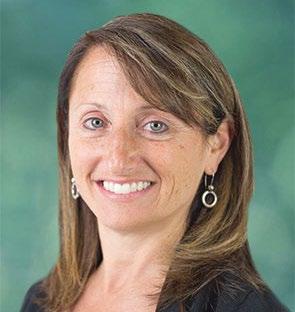
“Employers should also be cautioned, though, that any advantages associated with the improved employee satisfaction and better recruiting will fade if the majority of employers go to a four-day workweek model,” she says.
Another option emerges
Another option has emerged between the standard five-day and four-day workweek: the 9/80 schedule providing every other Friday off.
Shea says the 9/80 schedule allows employees to work full time and maintain full pay and benefits while having an extra day off every other week. It takes place over two weeks rather than one week.
In a 9/80 schedule, employees work nine hours daily, Monday through Thursday, in week one. They work eight hours on Friday, but four are charged to week 1, and four are charged to week 2. They then work nine hours a day the following Monday through Thursday — for a total of 80 hours — and have Friday off.
“In other words, the employee gets a three-day weekend every two weeks,” Shea says.
Shea notes potential risks under the Fair Labor Standards Act for non-exempt employees, as they would technically work more than 40 hours in the first week of the 9/80 schedule.
“So, if the employee is non-exempt, the employee would have to receive overtime pay for the hours worked in excess of 40 hours in a given workweek, even though the employee is working fewer than 40 hours the following week,” she says.
Legal translation
While the jury is out on whether a modified work schedule is appropriate for many industries, it seems
“Americans — and especially lawyers — cling to the notion that the harder and longer you work, the more happiness, success and wealth you will earn,” Burnette says. “The law firms who requested advice envisioned a four-day, 10-hours-per-day workweek for staff. Likely the lawyers are already working 10-hour days five or more days per week.”
For years now, employment attor-
more established that it would not work well across the legal field. Dubberly makes clear that firms are sensitive to the needs of their lawyers, willing to modify schedules and work models when necessary, but that being an attorney is not a part-time gig.
“If you’re in private practice, you’re available 24/7 if you’re a good lawyer,” he says.
Shea points out that litigators are somewhat at the mercy of the court.
“If a case is scheduled for a oneweek trial, counsel could not very well tell the judge, ‘We have to adjourn on Friday because we only work a four-day workweek,’” she says.
Shea believes that attorneys in more advisory or counseling roles could potentially manage a four-day workweek. And Dubberly concedes that staff or in-house counsel might also be able to make the jump. But don’t expect to see lawyers moving to part time anytime soon.
neys have counseled clients regarding alternative work schedules and models, primarily due to circumstances presented by COVID-19. The pandemic and advancing technology have helped create a climate in which many employers have become more accommodating and trusting of their employees. Workfrom-home and hybrid models have allowed business to be conducted even under unprecedented circumstances, but paying full-time compensation for part-time work might be more than employers are willing to do at this point.
“Most employers are not quite sold on the idea yet,” Burnette says. Especially those who employ attorneys.
“Since many clients expect their lawyers to be available for legal advice 24/7, it’s hard for me to envision a scenario where a law firm could legitimately say to those clients, ‘We’re here for you, but only Monday to Thursday,’” Wood says. •
6 May 2023 | NORTH CAROLINA LAWYERS WEEKLY
“Since many clients expect their lawyers to be available for legal advice 24/7, it’s hard for me to envision a scenario where a law firm could legitimately say to those clients, ‘We’re here for you, but only Monday through Thursday.’”
— Stacy K. Wood, Charlotte
Investors Title Legal Team
CAPABLE, COMMITTED, AND INVESTED IN YOUR SUCCESS
• With more than 150 combined years of title experience, our title attorneys and legal support team provide timely underwriting assistance to approved NC real estate attorneys.

• Solution-driven and responsive, our team addresses questions about residential and commercial transactions, helping you provide better service, increase productivity, and mitigate risk.
• Investors Title stays informed about regulatory changes and compliance issues that may affect your legal practice.
• We research, develop, and share best practice solutions for maintaining a secure and compliant real estate office.
• We consistently advocate on behalf of approved attorneys through our work with the Real Estate Lawyers Association of North Carolina (RELANC) and directly with the state Legislature.
• Residential & Commercial Title Insurance

•Commercial Escrow & Disbursement Services
• Trust Account Reconciliation
•§1031 Like-Kind Exchanges
• Investors Title’s in-person and online educational programs are unmatched in terms of quality and relevance.
• We provide thousands of hours of CLE/CPE credit every year to our attorney/ paralegal base.
• Visit invtitle.com/resources/nc for comprehensive resources and to access on-demand content.
800.326.4842 | invtitle.com
INDUSTRY KNOWLEDGE UNDERWRITING EXPERTISE CONTINUING EDUCATION
North Carolina Title Attorneys (left to right): Kevin Joyce, Ryan Wainio, Drew Foley, Kristi Moretz-Icard, Ned Manning, Jimmy Bryan, Marc Garren, and Steve Brown
Murder, he writes
It’s 3 a.m., and while most attorneys are either fast asleep or staring at the ceiling, wishing they were, Steven Epstein is wide awake and in front of his laptop, chipping away at his fourth book and debut novel.
Amid the witching hour, Epstein has found the two things he needs most — time and inspiration — to write about one of his foremost passions: murder.
“I’m not intrigued by murder itself; I’m intrigued by relationships that devolve from very strong, connected relationships of love and affection to the point of hating that person enough to kill them,” Epstein says. “It’s the relationship aspect of … ‘murder is the answer’ that fascinates me.”
His first work of fiction, “All Too Sudden,” is a coupling of murder and Epstein’s other predilection, golf. In “All Too Sudden,” he pens the story of professional golfer Ben Goldstein, who unexpectedly rises to glory before his wife is murdered and his life forever altered.
“The story came to me in a thunderbolt of inspiration right after I finished watching the British Open in 2021,” Epstein says. “The notion came to me: What if someone grabbed all this fame and glory from winning one of the greatest golf tournaments in the world and they became the center of a big murder mystery within days thereafter, and the whole world was watching?”
He’d rather be golfing
Although Epstein calls Goldstein a “very autobiographical protagonist,” from a firsthand perspective, Epstein knows nothing of homicide. The civil litigator and board-certified family law specialist with Poyner Spruill in Raleigh has educated himself on the subject through news accounts and court cases.
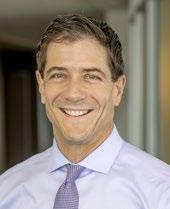
But golf is more personal. In real life, Epstein fancies himself somewhat of a linksman, regularly watching world-class golfers compete in major tournaments — both live and on TV — and occasionally teeing up himself. A student of the game who split his time in high school between the greens and wrestling mats, Epstein says that his storyline could’ve been very different.
“Had I had more talent as a golfer, I’d never have become a lawyer in the first place,” Epstein says. “And even after I became a lawyer, I still had delusions of at least caddying on the PGA Tour someday or finding some way to work in golf broadcasting.”
Those dreams didn’t materialize for Epstein as they did for the protagonist in his novel. But like Epstein’s fictional account of Goldstein and his plight, his reallife story is still being written.
A counselor and a penman
The second of three children born to a schoolteacher and a salesman, Epstein describes his upbringing as unremarkable. The New York native became interested in the law after taking a high school class that saw him conduct mock trials both in the classroom and in an actual courtroom.
“Between that and ‘L.A. Law,’ I
was hooked,” he says.
Following that path, Epstein moved down South and earned his undergraduate and law degrees from the University of North Carolina.
Less by design, perhaps, is the road that led Epstein toward becoming an author. Before he dove into the fantasy world of golf glory and dead wives, he chronicled the real-life case of Michelle Young, a pregnant mother bludgeoned to death in her own home — by her husband — on Raleigh’s Birchleaf Drive.
“[I got into writing] completely by accident,” Epstein says. “There was something about the Jason Young murder case tried in Wake County that I found fascinating. My life had a very similar path as the murder victim’s, having migrated from Long Island to attend college in North Carolina and then deciding to make North Carolina home, and eventually marrying a native North Carolinian in what turned out to be a bad marriage.”
That fascination led to the first of Epstein’s three true-crime thrillers, 2019’s “Murder on Birchleaf Drive: The True Story of the Michelle Young Murder Case.”
Epstein, who knew the judge and several lawyers involved in the case, says he decided to challenge himself after no one else wrote about the killing and trials, which some say had as many twists and turns as any work of fiction ever imagined.
“I had no idea I would even finish the project, let alone get it published,” Epstein says. “I didn’t plan to write a second book, but I had several people at book signings ask me what I was writing next. Wanting to have a better answer
8 May 2023 | NORTH CAROLINA LAWYERS WEEKLY
B y H eat H H amac H er FEATURE
Epstein
than ‘Why do I need to write another book?’ I decided to write a second book.”
“Birchleaf” was followed by “Evil at Lake Seminole” (2020) and “Extreme Punishment: The Chilling True Story of Acclaimed Law Professor Dan Markel’s Murder” (2022).
In “Extreme Punishment,” Epstein tells the story of a decorated Florida State University law professor, Markel, who was shot dead by two contract killers in his Tallahassee garage in 2014. Markel’s ex-wife, who also taught at FSU, was never charged but has been considered a co-conspirator.
On May 3 in Mecklenburg County, Epstein hosted a continuing legal education program to discuss Markel’s murder and its circumstances, including the family law battles — financial and custodial
issues between him and his ex-wife — that likely led to his slaying.
“Those battles ended the day two hitmen executed Dan in cold blood,” Epstein says.
Change of plans
It’s impossible to know whether the grass would have been greener had Epstein become a big-time golf superstar. He believes that he would’ve toiled in obscurity, struggled to make money, and spent most of his life in a bad mood, but the sport is never far from his consciousness. He says that professional golfers regularly appear in his dreams, including the recent vision of him and Jordan Spieth “shooting the bull.”
“I’m so immersed in the world of golf that I think I would’ve enjoyed the heck out of it; I was just never good enough to make it happen,”
he says. “It’s kind of neat that my life is coming full circle now, and I’m able to write about that as if it did happen.”
Though he may never wear the Green Jacket (or make a dime on a round of golf), Epstein has accomplished plenty. He has successfully practiced law for more than three decades and is well on his way to becoming a renowned crime author. But what would motivate a busy attorney to wake up in the middle of the night, forgoing a commodity as precious as sleep, to work on something so far away from what he once envisioned of himself?
“I think part of life is learning how to continually reinvent yourself,” Epstein says. “Writing is that thing for me now, and it might be that thing for me from here to the grave.” •
Zaytoun & Ballew is very pleased to announce the addition of PJ Puryear as Partner with the Firm.
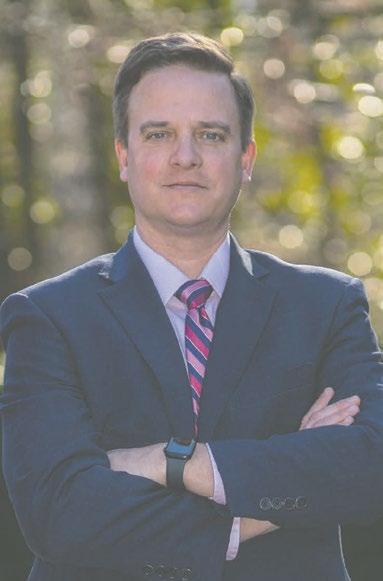
Mr. Puryear brings over a decade of litigation experience to Zaytoun & Ballew, including complex litigation, jury trials and appeals in state and federal courts, as well as robust arbitration and administrative hearing experience. Since joining the firm as Of Counsel in 2022, PJ has continued to serve clients in complex commercial litigation, qui tam, and employment-related needs, while expanding his practice to include matters involving medical negligence, catastrophic personal injury, wrongful death, trucking, and maritime law cases.
We are proud to have PJ join us as a partner. The future is bright at Zaytoun & Ballew. We continue to welcome referrals and associations in the following areas:
• Catastrophic Personal Injury and Medical Negligence
• Civil Rights and Police Misconduct
• Boating and Maritime Injuries
• Representation of Physician and Dental Professionals in Board Licensure, Governmental and Insurer Regulatory Investigations

• Complex Business Litigation and Non-Compete Disputes

• Qui Tam and Other Whistleblower Actions
• Class Action Litigation
NORTH CAROLINA LAWYERS WEEKLY | May 2023 9
FEATURE
zaytounlaw.com (919) 832-6690 3130 Fairhill Drive, Suite 100 Raleigh, North Carolina 27612
Paul J. Puryear, Jr.
QUESTIONS WITH...
Despite the federal government stepping in to save members of recently collapsed banks, including the Silicon Valley and Signature banks, many remain anxious and question if their money is safe in their financial institutions. They wonder, in light of the ripple effect created on major banks and smaller, regional banks alike, what the failures mean to their businesses, the economy, and the government.
Some strategists expect more issues — but not a full-blown crisis — in the banking sector. Jeffrey A. Henson of Robinson Bradshaw in Charlotte recently spoke with Lawyers Weekly about these issues and more.
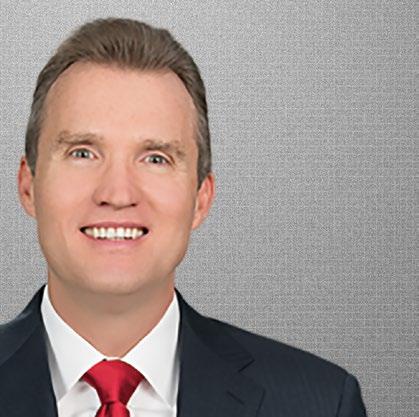
Henson, who chairs his firm’s finance
and capital markets practice group, focuses in areas such as community banking, corporate and commercial, energy, and finance and capital markets. He represents senior leaders and borrowers in connection with domestic and cross-border leveraged and investment-grade financings, mainly concentrating on investment-grade acquisition financings.

Henson graduated from the U.S. Naval Academy in 1985 with a bachelor’s degree in political science before going on to earn his law degree from Duke University School of Law in 1992.
He retired from the Navy after 13 years of service in 1998 after achieving the rank of commander.

1Q. What concerns have you heard from your clients in light of the collapse of Signature Bank and Silicon Valley Bank?
A. Initially, the most pressing concern for our clients was how do they get their money back on deposit with these distressed banks and how can they manage the impact on their short-term liquidity. For small companies, it was a matter of operational survival if they could not access their cash and maintain and utilize their working capital lines of credit.
After the intervention of the Federal Reserve, the concerns expressed by our clients have now focused on the need to diversify their depositary and cash management business among multiple banks.
10 May 2023 | NORTH CAROLINA LAWYERS WEEKLY FEATURE
5
Jeff Henson
B y H eatH H amacHer
Q. What advice are you giving those clients?
A. It is not reasonable to expect larger companies with more than $250,000 in deposits to keep that cash among many banks to remain below the FDIC insurance cap. So, it is important that they carefully select their banking relationships with a mix of both large and regional banks, if possible.
The other key piece of advice is not to relax. The Federal Reserve was able to calm markets with the deployment of its new “Bank Term Funding Program.” But the twin wrecking balls of excessive governmental spending and the borrowing to support it, along with monetary policy that is focused on frantically raising interest rates in an effort to get the inflation ignited by excessive government borrowing and spending under control, is wreaking havoc throughout our financial system. News recently broke that First Republic Bank, which as of March 9, 2023, had total deposits of $173.5 billion, is headed into receivership. So, the fear of contagion remains.
Q. What type of ripple effect do you believe the collapses have had on major U.S. banks and smaller, regional banks?
A. (1) Small and mid-sized banks in an effort to strengthen their finances will tighten lending standards and make fewer loans. This will slow down economic activity in our country.
(2) Another area of great concern is commercial real estate. Over the next five years, more than $2.5 trillion in commercial real estate debt will mature, and many of these borrowers will look to refinance that debt in a higher interest rate environment. With the valuations of many office and retail property falling since the pandemic, it is possible that a sizable number of these borrowers will be unable to refinance this debt. The recent stress in the banking system among regional banks will make this even more difficult. About 80 percent of all bank loans for commercial properties come from regional banks.
(3) Until interest rates are normalized and inflation is under control, all banks will feel some level of stress to incentivize depositors to not move their deposits. For years, in an almost zero rate environment, banks have only paid nominal interest on deposits. Now, depositors with just the click of their mobile phone can move their deposits to a money market fund paying almost 5 percent in interest. Banks can increase the interest they pay on deposits, but that will reduce their profits and put further pressure on their stock price.
Q. Is there such a thing as a bank being too big to fail?
A. I hope that we do not find out! Silicon Valley Bank and Signature Bank were the second and third largest bank failures in U.S. history, with each bank having nominal assets of over $100 billion respectively at the time of their failure. One thing is clear:
These bank collapses will lead to more deposits leaving small and mid-sized banks and being moved to our nation’s largest banks, resulting in the biggest banks becoming even bigger.
Q. The current administration has indicated that it would ask Congress and banking regulators to “strengthen the rules for banks” to reduce the risk of bank failure. What might this look like?
A. It remains to be seen as the post-mortems are still being written regarding Silicon Valley Bank and Signature Bank. But we can count on two broad areas of focus: (1) our largest regional banks will be subject to higher capital and liquidity requirements much like our nation’s largest banks, and (2) the FDIC will be far more assertive in its supervisory duties of banks in the future. •
INSURANCE COVERAGE ASSOCIATE – RALEIGH,

NC
Job Description: Phelps Dunbar is seeking an attorney for the Insurance practice group in its Raleigh, NC office. The candidate must have 4-6 years of litigation experience with insurance coverage experience highly preferred.
Our success is based on the expertise of our lawyers. As Phelps Dunbar expands regionally, we look to hire bright, energetic, and motivated attorneys with excellent academic credentials, legal abilities, and skills. The Firm prides itself on the legal expertise and personal qualities of our attorneys who practice at the Firm. Phelps Dunbar offers attorneys exceptional opportunities and resources to help them learn, grow, and develop in the practice of law. As our attorneys progress throughout their career, we recognize the importance of maintaining our standards of excellence through mentoring, training, and team building.
Job Requirements: Must have strong writing and research skills with excellent academic credentials (top 25% required).
For more information email sophia.hotard@phelps.com
NORTH CAROLINA LAWYERS WEEKLY | May 2023 11
FEATURE 2 3
5 4
Federal court reverses employee’s sex bias verdict
Adistrict court clearly erred when it assumed that an inference of sex discrimination necessarily followed when an employee proved a prima facie case of disparate treatment and their employer’s explanation wasn’t credible, the 4th U.S. Circuit Court of Appeals has held.
While the district court was entitled to substantial deference, the key evidence showed the employee was fired by a woman and replaced by a woman and there was no suggestion that gender “was even remotely a factor in [the defendant’s] decision,” Fourth Circuit Judge Paul V. Niemeyer pointed out.
“On this record, while we conclude that [the employee] made a persuasive case that firing her was probably an unfair business decision, she nonetheless failed to present evidence sufficient for a factfinder to conclude that it was the product of discrimination based on sex,” Neimeyer wrote. “Accordingly, we reverse.”
Judges Julius N. Richardson and U.S. District Judge Michael S. Nachmanoff of the Eastern District of Virginia, sitting by designation, joined Neimeyer’s decision in Balderson v. Lincare Inc.
‘Cloned’ notes
Florida-based Lincare, a supplier of respiratory-therapy products and services, sells an in-home mechanical ventilator that physicians can order for patients. The company’s sales representatives work with physicians, offering guidance on the necessary information for their patients to get coverage for the devices from their insurers or Medicare.
All Lincare employees were required
to comply with the company’s Corporate Health Care Law Compliance Program and Code of Conduct. Examples of prohibited conduct included “‘[m]isrepresenting a diagnosis for the patient to justify the services or equipment furnished,’ and ‘[o]ffering or giving valuable property, equipment, services, gifts or other benefits to a person in exchange for the referral of patients to the Company.’”
Chandra Balderson was hired as a sales representative in 2015, becoming a top-10 performer and earning significant commissions. She was responsible for reviewing sales orders, partly to ensure that doctors’ progress notes contained all information necessary to obtain insurance coverage. Her manager, Chad Brady, could review sales orders, but he had no sales responsibility and earned no commissions.
During a 2019 compliance audit, Lincare found signed doctor’s notes in 19 ventilator orders that were nearly identical. They identified different patients but “the body of each note appeared to be ‘cloned’ or a ‘template,’” of why the ventilator was medically necessary, per the opinion.
Lincare’s Chief Compliance Officer Jennifer Pedersen investigated and found that Balderson faxed an unsigned, handwritten template note to a doctor with instructions to use an attached statement to fill in the notes. The statement essentially matched the cloned notes.

The doctor signed the template, added the patient’s identifying information, revised the order form with Balderson’s statement and faxed them back with the patient’s recent office records.
Realizing that diagnostic codes on some orders didn’t match patient
12 May 2023 | NORTH CAROLINA LAWYERS WEEKLY
B y N ick H ursto N
COURTS Depositphotos.com
records, Pedersen concluded that Balderson violated Lincare’s compliance program by suggesting that doctors sign template progress notes that contradicted their diagnoses.
Termination
Balderson admitted using the template to make it easier for doctors to get coverage; she turned over 17 more signed doctor’s notes, each containing the same generic language.
Pedersen also learned that Brady had provided “coaching” or “leading” information to doctors by sending three examples of statements sufficient to support a ventilator order. Brady also provided free equipment to a patient who lost theirs in a fire.
During a meeting that included Brady, Lincare’s corporate counsel and health care services manager, Pedersen informed Balderson that she was fired for “leading” doctors. Lincare eventually hired a woman to
replace Balderson.
Pedersen gave Brady a “final written warning” for his conduct because his violation “did not rise to the magnitude” of Balderson’s as he only provided guidance about what information doctors should include.
Balderson sued Lincare in a West Virginia state court for statutory violations. After the case was removed
to federal court, Balderson added a claim under West Virginia’s Human Rights Act for discrimination on the basis of sex.
The district court dismissed all of Balderson’s claims except discrimination which proceeded to a bench trial.
See Page 14

NORTH CAROLINA LAWYERS WEEKLY | May 2023 13 COURTS
"There will '[c]ertainly … be instances where, although the plaintiff has established a prima facie case and set forth sufficient evidence to reject the defendant’s explanation, no rational factfinder could conclude that the action was discriminatory.'"
4th U.S. Circuit Judge Paul V. Niemeyer
Local Solutions. Global Reach. Local Solutions. Global Reach.
COURTS
Continued From Page 13
Entitled inference
Pedersen explained at trial why Balderson’s conduct was a serious infraction, saying Medicare cautions that using templates to support reimbursement “can ‘put a physician’s practice at risk’ and can result in ‘contradictory information’ being introduced into a patient’s medical record.”
Balderson testified that she believed Lincare discriminated against her because she and Brady “were doing the same thing.”
The district court said that was enough to establish a prima facie case and that the Lincare’s reason for firing Balderson was “simply not credible.”
Finally, and most critically, the district court found that pretext was demonstrated by Brady’s lighter punishment despite his conduct being “at least comparable” to Balderson’s.
The district court granted judgment
to Balderson and awarded her compensatory and punitive damages.
Reversed
The West Virginia Human Rights Act’s prohibition of employment discrimination is governed by the same analytical framework and structures developed under Title VII of the Civil Rights Act, including its burden-shifting framework for analyzing pretext claims, Niemeyer explained.
He noted that the district court failed to follow 2000’s Reeves v. Sanderson Plumbing Products, Inc. ruling from the U.S. Supreme Court.
The Reeves court specifically addressed “whether a plaintiff’s prima facie case of discrimination …, combined with sufficient evidence for a reasonable factfinder to reject the employer’s nondiscriminatory explanation for its decision, is adequate to sustain a finding of liability for intentional discrimination,” Niemeyer said. “The Court’s conclusion

was that such a showing may be sufficient but that it is not necessarily so – it depends on the circumstances.”
Rather, the Reeves court said “there will ‘[c]ertainly … be instances where, although the plaintiff has established a prima facie case and set forth sufficient evidence to reject the defendant’s explanation, no rational factfinder could conclude that the action was discriminatory.’”
Niemeyer then looked to the instant case.
“The district court failed to recognize this possibility and to address it in light of the circumstances presented,” he said. “Had it done so, it would have been compelled to conclude that Balderson’s case was one of the type recognized in Reeves, in which a prima facie showing of a similar comparator, combined with reasons to doubt the employer’s explanations, is not sufficient to support a finding on the ‘ultimate’ issue — the employer’s discriminatory intent.” •
14 May 2023 | NORTH CAROLINA LAWYERS WEEKLY
Has your client identified fraud against the government? Partner with us. ★ ★★ ★★ “Bill Nettles is extremely effective as an advocate for his clients. You will be glad you brought your qui tam case to Carolina Whistleblower Attorneys.” Bill Nettles Former U.S. Attorney who leads our formidable team. We’re led by a former U.S. attorney who helped lead the nation in whistleblower recoveries. ✓ Experience We have the resources to invest in cases and maximize value. ✓ Resources You can be as involved in the case as you want to be. ✓ Flexibility carolinawhistleblower.com • 1-866-533-6743




Your defense is our focus. Lawyers Professional Liability In your world – details matter. At First Indemnity we understand that lawyers need a reliable partner in the insurance industry to provide the best possible defense against claims. Our Lawyers Professional Liability Program is a proven leader in national specialty insurance. • Lawyer ’s Malpractice • Cyber Liability • Umbrella Coverage • Surety Bonds • Copyright, Patent & Trademarks See Video “Our business is to underwrite and bind PL policies for lawyers in ” carriers prime with partnership – Andrew Biggio, CEO First Indemnity email: fax: 781. 595.2279 2508 581. 781. Indemnity.net www.First Boston • New York • Tampa • Chicago • Dallas • Los Angeles • Philadelphia
BAR PASSERS
The Board of Law Examiners of the State of North Carolina
February 2023 North Carolina Bar Exam
Law School Statistics Report
16 May 2023 | NORTH CAROLINA LAWYERS WEEKLY
General Statistics Successful Unsuccessful Total Pass Rate Examined First Time 137 79 216 63.43% Examined More Than Once 58 142 200 29.00% Total Taking Examination 195 221 416 46.88% North Carolina Law Schools Campbell University Attempts % Pass Total Pass Fail First Timers 75.00% 8 6 2 Repeaters 45.95% 37 17 20 Total 51.11% 45 23 22 Charlotte School of Law Attempts % Pass Total Pass Fail First Timers 0.00% 0 0 0 Repeaters 0.00% 8 0 8 Total 0.00% 8 0 8 Duke University Attempts % Pass Total Pass Fail First Timers 80.00% 5 4 1 Repeaters 100.00% 1 1 0 Total 83.33% 6 5 1 Elon University Attempts % Pass Total Pass Fail First Timers 60.44% 91 55 36 Repeaters 0.00% 16 0 16 Total 51.40% 107 55 52 North Carolina Attempts % Pass Total Pass Fail Central University First Timers 44.44% 9 4 5 Repeaters 36.59% 41 15 26 Total 38.00% 50 19 31 University of Attempts % Pass Total Pass Fail North Carolina First Timers 40.00% 5 2 3 Repeaters 50.00% 10 5 5 Total 46.67% 15 7 8 Wake Forest University Attempts % Pass Total Pass Fail First Timers 100.00% 5 5 0 Repeaters 41.67% 12 5 7 Total 58.82% 17 10 7 North Carolina Attempts % Pass Total Pass Fail Schools Total First Timers 61.79% 123 76 47 Repeaters 34.40% 125 43 82 Total 47.98% 248 119 129 Out-of-State Total First Timers 65.59% 93 61 32 Law Schools Repeaters 20.00% 75 15 60 Total 45.24% 168 76 92 TOTAL APPLICANTS Attempts % Pass Total Pass Fail First Timers 63.43% 216 137 79 Repeaters 29.00% 200 58 142 Total 46.88% 416 195 221
The following names were provided by the North Carolina Board of Law Examiners to recognize those who passed the February 2023 bar exam. Applicants who were successful on the exam but have not yet taken or passed the MPRE are not included on the BLE's list
Greensboro NC
Oviedo Elvira Charlotte NC
Pace Carson Winston Salem NC
Parish Gabrielle China Grove NC
Pinch Lizza Charlotte NC
Pittman John Rockingham NC
Prusiensky Justin Charlotte NC
Purks Kory Cary NC
Rabil Holly Raleigh NC
Ramfos Paraskevie Greensboro NC
Rasmussen Jack Chesapeake VA
Reynolds Sydney Wilmington NC
Roberts Matthew Summerfield NC
Russell Colin Raleigh NC
Sanchez Wright Alyssa Hickory NC
Sanders Michael Fuquay Varina NC
Saxon Jada Raleigh, NC NC
Shah Harsh Matthews NC
Sharp Kierston Kernersville NC
Sharpe James Greensboro NC
Siderovski Karen Winston-Salem NC
Smith Ajai Durham NC
Smith Destiny Durham NC
Squires Taylor Burlington NC
Stacy Morgan Terrell NC
Steber John Sarasota FL
Stephenson Andrew Willow Spring NC
Sulman Faisal High Point NC
Theodros Rahwa Charlotte NC
Thomas Steven Virginia Beach VA
Thompson Tierra Waxhaw NC
Tillman Julia Tampa FL
Tilson Connor Eldersburg MD
Tompkins Morgan Randleman NC
Twing Hayley Sylva NC
Vick Cameron Albemarle NC
von Henner Austin Arden NC
Wagner Amanda Raleigh NC
Walker Mary High Point NC
Weigle Jennifer Reidsville NC
Westbrook Erika Durham NC
Wilder Ehren Lexington SC
Williams Cameron Belmont NC
Wilson Elise Wilmington NC
Wright Karsen Greensboro NC
Ybarra Isaac Kannapolis NC
NORTH CAROLINA LAWYERS WEEKLY | May 2023 17 BAR PASSERS Last Name First City State Albertson Austin Atlanta GA Amsbaugh Anna Raleigh NC Andrews Heather Raleigh NC Arroyo Longoria Dara Greensboro NC Balaj Talida Cayce SC Bartholomew Logan Sanford FL Beale Elliott Charlotte NC Beck Michael Winston Salem NC Belisle David Raleigh NC Bidwell Patrick Greensboro NC Brokaw Victoria Charlotte NC Brunner Theresa Pineville NC Buenrostro Kathia Raleigh NC Burke Allison Winston-Salem NC Busey Jacob Charlotte NC Carver Christine Indian Land SC Chapman Trisha Las Vegas NV Chavonne Tyler Fayetteville NC Ciaccio Molly Greensboro NC Clemmons Caison Bolivia NC Combs Breanna Mebane NC Cooper Jeanna Greensboro NC Coposky Raina Raleigh NC Cotton Korree Charlotte NC Couture Amanda Kernersville NC Curcio Ellen Charlotte NC Davis Jason Jamestown NC Day Erica Cramerton NC DiMaggio David Morganton NC Donaldson Scott wilmington NC Ewing Justin Durham NC Farris Lauren Raleigh NC Feinstein Avrohom Raleigh NC Floyd Jake Charlotte NC Ford Diane Cary NC Frank Mary-Bailey Durham NC Garcia Jennifer Raleigh NC Gelband Hannah Chapel Hill NC Gibeley Michael Greensboro NC Godwin Shelby Rocky Mount NC Gomez Tamara Charlotte NC Gray Christopher Tuckasegee NC Habit Brianne Raleigh NC Hagee Jeremy Charlotte NC Hager Cynthia Greensboro NC Harvill Allison Cary NC Healy Maeve Raleigh NC Heckman Lillian Greensboro NC Hill Madeline Raleigh NC Hill Alexandria Raleigh NC Hoffman Stephanie Fort Myers FL Hord Abby Lincolnton NC Horde Rory Charlotte NC Hudgins Jeffrey Raleigh NC Hughes Logan Huntersville NC Johnson Alexis Lynchburg VA Jones Tocarra Durham NC Jones Darrien Charlotte NC Joyner Letreshia Pleasant Garden NC Kirkland Virginia Raleigh NC Kohatsu Aaron Fairview NC Leonard Christine Wake Forest NC Libby Madison Greensboro NC Lockhart Jordan Raleigh NC Lybbert Dawson Winston-Salem NC Lyons Whitley Linden NC MacRae James Fayetteville NC Maggio Emily Raleigh NC Last Name First City State Mason William Greensboro NC McHale Kody Winston Salem NC McKinion Lachlan Wake Forest NC McLean Leah Greensboro NC Mebane-Williams Matrice Burlington NC Mendoza Leann Nicole Fayetteville NC Merlin Katherine Asheville NC Messner Frederick Washington DC Meyer Alexandra Winston-Salem NC Minikus Matthew Raleigh NC Montgomery Jeb Asheville NC Moody John Randleman NC Morris Edgar Black Mountain NC Morris Michaela Whitsett NC Nelson Todd Cashiers NC Noble Jillian Wake Forest NC Nykamp Daniel Browns Summit NC Oakley Whitney Seneca SC ODay Kathleen Davidson NC Offerman Kyle Clayton NC Opitz Tara Charlotte NC O'Reilly Kaitlin
Administrative
SSDI – VA Disability Ruling –SSA Rules vs. Court Precedent –Residual Functional Capacity
In the context of a disability claim, this court’s precedent would require a Social Security Administration administrative law judge to accord substantial weight to a disability determination by the Veterans Administration unless the record before the ALJ clearly showed some lesser weight was appropriate. However, new SSA rules do not require the ALJ to even consider the VA’s disability determination, though the ALJ is required to consider the evidence underlying the VA’s determination. Since the Social Security Act does not address other agencies’ disability determinations, and since Congress has granted the SSA Commissioner exceptionally broad rule-making authority, we agree with the district court that the new SSA rules supersede our precedent.

While we agree with the district court’s ruling as to the new SSA rules, we nevertheless vacate the order upholding the
denial of benefits and remand for reconsideration of medical evidence that is not mentioned in the ALJ’s decision.
After the VA declared her 100 percent disabled, plaintiff sought disability benefits from the SSA based on depression, anxiety and post-traumatic stress disorder related to a sexual assault she suffered while she was in the U.S. Army in the late 1980’s/early 1990’s. The SSA denied her claim, and the district court affirmed.
We apply the standard from Nat’l Cable & Telecomms. Ass’n v. Brand X Internet Servs., 545 U.S. 967 (2005), to determine whether our prior judicial construction of the Social Security Act trumps the SSA’s rules. We must assess whether our precedents “hold[] that [their] construction follows from the unambiguous terms of the [Social Security Act] and thus leaves no room for agency discretion.” Quite clearly, our precedents do not so hold. And that makes sense, in that the Act itself does not address how or even if the SSA must deal with another agency’s disability determination.
Next, then, we assess under the Brand X standard whether the new SSA rules are
“otherwise entitled to Chevron deference.” See Brand X, 545 U.S. at 982 (referring to Chevron, U.S.A., Inc. v. Nat. Res. Def. Council, Inc., 467 U.S. 837 (1984)). Where, as here, “the statute is silent or ambiguous with respect to the specific issue,” Chevron identifies “the question for the court” as being “whether the agency’s answer is based on a permissible construction of the statute.”
The new rules are a type that Congress empowered the SSA Commissioner to adopt, they are not manifestly contrary to any provision of the Social Security Act, and they do not strike us as arbitrary and capricious in any way. Notably, it matters not that the new rules constitute a reversal of prior SSA directives, for as Brand X explains, “[a]gency inconsistency is not a basis for declining to analyze the agency’s interpretation under the Chevron framework.” So long as “the agency adequately explains the reasons for a reversal of policy” — as the SSA has done here — “change is not invalidating, since the whole point of Chevron is to leave the discretion provided by the ambiguities of a statute with the implementing agency.”
We conclude that, under Brand X, our precedents do not trump the new SSA rules. The new rules supersede our precedents and thus apply to claims filed on or after March 27, 2017. We also must agree that the SSA ALJ applied the correct legal standards and committed no error in adhering to the new rules and declining to accord substantial weight to the VA’s determination that plaintiff is 100 percent disabled.
However, the record includes medical evidence that the ALJ either ignored or discounted for reasons that were not explained. Plaintiff’s medical records reflect that “her menstrual cycle continues to be a trigger for her”; that her “[f] lashbacks [have become] more intense and more frequent, especially during [menstruation]”; and that menstruation “is alarming to her,” in that she “associate[s] the si[ght] of blood with [her] rape that
18 May 2023 | NORTH CAROLINA LAWYERS WEEKLY OPINIONS
To view the full list of opinion digests, please visit www.nclawyersweekly.com.
OPINIONS
Continued From Page 19
Dissent
(Morgan, J.) The Court of Appeals itself, in its now-erased decision, urged this court to provide guidance with regard to the application of the Equal Protection Clause of the N.C. Constitution as compared to the Equal Protection Clause of the U.S. Constitution. The parties seek guidance on the effect of the N.C. Constitution’s Fruits of Labor and Equal Protection Clauses on our state’s at-will employment doctrine. The majority neglects this court’s obligation to answer necessary constitutional questions through the interpretation of state law.
The majority even ignores this court’s established practice of concluding a per curiam opinion with a definitive declaration of the case’s outcome, such as “affirmed” or “reversed.” It appears that the majority has initiated a new practice of refraining from such a plain announcement of the final result of a case in order to be consistent with this court’s new practice of unpublishing a Court of Appeals opinion on this court’s own volition. With this approach, there would be no requirement for this court to declare the conclusive result of a per curiam opinion— including one in which discretionary review was improvidently allowed— because this court would no longer recognize the lower appellate court’s opinion to exist, due to this court’s unilateral unpublication of the Court of Appeals opinion.
This court should definitively decide the critical constitutional issues which have been presented to us, especially those which are impacted by the North Carolina Constitution, since discretionary review by this court is essential here to resolve substantial questions of law. Furthermore, since the majority has deemed discretionary review to be improvidently allowed, then it should follow institutionalized precedent to disclose, at the least, the numerical breakdown of the justices here who favored affirmance, reversal, or some other reviewing disposition of the Court of Appeals, instead of adeptly utilizing the concepts of discretionary review improvidently allowed and unpublication of the
Court of Appeals opinion to craftily shield their votes.
Dissent
(Earls, J.) The court for the first time in its history, when sitting as a seven-member court, is, without coherent explanation, ruling that the opinion issued by the Court of Appeals in this case has no “precedential value.” As the opinion was published by the Court of Appeals, under our Rules of Appellate Procedure, it should be binding precedent unless reversed by this court. It is unwise for the court to hand itself this new power without even publishing an amendment to the Rules of Appellate Procedure to establish clear and fair guidelines for taking such action.
The majority has shirked its responsibility to be the final arbiter of the N.C. Constitution.
The majority’s use of “discretionary review improvidently allowed” and its designation of the Court of Appeals opinion as without precedential valued both subvert the rule of law by creating uncertainty.
Mole’ v. City of Durham (Lawyers Weekly No. 010-007-23, 38 pp.) (Per Curiam) (Richard Dietz, J., joined by Philip Berger, J., concurring) (Michael Morgan, J., joined by Anita Earls, J., dissenting) (Anita Earls, J., joined by Michael Morgan, J., dissenting) On discretionary review from the Court of Appeals. N.C. S. Ct.
Corporate
Derivative Action – Demand Letter – 90-Day Period – Tort/Negligence –Breach of Fiduciary Duty
Even though more than 90 days passed between plaintiff’s delivery of its demand letter to the nominal defendant-limited liability company and the hearing on defendants’ motion to dismiss, this does not excuse plaintiff’s failure to wait the 90 days required by G.S. § 57D-8-01(a)(2) before filing suit. Furthermore, plaintiff’s attachment of its proposed complaint to the demand letter does not make up for the lack of specificity in the demand letter.
Defendants’ motion to dismiss is granted in part and denied in part.
Pursuant to G.S. § 57D-8-01(a)(2), a member of a limited liability company may bring a derivative action on the company’s behalf if, among other things, the member made a written demand on the LLC to take suitable action and 90 days have expired from the date the demand was made or irreparable injury to the LLC would result by waiting for the expiration of the 90-day period.
Here, plaintiff filed its complaint just ten days after its initial demand letter and only one day after its amended demand letter.
Even if the defendant-majority member’s (defendant’s) “imminent” plans – first to redeem plaintiff’s ownership interest and then to sell the LLC – would satisfy the “irreparable injury” exception to the statute’s 90-day requirement, plaintiff conceded in its own complaint that, after receipt of its amended demand letter, defendant “temporarily” withdrew his attempt to exercise his redemption option. Accordingly, it cannot be said that the sale of the LLC was imminent.
It is true that more than 90 days have now passed since the demand letters were sent, and the LLC has failed to initiate legal action against defendant. However, the court cannot accept plaintiff’s “no harm, no foul” argument. The 90-day requirement reflects a legislative determination that a company should be given 90 days in which to fully investigate a demand that the company file suit against an alleged wrongdoer. In almost every case, more than 90 days will have elapsed between the date of a demand letter and the date the defendant’s motion to dismiss the derivative claims on timeliness grounds is heard by the court. As such, the rule would be honored more in its breach than in its observance.
Moreover, the demand letter seeks payment of distributions and an increase in the price offered for redemption of plaintiff’s interest. The letter thus seeks to protect not the interests of the LLC, but those of plaintiff. This is not a proper demand within the meaning of the statute.
Plaintiff has failed to cite any North Carolina case law standing for the proposition that attaching a draft complaint to a demand letter is a valid substitute for making a proper demand for suitable action by the company in the letter itself.
The court grants the motion to dismiss
20 May 2023 | NORTH CAROLINA LAWYERS WEEKLY
plaintiff’s derivative claims.
Generally, an LLC member may not bring an individual action to recover what they consider their share of damages suffered by the LLC. However, a substantial portion of plaintiff’s allegations concern defendant’s acts in (1) thwarting plaintiff’s ability to receive distributions in proportion to its ownership interest in the LLC and (2) refusing to comply with certain provisions of the operating agreement providing safeguards to plaintiff in connection with defendant’s ability to purchase plaintiff’s ownership interest in the LLC. These allegations fall within the “special injury” exception to the general rule. Barger v. McCoy Hillard & Parks, 346 N.C. 650 (1997). Plaintiff has standing to bring its individual claims.
The LLC’s operating agreement makes it clear that defendant owed no fiduciary duties in his role as manager.
However, the operating agreement does not eliminate the fiduciary duty that a controlling majority member would otherwise owe to a minority member under Vanguard Pai Lung, LLC v. Moody, 2019 NCBC LEXIS 39, at *17 (N.C. Super. Ct. June 19, 2019). The complaint alleges a number of ways in which defendant has used his position as the majority member to assert absolute control over the LLC.
Moreover, the complaint asserts that defendant breached his fiduciary duty to plaintiff as a minority member in several respects. For example, plaintiff alleges that defendant (1) improperly withheld distributions owed to plaintiff; (2) refused to provide plaintiff with information regarding his appraisal of the value of its units in connection with his decision to exercise his redemption option; and (3) ignored a number of provisions in the LLC’s operating agreement at the expense of plaintiff. Plaintiff has stated a breach of fiduciary duty claim against defendant in his capacity as majority member.
Motion granted in part, denied in part.
Cumberland County Hospital System, Inc. v. Woodcock (Lawyers Weekly No. 020022-23, 23 pp.) (Mark Davis, J.) Nathan Huff and Anderson Shacklefort for plaintiff; Douglas Harris and Krispen Culbertson for defendants. 2023 NCBC 22
Criminal Practice
Jury & Jurors – Batson Challenge – Prima Facie Level – Proffered Reasons
Once the trial court ruled that defendant had failed to make out a prima facie challenge under Batson v. Kentucky, 476 U.S. 79 (1986), the Batson inquiry should have concluded. Accordingly, we do not consider the state’s post facto reply to the trial court’s request for race-neutral explanations for the state’s peremptory challenges of Black jurors.
We affirm the Court of Appeals’ decision, which upheld the trial court’s determination that there was no Batson error in this case.
The record shows that both defendant and the victim, as well as at least one key witness, were Black; the state exercised two peremptory strikes during selection of the initial 12 jurors, one on a white prospective juror and one on a Black prospective juror; and the state exercised two peremptory strikes during alternate juror selection, both on Black prospective jurors.
Defendant argues that the state’s exercise of three out of four peremptory strikes against Black prospective jurors is sufficient to establish a prima facie case of purposeful discrimination. Specifically, defendant asserts that our opinion in State v. Barden, 356 N.C. 316, 572 S.E.2d 108 (2002), can be read to mean that a 71.4 percent strike rate—the corollary to a 28.6 percent acceptance rate—establishes a prima facie case, and that the 75 percent strike ratio in this case therefore compels reversal. Defendant’s argument is without merit.
Reliance on a single mathematical ratio, standing alone in a cold record, is insufficient here. Not only would such an approach result in this court splitting hairs, but it would also demand that we abandon all pretense of deference to the trial judge, who, with his experience in voir dire, is in by far the best position to make the Batson prima facie case determination.
Defendant has provided no case law establishing that a trial court is required to enter extensive written factual findings in support of its determination that a defendant has failed to establish a prima facie case, and we decline to impose such a requirement. Affirmed.
Dissent
(Earls, J.) Since the prosecutor gave his reasons for peremptorily challenging Black jurors, we should not ignore them. Here, the prosecutor cited a juror’s involvement in Black Lives Matter.
The prosecutor’s reliance on the juror’s Black Lives Matter involvement appears to have had minimal relevance to the circumstances of this case. But the trial court made no findings regarding the relevance of this stated reason to the state’s case. I would hold that the requirement that defendant demonstrate a prima facie case of discrimination was rendered moot when the trial court required the prosecution to explain its reasons for excluding the three Black jurors. At that point, the trial court needed to examine all of the evidence and the circumstances to assess whether the prosecutor’s strikes were motivated in part by impermissible race-based considerations.
I would remand to the trial court to make proper findings regarding whether the prosecutor’s use of three of four peremptory challenges to excuse Black prospective jurors was in violation of Batson based on all of the evidence, including the prosecutor’s proffered justifications.
State v. Campbell (Lawyers Weekly No. 010-002-23, 26 pp.) (Philip Berger, J.) (Anita Earls, J., dissenting) On appeal from the Court of Appeals. Nicholas Sanders for the state; Olivia Warren for defendant; Erika Wilson, Tiffany Wright, Cassandra Stubbs, Elizabeth Cruikshank, Sarah Sloan, Daniel Dubens, and Easha Anand for amici curiae. N.C. S. Ct.
Criminal Practice
Jury & Jurors – Batson Review – White Comparators – Racism Susceptibility –
The trial court did not clearly err in determining that the state did not improperly use its peremptory strikes against Black jurors. The white jurors who gave similar answers and who were not struck were more pro-death penalty and appeared less likely to improperly sympathize with the defendant and/or to give
See Page 22
NORTH CAROLINA LAWYERS WEEKLY | May 2023 21 OPINIONS
more credibility to the mental health providers on whom defendant relied at trial.
We affirm the trial court’s determination that there was no violation of Batson v. Kentucky, 476 U.S. 79 (1986).
Even though the Black defendant’s victim was white, the trial court could conclude that this case was not susceptible to racism because there was no evidence that defendant’s race, the victim’s race, or the witnesses’ races were “in any way significant before or during the trial.” Additionally, the trial court found the state did not ask questions or make statements that support a finding of discrimination. Moreover, the victim in the state’s Rule 404(b) evidence was Black.
The trial court declined to adopt defendant’s suggested “single factor approach” to compare the prospective jurors because that approach fails to consider each juror’s characteristics “as a totality.” Instead, the trial court adopted the state’s “whole juror” approach in its comparisons. The trial court also found that, even if the juror comparisons supported a finding of discrimination, the totality of the remaining circumstances outweighed the probative value of these comparisons. After reviewing the entire evidence, we agree that the evidence supports the trial court’s findings of fact.
Dissent
(Earls, J.) The trial court’s conclusion that this case was not susceptible to racial discrimination was clearly erroneous. Both this court and the U.S. Supreme Court have recognized that a case may be susceptible to racial discrimination when the defendant is black and the victim is white.
The trial court also erred in finding fault with a Michigan State University study (1) for employing “unqualified” recent law school graduates to conduct the study, despite the fact that the U.S. Supreme Court has cited studies on racial disparities in jury strikes in which law students were research assistants; (2) because it was based on “cold trial transcripts,” disregarding the fact that all appellate review is conducted in this manner; and (3) because the prosecutors in the study were not involved in this case, although the U.S. Supreme Court has
explained that such historical evidence can reveal the culture of a prosecutor’s office.
The state’s purported reasons for striking the three Black jurors in question fall into four categories: (1) death penalty reservations; (2) mental health connections; (3) substance abuse connections; and (4) criminal record. However, these reasons also applied to non-Black prospective jurors that the state passed.
Moreover, instead of focusing on the similarities between the Black stricken prospective jurors and the non-Black seated jurors, the trial court chose to focus on their differences. In doing so, it applied “the State’s whole juror approach” and disregarded more than 15 years of U.S. Supreme Court precedent.
State v. Hobbs (Lawyers Weekly No. 010001-23, 44 pp.) (Paul Newby, C.J.) (Anita Earls, J., joined by Michael Morgan, J., dissenting) (Philip Berger & Richard Dietz, JJ., not participating) Appealed from Cumberland County Superior Court. Jonathan Babb and Zachary Dunn for the state; Sterling Rozear for defendant; Elizabeth Simpson and Joseph Blocher for amicus curiae. N.C. S. Ct.
Labor & Employment
Contract – Restrictive Covenants – Overbroad – Misappropriation of Trade Secrets
In the context of a covenant not to compete, legitimate business interests include protecting the goodwill that arises from a former employee’s contacts with customers and safeguarding the confidential information to which the former employee had access. Here however, the covenant between plaintiff and defendant Gibson –plaintiff’s former employee – is not sufficiently tailored to such interests. The non-compete clause broadly purports to prohibit Gibson from “directly or indirectly engaging in or having an ownership interest in or participating in the financing, operation, management or control of any business that engages in a Restricted Business in a Restricted Territory.” This language would prohibit Gibson from working as a line cook in the cafeteria at IBM, Oracle or SAP.
This is unquestionably overbroad.
The court denies defendants’ motion to dismiss plaintiff’s claim that Gibson has breached the nondisclosure provision of his employment agreement. Otherwise, the motion is granted. Plaintiff’s motion for a preliminary injunction is denied.
Plaintiff provides its customers with enterprise asset management software. Defendant Gibson signed an employment agreement and worked for plaintiff. Gibson voluntarily resigned and went to work for defendant Prospecta Software, which provides a platform for data management. Plaintiff alleges that Gibson breached his employment agreement.
In addition to the types of work it prohibits Gibson from performing, the non-compete covenant is overbroad in other respects. It attempts to restrict Gibson from accepting any type of position with any business that is related or connected to a business that creates, sells, or services asset management products or services among its other data management products or services. The result is manifestly overbroad.
Moreover, the restricted territory covers a list that starts with “the entire world” and ends with Wake County. The complaint does not give the court enough information to evaluate the reasonableness of a worldwide restriction. While the geographical restrictions are presented as a list, they are joined by the conjunctive “and,” thus preventing them from being distinctly separable. Consequently, the court cannot “blue pencil” the geographical restrictions.
The court also declines plaintiffs’ invitation to excise the word “indirectly” from the covenant. The structure of the provision does not clearly establish that the drafter intended for the words in this modifying phrase to be used alternatively.
The non-compete provision is unenforceable as a matter of law.
Plaintiff also overreached in its customer non-solicitation provision. The restriction covers any customer to which the company sold any product or performed any services within two years prior to Gibson’s resignation date without regard to whether Gibson himself had any contact with, or even knowledge of, the customer.
The non-solicitation provision, as phrased,
22 May 2023 | NORTH CAROLINA LAWYERS WEEKLY
OPINIONS
From Page 21
Continued
would prohibit Gibson from soliciting business from plaintiff’s prospective customers that Gibson has never met, in countries Gibson has never visited (virtually or otherwise), for products and services Gibson has never handled. And, because it contains a “look back” provision to include any customer plaintiff solicited or attempted to solicit for any product or service within two years prior to Gibson’s resignation, the time restriction is effectively three years.
The non-solicitation provision is far too expansive to be enforceable.
With respect to the agreement’s nondisclosure provision, plaintiff has alleged a valid contract and “upon information and belief” that defendants have used and continue to use plaintiff’s confidential information to solicit plaintiff’s customers and prospective customers in violation of the provision. This will suffice at this early stage.
In its claim of misappropriation of trade secrets, plaintiff alleges that defendants have made use of a compilation of plaintiff’s confidential information house in Salesforce. This is sufficient to plead the existence of a trade secret.
However, plaintiff does not allege that clients have changed their allegiances, nor does plaintiff offer any other facts to support a significant inferential leap that either defendant is using its trade secrets. Plaintiff alleges only its conclusion that, because Gibson’s new position is “nearly identical” to his former position, “[u]pon information and belief, Gibson and Prospecta continue to improperly use Prometheus’ confidential information to directly or indirectly solicit or attempt to solicit Prometheus’ customers and prospective customers[.] This is insufficient.
Although plaintiff’s claim of breach of the employment agreement’s nondisclosure provision survives, since plaintiff does not allege any aggravating circumstances, this claim is insufficient to support a claim for unfair trade practices.
Plaintiff has failed to show a likelihood of success on the merits or that it would be likely to sustain irreparable harm. Consequently, plaintiff’s motion for a preliminary injunction is denied.
Motions granted in part, denied in part. Prometheus Group Enterprises, LLC v.
Gibson (Lawyers Weekly No. 020-023-23, 41 pp.) (Julianna Theall Earp, J.) Kelsey Bond, Aaron Lang, Marshall Jones and Dylan Kletter for plaintiff; Matthew DeAntonio and Hanna Eichmeier for defendants. 2023 NCBC 23
Labor & Employment
Public Employees – Termination –Neglect & Misconduct –Constitutional – Free Speech
The petitioner-professor’s use of racial epithets in a letter to his department co-chair did not transform the subject of the letter –protesting the co-chair’s refusal to provide funding for a student to attend a conference – into a matter of public concern.
We affirm the superior court’s decision upholding petitioner’s termination.
Facts
The university provost recommended petitioner’s dismissal based on neglect of duty (because he failed to provide a student with a final grade and because he failed to open an online course he was assigned to teach) and misconduct (because of a letter he sent to the co-chair of his department). The letter was in response to the co-chair’s refusal to provide funding for a student to attend a conference in which petitioner was participating and the co-chair’s recommendation that the student attend a different conference, one put on by the American Society of Criminology (ASC).
The letter read in part, “I looked up the ASC and nothing but a bunch of white men (some white women) are running it. . . . In their eyes you will never be equal to them. They still look at you as a wanna be white, an international n*****, an international c**n, and an international s***o (lol) because you display that kind of behavior. You will never get it. Wake up.”
Analysis
Even though the university Faculty Hearing Committee (FHC) determined that the university had failed to make out a prima facie case for terminating petitioner, who was a tenured professor, the Code of the Board of Governors of the University of North Carolina (UNC Code) clearly gave the univer-
sity chancellor the authority to reject the FHC’s determination and to fire plaintiff anyway. While the chancellor is required to consider the recommendations of the FHC, the decision to discharge ultimately remains with the chancellor under the UNC Code.
According to petitioner, this renders the due process protections outlined in the university’s faculty handbook meaningless. However, the faculty handbook contemplates that a record will be made at the FHC hearing which can be used on the multiple levels of appeal.
The FHC is tasked with providing “recommendations,” while the chancellor issues a “final written opinion” based on those recommendations. The chancellor and the FHC clearly have separate roles to play in the discipline process; therefore, it was not plainly erroneous for the university to interpret the role of the chancellor as the final decision maker in instances of disagreement with the FHC.
The procedure used to terminate petitioner’s employment was not unlawful, defective, or in violation of his due process rights.
Petitioner contends that his letter is protected speech because it addressed a matter of public concern. We disagree.
The context, form, and content of petitioner’s speech shows that it was nothing more than an expression of his personal grievance towards the co-chair and his displeasure with her administrative decision not to provide funding for petitioner’s preferred conference. That petitioner did so by invoking racist epithets does not convert his letter into one addressing a matter of public concern.
The letter, taken in context, is nothing more than criticism focused on petitioner’s own work, broader disagreements with the co-chair and her criticism of him, and his displeasure with her decision not to provide funding.
Affirmed.
Dissent
(Murphy, J.) Petitioner’s letter implicated a matter of public concern, therefore requiring the superior court to conduct a balancing test.
The broader subject of academia’s relationship with race has long been acknowledged as
See Page 24
NORTH CAROLINA LAWYERS WEEKLY | May 2023 23
OPINIONS
OPINIONS
Continued From Page 23
a subject of public concern and remains so, now more than ever.
In addition, the bulk of authoritative caselaw addressing adverse employment action in response to employee speech has attempted to cleanly differentiate speech concerning sociopolitical issues from speech concerning strictly personal or administrative issues.
Petitioner’s letter reads, simultaneously and inseparably, as a defense of the academic legitimacy of a conference, an expression of dissatisfaction on the state of racial diversity in academia, and a statement of frustration with the co-chair, both personally and with any potential unconscious biases.
Petitioner’s use of racially-charged rhetoric in the letter was not a statement that petitioner regarded the co-chair as lesser because of her race; rather, it was a statement of petitioner’s perception that other academics saw the co-chair as lesser because of her race—a perception presumably informed by his own experience as a Black academic and scholar.
I would reverse the superior court’s determination that petitioner’s speech did not address a matter of public concern, and I would remand for further proceedings.
Mitchell v. University of North Carolina Board of Governors (Lawyers Weekly No. 011043-23, 31 pp.) (Toby Hampson, J.) (Hunter Murphy, J., dissenting) Appealed from Forsyth County Superior Court (Martin McGee, J.) Allison Tomberlin for petitioner; Zach Padget for respondent. N.C. App.
Partnerships
Joint Venture – Real Property –Purchase & Sale
Even though plaintiffs have not alleged that they agreed to share in the losses of their partnership/joint venture with defendant Barfield, they have alleged that they agreed to be partners in the buying, holding, operation and sale of real property, and to split profits and share proceeds. At the judgment-on-the-pleadings stage, plaintiffs’ allegations are sufficient to allege a partnership or joint venture.
The court denies defendants’ motion for judgment on the pleadings.
Allegations
When plaintiff Reason’s Bladen County properties were being foreclosed upon, he turned to his aunt and uncle (plaintiffs Jimmy and Cathy Sills) and his father’s friend, defendant Barfield, who was a real estate developer. The parties first agreed to create a limited liability company but later agreed to operate under the same terms with Barfield’s company, defendant Market Crossing, LLC, serving as their LLC
Pursuant to an oral agreement, the Sills made bids on the properties and deposited earnest money in excess of $50,000. Plaintiffs transferred the winning bids and earnest money deposits to Market Crossing. The Sills have been reimbursed only $25,000.
In accordance with the agreement, Market Crossing sold two of the properties to the Sills for $5,000 more each than the property’s bid price.
However, the final property was a motel. For a time, Reason and Barfield operated the motel, with Barfield handling the money and Reason performing services. Barfield then sold the motel and has not shared with plaintiffs any profits or sale proceeds.
Discussion
Plaintiffs allege that they and Barfield “entered into an oral agreement to create and operate a business that would purchase, hold, operate, manage, and sell [certain] real property” and that the parties “agreed they would split any profits and share any proceeds from the LLC’s business based on the percentage of their membership interests.” While it will be important at a later stage for plaintiffs to present evidence that the parties’ agreement was not limited to sharing only the upside of their venture, at this early stage of the case, plaintiffs have adequately met this pleading requirement.
Moving to the requirement that plaintiffs plead that the parties shared control and that each co-adventurer acted as an agent of the others, plaintiffs allege that they entered into an oral agreement with Barfield to be “partners and joint owners and [to] have [an] interest in the Properties through their ownership of or membership in the joint venture.” They called their relationship a partnership.
In addition, plaintiffs allege the existence of a division of labor in furtherance of their
business plan. While Barfield was to secure financing, plaintiffs were responsible for securing the winning bids. Plaintiffs also engaged an attorney to create the LLC, and they engaged a real estate agent whose appraisal of the motel they shared with Barfield. In turn, Barfield included plaintiffs in meetings with a financier.
But plaintiffs argue that, when it came to the motel, they had no equal right of control. They assert that Barfield had “complete legal control” and that he “held all the cards—all the financial and legal power over Plaintiffs with regard to the parties’ business venture and the Langston Motel Property.”
The allegations of the complaint describe the relationship between the parties as it evolved, including Barfield’s alleged misrepresentations and breach of fiduciary duty. Plaintiffs have sufficiently pled that the parties agreed to act as each other’s agent and divide responsibilities but to share ownership and control.
The complaint alleges that Barfield reassured and promised plaintiffs that “the parties’ agreement had not changed, and that each of them would share the profits and proceeds of the business venture as originally planned and agreed.” It is this promise that plaintiffs claim was breached. Nothing more is required to state a claim for breach of contract.
In the alternative, plaintiffs adequately allege that they did not act gratuitously when they secured the bid for the motel, paid the required earnest money drawn from the Sills’ joint bank account, and then assigned the bids to Market Crossing. Plaintiffs assert that they conferred a “specific and measurable benefit” on defendants, which defendants voluntarily accepted, and that plaintiffs “reasonably expected good and valuable consideration” in return. Plaintiffs claim that defendants have failed to pay that consideration and that plaintiffs have been damaged as a result. The allegations are sufficient to state a claim in quantum meruit.
Motion denied.
Reason v. Barfield (Lawyers Weekly No. 012-025-23, 18 pp.) (Julianna Theall Earp, J.)
J.D. Hensarling and Ian Richardson for plaintiffs; Thomas Segars, Jeremy Falcone and Scottie Forbes Lee for defendants. 2023 NCBC 25
24 May 2023 | NORTH CAROLINA LAWYERS WEEKLY
EDITOR’S NOTE: Lawyers Weekly publishes verdict and settlement reports submitted by both plaintiffs’ lawyers and defense counsel. The information published here is taken directly from the submitting lawyer’s summary.
$1.36 MILLION VERDICT Jury finds for plaintiff in death after colonoscopy
Action: Medical malpractice
Injuries alleged: Wrongful death
Case name: Mary J. Pearson, as Administrator of the Estate of Frank Pearson v. Jennifer Humphreys, CRNA and Carolina Anesthesiology Associates, PA Court/case no.: Guilford County Superior Court/No. 20-CVS-4668
Jury and/or judge: Judge William A. Wood II
Amount: $1,360,000
Date: April 3, 2023
Attorney: John C. Hensley Jr., John C. Cloninger and Jordan L. Hensley of Hensley Cloninger & Greer in Asheville (for the plaintiff)
On the recommendation of his family doctor, a 70-year-old African American male went to High Point Endoscopy Center for a screening colonoscopy.
A CRNA with Carolina Anesthesia Associates was the anesthesia provider. Deep sedation with Propofol was used for the procedure.
During the procedure, the man arrested. He regained pulses and was transferred to High Point Regional. He never regained consciousness and remained on life support for seven days until the decision was made to compassionately extubate.
The cause of death was hypoxic-ischemic brain injury second to cardiac arrest. The decedent was survived by his wife of 45 years and two adult sons. His wife sued the CRNA and her employer as the administrator of the estate.
The Anesthesia Record completed by the CRNA after the event stated that everything was normal until approximately four minutes into the procedure when the patient became bradycardic (heart rate of 40). The CRNA immediately administered a dose of Robinul and the heart rate
increased to the 50s. She then administered another dose of Robinul.
The CRNA claimed that as she charts by exception, the absence of further noted abnormalities must be taken to mean her interventions resolved the problem.
Seven to eight minutes later, the CRNA noted that the procedure was finished and the scope was withdrawn. One minute after that, the CRNA noted O2 sats in the 30s and 40s with a heart rate “remaining” in the 50s.
The CRNA immediately began ventilation with AMBU bag and mask. One minute later, O2 sats were absent and the heart rate was in the 20s.
At this point, the CRNA said she inserted a laryngeal mask airway (LMA) and continued ventilation. Two minutes later, the patient was noted to be in PEA (pulseless electrical activity) arrest.
Code was called and atropine and epinephrine administered. Chest compressions were given. The crash cart was brought to the bedside, pads attached, shock advised and delivered.
Three minutes into the Code, the CRNA documented the return of strong pulses just before EMS arrived to assume care.
The defense called Dr. Louis DeBernardo from Duke to testify that stimulation of the colon during the colonoscopy caused a vagal reflex (temporary drop in HR and BP) which caused an arrythmia in this seriously diseased heart from which the decedent could not recover.
On cross examination, Dr. DeBernardo admitted there was no objective finding of vagal reflex in the autopsy. He also admitted that he was excluding other possible causes, such as hypoxia, based on
the CRNA’s record.
The plaintiff argued that by a wide margin, hypoxia is the most common cause of PEA arrest and the most common complication of deep sedation with Propofol is airway obstruction. The decedent was at greater risk for airway obstruction due to his BMI, obstructive sleep apnea and large tongue.
The plaintiff’s theory was that the CRNA failed to recognize and effectively resolve an airway obstruction. The plaintiff’s experts (Dr. Art McCulloch and Dr. Andi Stamper, CRNA) agreed with this theory. Each had provided anesthesia for thousands of colonoscopies and neither had ever seen a vagal mediated cardiac arrest.
Through discovery, the plaintiff learned that another CRNA had been called into the room to assist during the Code. When deposed, the second CRNA revealed that she had gone home that evening and written a statement in the event she was asked to prepare an incident report, which described a different timeline and appreciation of what was going on when compared to the anesthesia record.
The timing of events on the EMS record also differed from the anesthesia records by as much as eight to nine minutes. Overall, the EMS record discredited the anesthesia record and his description of the airway and the patient’s improvement after removal of the LMA and placement of the King airway further supported that this was a respiratory issue.
The plaintiff also called the decedent’s treating cardiologist, the emergency room doctor and the critical care PA who had been tasked with completing the death certificate.
NORTH CAROLINA LAWYERS WEEKLY | May 2023 25 VERDICTS & SETTLEMENTS
$1.025 MILLION SETTLEMENT Drunken driver causes serious internal injuries
Action: Dram shop liability
Injuries alleged: Internal injuries
Case name: Withheld
Court/case no.: Withheld
Jury and/or judge: N/A (settled without mediation)
Amount: $1,025,000
Date: Aug. 2, 2022
Attorney: Seth Beckley and Matthew Gambale of Osborn Gambale Beckley & Budd in Raleigh (for the plaintiff)
In August 2019, the plaintiff was a passenger in a motor vehicle being driven by a friend on Highway 70 in Johnson County on their way to a girls’ night out.
$1.8 MILLION SETTLEMENT
Incorrect lab test report triggers multiple unnecessary surgeries
Action: Negligence
Injuries alleged: Multiple unnecessary surgeries
Case name: N/A
Court/case no.: N/A
Jury and/or judge: N/A
Amount: $1,800,000
Date: March 14, 2023
Attorney: Robert E. Zaytoun, Matthew D. Ballew and Paul J. Puryear, Jr. of Zaytoun and Ballew in Raleigh (for the defense)
In 2009, the plaintiff hired a laboratory testing company to perform certain testing. The lab provided incorrect results,
$7.95 MILLION SETTLEMENT
Brain injury after labor, delivery errors
Action: Medical malpractice
Injuries alleged: Severe brain damage
A drunk driver driving the wrong way on Highway 70 collided head-on with vehicle the plaintiff was riding in, seriously injuring her and her two friends.
The plaintiff suffered catastrophic internal injuries, requiring multiple surgeries, which necessitated lengthy rehabilitation and left her with significant abdominal scarring. The plaintiff lost a portion of her intestines, causing a permanent effect on her ability to work and enjoyment of life.
The drunk driver was coming from a wedding reception where she was served the equivalent of two bottles of champagne by the wedding venue. Law enforcement determined the drunk driver’s blood alcohol content was more than two times the legal limit.
The defense and insurers argued that there was no proof that the drunk driver
which indicated certain medical risks.
Relying on the test results, and in consultation with her healthcare providers, the plaintiff elected to take prophylactic surgical action, including an immediate and irreversible surgery followed by a second surgery in 2018.
Prior to the 2018 surgery, the plaintiff asked the lab to provide another copy of her test results to her healthcare provider, which it did. The results were a replica of the incorrect 2009 test results previously communicated.
According to the lab company, it was notified in 2020 through an internal reporting system that there may have been a reporting error for a batch of 2009 tests that included the plaintiff. The company did not inform the plaintiff of this discovery for a year.
Case name: Withheld
Court/case no.: Withheld
Jury and/or judge: Withheld
Amount: $7,950,000
Attorney: Rachel A. Fuerst of Henson & Fuerst in Raleigh and Amberley Hammer of Amberley Hammer in Currituck (for the plaintiff)
The family of a severely brain injured child sued the hospital where
“appeared” intoxicated when she was being served by the wedding venue employees and the wedding venue denied all liability.
In response, the plaintiff engaged toxicology and hospitality experts to scientifically prove that the drunk driver was served drinks by the wedding venue after she was intoxicated (in violation of North Carolina law) and that employees sufficiently trained in the safe service of alcohol would have been able to see and recognize the drunk driver’s outward signs of intoxication.
The plaintiff settled with the drunk driver and the venue that was responsible for the wedding reception, including alcohol service. Special damages included $40,974.81 in medical bills, $320,000 in future medical care and $1.1 million in future loss of earnings.
Once notified, the plaintiff was immediately re-tested, which revealed that she was not at medical risk and that the surgeries she underwent had been unnecessary.
In response to demands and the threat of litigation by the plaintiff, the lab denied any liability and asserted that any claims would be for medical malpractice under North Carolina law, which would be barred by the applicable medical malpractice statute of repose.
The plaintiff responded by arguing that her claims sounded in ordinary negligence and that, to the extent the statute of repose applied, the lab was equitably estopped from asserting such a defense.
The parties reached a resolution before the initiation of litigation.
the baby was born alleging that during the labor and delivery process, the baby suffered a hypoxic brain injury in utero due to a mismanaged labor and untimely delivery.
The hospital agreed to pay $7.95 million. The identities of the parties, the jurisdiction and the location of the hospital are confidential.
26 May 2023 | NORTH CAROLINA LAWYERS WEEKLY VERDICTS & SETTLEMENTS
DEFENSE VERDICT
Jury sides with defense in disability auto case
Action: Motor vehicle negligence
Injuries alleged: Permanent disability
Case name: Withheld
Court/case no.: Wilkes County Superior Court
Jury and/or judge: Withheld
Amount: $0
$2 MILLION SETTLEMENT Charlotte settles over police department deductions
Action: Ultra vires
Injuries alleged: Illegal taking
Case name: Wright v. City of Charlotte Court/case no.: Mecklenburg County Superior Court/No. 21-CVS-4063
Jury and/or judge: Judge R. Gregory Horne; mediator James L. Gale, conducted three mediation sessions over nine months
Demand: $15,000,000
Highest offer: $1,999,000 + access to $174,173.03
Amount: $1,999,000 + $174,173.03
Date: April 3, 2023
Attorneys:
$2 MILLION SETTLEMENT Worker injured in third-party industrial accident
Action: Personal injury
Injuries alleged: Subject to confidentiality agreement
Case name: Withheld
Court/case no.: Withheld
Jury and/or judge: N/A (mediated)
Name of mediator: Asa Bell
An employee was called in early to work. While driving before dawn on a rural road, he encountered a stopped tow truck in the opposing lane of traffic.
Passing the truck, he struck the plaintiff and the plaintiff’s car attached to the tow truck in his lane of travel. The plaintiff suffered numerous serious bodily injuries causing permanent disabilities and claimed significant economic losses.
The defense used an accident reconstruction expert and defeated the
In January 1966, the Charlotte City Council approved $5 weekly deductions as requested by Voluntary Police Pledge Fund participants to support a police department benefits program.
The program continued through June 2019, when it was determined not to be sustainable.
Further deductions were enjoined and $174,173.03 in deductions were frozen in an account at Wells Fargo pursuant to an order in Graue, et al. v. The Charlotte-Mecklenburg Voluntary Police Pledge Fund , 19-CVS-13137 (Mecklenburg County).
In their complaint, the plaintiffs initially alleged breach of fiduciary duty and negligent misrepresentation claims, arguing that the program lacked authority from the
Amount: $2,000,000
Date: March 7, 2023
Attorneys: William Goldfarb and Alex Woodyard, of The Law Offices of William K. Goldfarb, Monroe; Seth Bernanke of The Law Office of Seth Bernanke, Charlotte (for the plaintiff)
The plaintiff was involved in a third-party industrial incident wherein the plaintiff fell and suffered injuries.
There was also a Tennessee workers’ compensation case that arose out of the fall that settled between the plaintiff and the plain-
plaintiff’s request for a special jury instruction on the “pull over law” under which the jury would have been instructed that the employee had a duty to slow to a stop when approaching the truck.
After a four-day trial, the jury deliberated for 30 minutes and returned a verdict for the defense, answering yes as to liability, yes as to contribution and no regarding the doctrine of “last clear chance,” which considers which party had the last opportunity to avoid the accident that caused the harm.
North Carolina General Assembly providing that the city could deduct for or administrate a retirement or death benefit plan.
However, the complaint was amended to allege an ultra vires claim which had a 10-year statute of limitations, providing the best chance of a meaningful recovery for the plaintiffs.
The city produced records showing all pledge fund deductions from Jan. 2, 2001, through termination of the plan.
The continuing tort doctrine allowed 1,259 class member participants to recover all deductions if a single deduction was taken on or after March 16, 2011, based on the 10-year time period.
The total deductions experienced by the class was $3,920,833.48.
tiff's employer. The plaintiff received lifetime medical benefits as part of his workers’ compensation settlement agreement. The plaintiff is now receiving Social Security disability benefits aside from his lifetime medical benefits.
The plaintiff’s attorneys retained and utilized experts in the fields of accident reconstruction, walkway safety, metal sciences, vocational rehabilitation, economics, life care planning and neurosurgery.
NORTH CAROLINA LAWYERS WEEKLY | May 2023 27 VERDICTS & SETTLEMENTS
Daniel R. Taylor, Jr. & E. Winslow Taylor of Taylor & Taylor in Winston-Salem and W. Ellis Boyle of Knott & Boyle in Raleigh (for the plaintiffs)
Attorney: Jeremy Stephenson and Kelsey Dorton of Wilson Elser in Charlotte (for the defense)
$8 MILLION VERDICT Special needs student assaulted by teacher
Action: Assault
Injuries alleged: Behavioral, emotional and academic injuries
Case name : Saint Preux v. Iesha Russell, et al.
Court/case no.: Cumberland County Superior Court/No.
$4.25 MILLION SETTLEMENT
Nursing home resident died after falls
Action: Negligence/medical malpractice
Injuries alleged: Serious head and bodily injuries resulting in death
Case name: Withheld
Court/case no.: Withheld
Jury and/or judge: Withheld
21-CVS-4346
Jury and/or judge: Jury/Judge George R. Hicks III
Amount: $8,000,000
High-low agreement: No

Date: Feb. 21, 2023
Attorney: Gregory T. Whitley of MacRae & Whitley in Fayetteville (for the plaintiff )
The plaintiff was an autistic, non-verbal child assaulted by a teacher at a school de-
Amount: $4,250,000
Date: March 15, 2023
Attorneys: Rachel A. Fuerst, Thomas Henson Jr., Carma Henson and Jordan Godwin of Henson & Fuerst in Raleigh and Rebecca Britton of Britton Law in Fayetteville (for the plaintiff)
A woman was a resident of a nursing home for approximately two months, during which time she suffered a series of falls at the end of her residency that resulted
signed for children with developmental disabilities. The teacher was seen on camera on multiple instances assaulting the minor plaintiff and other children in the classroom. At all times there were multiple staff members present in the classroom.
The minor plaintiff’s mother testified to the changes she saw in him in the relevant timeframe, including a distrust of others, behavioral changes and academic setbacks.
in a serious head injury and body injuries.
Her family sued the nursing home conglomerates, alleging that her death was the result of negligence.
The family settled the lawsuit for $4.25 million. The identities of the parties, the jurisdiction and the location of the nursing home are confidential.
R E A D U S ONL I N E ANYT I M E ! W W W . NC LAWYE R SWE E K LY.C O M
28 May 2023 | NORTH CAROLINA LAWYERS WEEKLY VERDICTS & SETTLEMENTS
The Verdicts & Settlements page is a forum for lawyers in North Carolina to share results of recent cases. It is intended as a tool to help in determining case values for trial or settlement. Submissions are provided by one of the lawyers in the case. North Carolina Lawyers Weekly reserves the right to edit submissions for style, language and length.










NORTH CAROLINA LAWYERS WEEKLY | May 2023 A Special Edition of NORTH CAROLINA 2023 NORTH CAROLINA CONTENTS Lisa M. Angel ............................................................. 30 Amy Batten ................................................................ 30 Kristen L. Beightol ...................................................... 31 Ryan Bolick ................................................................ 31 Kayla Britt .................................................................. 32 A.Todd Brown Sr. 33 Caryn Lee Brzykcy 33 Keith Burns 34 Lois Wagman Colbert 35 Michael A. DeMayo 35 Kristopher J. Hilscher 36 A. Lee Hogewood III 36 Susan S. Jackson ............................................................ 37 Valerie A. Johnson 37 Darrin D. Jordan 38 Naho Kobayashi 38 Scottie Forbes Lee .......................................................... 39 Laura M. Loyek 39 Virginia Knowlton Marcus 41 Thomas L. Mitchell 41 David Sar ........................................................................ 42 Matthew W. Sawchak ...................................................... 43 Thomas E. Terrell Jr. 43 Swain Wood 44 LEADERS IN THE LAW
When it comes to leadership, Lisa Angel is known as a true wonder woman.
In addition to owning and managing the Rosen Law Firm in the Research Triangle region, Angel is active in numerous professional organizations, including the Wake County Bar Association Board of Directors and the N.C. Bar Association’s Family Law Section Council.
Well known as a family law expert, she is a member
of the Interact Women’s Shelter speaker’s bureau and is co-chair of Wake County Family Lawyers. She is also a member of the Wake County Volunteer Lawyers Program Advisory Board and a founding board member of Project Together, a Wake County domestic violence pro bono project and a role she is especially proud of.
After graduating from UNC-Chapel Hill cum laude with a Bachelor of Arts degree in history, she earned her law degree from Wake Forest University.
Growing up: I grew up in Raleigh, just down the street from the author David Sedaris. He wrote a collection of essays titled Naked, which pretty much sums up growing up in the North Hills area of town in the 1970s.
Practice area: I focus on family law and was drawn to that area because of its unique ability to touch on the most intimate and essential aspects of families.
Personal accomplishment: I co-founded Project Together, a pro bono service to recruit and train non-family law attorneys to represent low-income domestic violence victims in DVPO proceedings.
First job: I was a lifeguard and swim coach, and I learned to never be the only person in the pool.
Biggest career challenge: Taking over ownership and management of The Rosen Law Firm.
Advice for aspiring lawyers: Make sure you really want to be a lawyer. Don’t enroll in law school just because you aren’t sure what else you want to do. Also, borrow as little money as possible.
Work-life balance: You are your best professional self when you take time to have a full and vibrant personal life. Don’t try to sacrifice your personal life in service to your professional life. It doesn’t work.
Childhood goal: I always wanted to be a lawyer.
Favorite vacation spot: Key West.
A month off: I would love to hike the Appalachian Trail through North Carolina.
You didn’t know: I performed in a comedy club in New York City, and I took a month off to learn meditation in a Buddhist temple in Thailand.
Amy Batten has learned many life-changing lessons in her long career as a lawyer, but the experiences that provided some of the most valuable skills came from her first job at a boutique in a New Jersey mall.
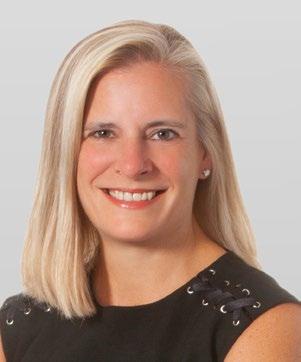
“I learned a lot about people and customer service in that job, which certainly has come in handy throughout my life and career,” she says.
Batten grew up in Ridgewood, N.J. and always has a ready answer for the inevitable question that follows when she tells people where she’s from.
“When people find out I’m from New Jersey, they love to ask, ‘which exit?’ but the truth is that my town wasn’t anywhere near the New Jersey Turnpike and didn’t have an exit,” she explains.
Batten received a Bachelor of Science degree, graduating cum laude, from The Wharton School of Business at the University of Pennsylvania. Duke University School of Law brought her to North Carolina, and after graduating with honors from Duke, she joined Smith Anderson in Raleigh. She is now in her 27th year with the firm.
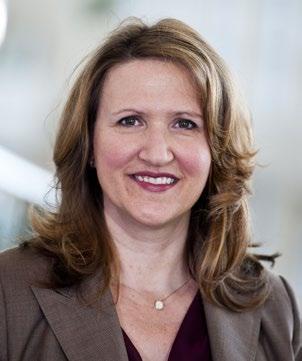
Practice area: I’m a business lawyer and work primarily with public and private companies on capital raising, corporate governance, securities, and corporate matters. This was a natural extension of my business and finance background in undergrad.
Personal accomplishment: My most meaningful accomplishment has been my ability to successfully (so far) balance a demanding career with my family life.
Biggest career challenge: I would say it is the same thing as my biggest personal accomplishment — striving to achieve and maintain balance. It’s not perfect and there weren’t many role models to look up to along the way, but I worked hard, tried to recognize when I
couldn’t do it all, and learned to give myself some grace. Advice to aspiring attorneys: Think hard about why you want to be a lawyer before you go to law school. It’s a big investment of time and resources, so be sure it’s what you want to do. Maybe try something else for a while first or gain some experience in a law-related job before diving in. Not only will it make you feel like you made the right decision, it will also provide you with helpful real-world experience and work habits that will benefit you both in how you approach law school and in your career.
Work/life balance: Find ways to manage stress and give yourself grace. For me, I need daily exercise and a far-flung vacation to look forward to on the calendar. It’s different for everyone.
Childhood goal: I wanted to be a novelist.
Favorite vacation spot: For many years, our family went sailing in the British Virgin Islands on spring break. It’s been a few years since we’ve done that, but we have great memories of our son on those trips as he grew up.
You didn’t know: I am the only child of an only child and I have an only child, and I used to drive a convertible with a stick shift — by choice.
30 May 2023 | NORTH CAROLINA LAWYERS WEEKLY
LISA M. ANGEL
President and Owner, Rosen Law Firm Raleigh
AMY BATTEN
Partner and Co-Leader, Corporate Group, Smith Anderson Raleigh
Kristen Beightol has always loved a good challenge, and she wakes up every day ready to tackle a new one.
“What I love most about my career is that I am always learning,” she says. “My job is always hard, and it always challenges me, and I wouldn’t have it any other way.”
Beightol is a partner at the Raleigh personal injury law firm of Edwards Beightol.
She has a Bachelor of Arts degree in Journalism
and Mass Communication from UNC-Chapel Hill, where she graduated with highest honors and received the Bob Quincy Academic Scholarship, the World of Poetry Award, and the Amy Charles Writing Award.
She earned her law degree from Campbell University Law School and received the I.R. Williams Academic Scholarship and the Campbell Academic Scholarship. She was the Moot Court Board co-president and Moot Court quarter finalist.
Beightol chairs the Campbell University School of Law Alumni Board and the professional negligence section of the N.C. Advocates for Justice. She is also a member of the Wake County Bar Association and Tenth Judicial District Bar Association board of directors.

Growing up: I grew up in Raleigh. I attended Aldert Root Elementary, Daniels Middle School (now Oberlin) and Broughton High School. I learned how to sail a boat the hard way, by getting lost in the Atlantic Ocean and requiring a tow. The good news is I did learn how to sail and haven’t required a tow since.
Practice area: I mainly represent those injured in
medical malpractice or catastrophic personal injury cases, though I also handle civil rights, sexual assault and abuse, Camp Lejeune, and employment litigation. I ended up in the field of medical malpractice litigation, my main practice area, because my law school Dean Willis Whichard connected me to my first job in law, which was in that field. I loved it from Day One and have never changed my mind.
Personal accomplishment: Starting a law firm with Cate Edwards in December 2021. It was the best decision ever.
First job: I worked in a candy store at the North Hills Mall in Raleigh. I learned I am pretty good at selling and I do not like candy.
Advice to aspiring attorneys: Don’t limit yourself. You can always learn. You can always do better. The only doors that are closed to you are the ones you do not open.
Work-life balance: Just do it, because no one else will do it for you.
Childhood goal: I wanted to be a writer.
Favorite vacation spot: New York City.
A month off: If I had a month off, I would travel.
Ryan Bolick brings fire, dedication, and a sense of collaboration to his practice as a partner at Cranfill Sumner in Charlotte, focusing on defense of employers, professionals in malpractice cases and mediation.
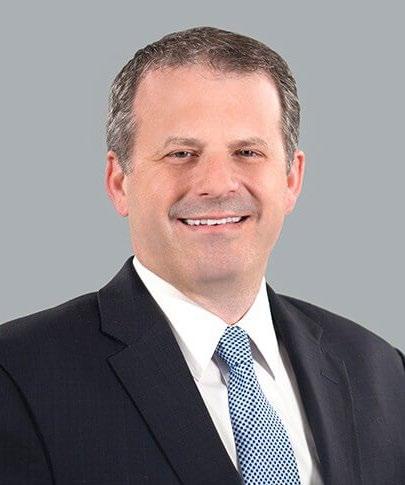
Over time, he has learned that being a successful litigation attorney not only requires skill in the practice of law but also requires the skill to attract and develop business from those who need legal services.
“It has been quite a challenge to try and become really good at both of these skills, especially since I did
not know about the second one until about seven years into the practice,” he says.
Bolick received a pair of bachelor’s degrees in English and Economics from UNC-Chapel Hill. He earned his law degree from Campbell University.
Growing up: Originally from Lenoir, my family moved four times to Knoxville, Orlando, Boston, and Charlotte where I began the 10th grade. Several times a year we travelled home to North Carolina where my extended family lived, and those were long car trips. On one trip, we stopped at a restaurant for breakfast where I apparently was served some aged cantaloupe, which made me sick. I have never looked at, touched, or smelled cantaloupe since.
Practice area: Employment and employer defense. In my opinion, it is one of the few areas of the law where clients are able to prevail on summary judgment if they can present a good faith justification for the alleged wrongful action. I also defend professionals in malpractice cases and before licensing boards. I am passionate about helping others address complaints and issues that can have a great impact on their careers. I am also a mediator. If done well, a mediator will lead litigants to think about the legal, personal and financial aspects of their cases and help them deter-
mine what is almost always true - that they are better off agreeing to a resolution than trusting a jury of individuals they don’t know to decide for them.
First job: I was a Harris Teeter bag boy. I learned that the government will take an unreasonable amount of the money you earn before you can even cash your check.
Advice for aspiring attorneys: You are going to be required to go beyond what most people in the industry you choose consider sufficient to become successful. So, select a career you enjoy because if you do not enjoy what you are doing, it will be difficult for you to outwork all the others in your profession who love what they do
Childhood goal: I wanted to be a claims adjuster or a fireman because my dad was a claims adjuster and firemen are cool.
Favorite vacation spot: Yosemite National Park A month off: I’d travel throughout Europe with my family.
You didn’t know: I touched the rim once when I was on my 9th grade basketball team. I had grown to my current height of 5’8 by that time and I was a power forward.
NORTH CAROLINA LAWYERS WEEKLY | May 2023 31
KRISTEN L. BEIGHTOL Partner, Edwards Beightol Raleigh
RYAN BOLICK Partner, Cranfill Sumner Charlotte
For Kayla Britt, the path to becoming an assistant attorney general with the North Carolina Department of Justice wasn’t always easy. It took her two attempts to get through law school, overcoming significant adversity through grit and determination. After an academic dismissal in 2013-2014, she took two years off to get her Master of Public Administration degree and returned to law school, repeating her first year. She went on to graduate a semester early with honors.
KAYLA BRITT Assistant Attorney General

North Carolina Department of Justice Raleigh




“This journey has given me a testimony to encourage others and made me a more passionate and compassionate attorney,” she says. “This is one of the reasons why I make it my mission to support law students.”
Britt has a bachelor’s in criminal justice from Campbell University, where she was a Presidential Scholar. She received a Master of Public Administration degree from North Carolina Central University, where she was the class valedictorian and graduated summa cum laude, and went on to earn her law degree from NCCU, graduating cum laude with a certification in constitutional law and civil rights. She also received the Moss-Wigfall Academic Excellence Award.
Growing up: I grew up in Fairmont, N.C. but I attended school in Lumberton. Any time I wasn’t in school, I was in the family barber shop where I learned various communication and social skills very early in life.
Practice area: I work in civil litigation and focus primarily on Medicaid appeals. I came to this area of law to develop civil litigation skills, gain experience working with an agency as a client and working with expert witnesses. I believe Medicaid is one of the most important programs in the country, and as a former Medicaid recipient, I am proud to represent the N.C. Department
of Health and Human Services in Medicaid appeals.



First job: I was a cashier at Rite-Aid. I learned how to deal with the public in both good and bad circumstances. And I learned how to deal with people who are serious about couponing.
Biggest career challenge: Trying to make myself marketable as a young attorney. I wasn’t in the top of my class, and I didn’t do law review or moot court, so I found it more difficult to highlight why I’d be a great candidate.


Work/life balance: Create boundaries. For me, weekends are my time and I do not schedule work or law-related extracurriculars during that time.



Childhood goal: I wanted to be a pediatric rheumatologist. I was diagnosed with Lupus at age 11 and I wanted to help kids like me.
Favorite vacation spot: My favorite city is Chicago, but I love the Smoky Mountains and the Outer Banks.
A month off : I would travel abroad for three weeks and rest for the last week.










You didn’t know: I bungee jumped in South Africa by one leg when my other strap came loose, and I have been approved for ground school after three tandem skydives.
Kristen L. Beightol ‘01
Ryan Bolick ‘99








Kris Hilscher ‘08
Darrin Jordan ‘90
Scottie Forbes Lee ‘14
Professor Matt Sawchak
32 May 2023 | NORTH CAROLINA LAWYERS WEEKLY
Where great lawyers are made law.campbell.edu Congratulations to the following Campbell Law School alumni and professor on being named among the 2023 “Leaders in the Law”!
VIRGINIA KNOWLTON MARCUS CONGRATULATIONS CEO, Disability Rights North Carolina NC’s Protection & Advocacy Organization North Carolina Lawyers Weekly
Growing up in rural South Carolina, Todd Brown’s life and future were impacted by the closing of segregated schools and integration that followed. He credits his mother and his teachers with guiding him through that volatile time and helping him focus on the pathway to the success he has achieved as an adult.
“My mother gave unconditional love, exhibited a strong work ethic, and held an unyielding dedication that her six children would obtain the best education possible,” he says.”I credit numerous teachers who saw
potential in me and provided unwavering support and interest in my education and overall success.”
Brown went on to earn a Bachelor of Science degree in accounting and a law degree from the University of South Carolina, where he was a member of the Order of the Wig and Robe and was the student works editor for the South Carolina Law Review.
Today, he is a partner at Hunton Andrews Kurth, where he focuses on a broad variety of complex business litigation and dispute resolution matters.
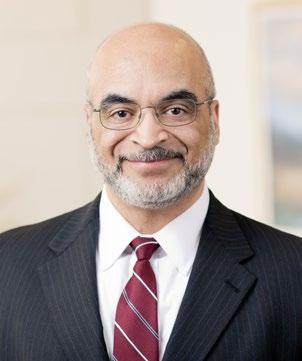
Growing up: I grew up in Chester. The closing of my segregated rural public elementary school to integrate the city public elementary school proved memorable. It occurred around1969 when I was in the fourth/fifth grade. The neighborhood kids and I steeled ourselves for the new 15-mile bus ride, the hoped-for joys, and the expected pains.
Biggest personal accomplishment: I consider among my biggest accomplishments successful navigation of enduring abject poverty, doing well academically and socially in school, helping raise three good sons, and becoming a successful attorney.
First job: At age 13, I was a helper at the Woods Ferry Recreation Area in Chester. Along with other young peo-
CARYN LEE BRZYKCY
swers and guidance to my clients.”
Brzykcy received a Bachelor of Science degree in biological sciences from the University of California, Davis, and her law degree from the University of the Pacific, McGeorge School of Law.
Since 2005, Brzykcy has been the town attorney for the Town of Taylorsville and is the school board attorney for the Alexander County Board of Education — in both cases, the first woman to fill the role.
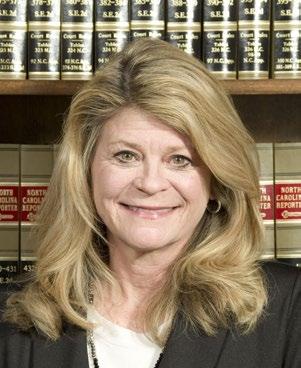
ple during the summer, I helped maintain the campsites and park so visitors could enjoy a variety of activities such as picnicking, fishing, and canoeing. I learned that manual labor can be challenging and it reinforced my strong commitment to obtaining a good education.
Advice for aspiring lawyers: Seriously consider pursuing a law career, appropriately weighing the law school costs/debts against the potential career rewards. A law degree can prove valuable by providing its owner a variety of legal and nonlegal options.
Childhood goals: When I entered college in 1978, I planned to become a computer programmer because as a child, I observed my uncle as a successful role model in the computer technology field.
Favorite vacation spot: Jamaica
A month off: I would read, exercise, spend time with my three boys, try to fit in a vacation, then relax.
You didn’t know: In 62 years of a life filled with abject poverty on one end and a degree of affluence on the other, I have never seen or spoken with my biological father. My alcoholic and violence-prone stepfather provided me little to no fatherly role model or guidance, so I hold a special place in my heart for single mothers who do right by their children and themselves.
Caryn Brzykcy was a world traveler long before she reached adulthood.
The daughter of a career Naval officer, she grew up all over the United States, as well as overseas. Today, she calls Taylorsville home, where she is the managing partner at Harbinson & Bzykcy, Attorneys at Law. She primarily practices in estate administration, Social Security disability and personal injury.
“I enjoy assisting people when they find themselves in stressful situations,” she says. “I am a problem-solver by nature and find great satisfaction in providing an-
Growing up: One of my favorite memories was in the Philippines, where I lived when my father was stationed at Subic Bay Naval Base. I was about 16, and my friends and I left the base and hired locals to take us in canoe-like boats, powered by lawn mower engines, to a small island called the Capones where we spent the day swimming and diving in the clearest water I’ve ever seen.
Biggest personal accomplishment: Raising my children, Jenna Faire and Zach. Jenna is completing her first year of law school at Elon Law, and Zach is a minor league baseball player for the Washington Nationals organization.
First job: My first professional job was providing litigation support for Superfund sites for TechLaw. I learned I could manage a large case load, and I absolutely loved
the law. It’s what led me to apply to law school.
Biggest career challenge: Balancing my personal life with my professional life. I wanted to be the best mother I could be while still having a fulfilling and successful career. I opted to practice in a small town and work for myself, so I could be available to my family and structure my schedule to be able to go on field trips, have school lunches and be involved in my children’s lives.
Advice for aspiring attorneys: I have always told my children to do what they love. If you are considering law, make sure you love it before investing in it heavily. Shadow attorneys, talk with people in the legal field, and try to gain as much exposure as you can to see if it is what you want to devote your life to.
Work-life balance: Compartmentalization. When I leave the office, I leave it all there.
Childhood goal: I wanted to be a veterinarian.
Favorite vacation spot: Uncrowded beaches. A month off: I suppose I would spend my time outdoors — hiking, gardening, going to the beach.
You didn’t know: I enjoy practicing Yoga and I am learning to hand-quilt using old Japanese kimonos as fabric.
NORTH CAROLINA LAWYERS WEEKLY | May 2023 33
A.TODD BROWN SR. Partner, Hunton Andrews Kurth Charlotte
Managing Partner, Harbinson & Brzykcy Taylorsville
For many, the act of helping out a friend can offer a rare satisfaction and change of perspective. For Keith Burns, it changed his career.
Burns began as a commercial litigator, but shifted his focus after a friend asked him to represent him in the acquisition of a business.

“Through that experience, I found I like transactional work, and my practice began evolving to what it is today,” he says.
Burns is now managing partner at Nexsen Pruet in





 KEITH BURNS Managing Partner, Nexsen Pruet Raleigh
KEITH BURNS Managing Partner, Nexsen Pruet Raleigh
Raleigh, focusing on representing developers in all real estate asset classes, commercial real estate and business lenders, and parties to public-private partnerships.
He received his bachelor’s from UNC-Chapel Hill and his law degree from Wake Forest University School of Law, where he received the Robert Goldberg Award for Trial Advocacy, was the National Trial Competition southeastern regional winner for two years, and, in 1992, made it to the National Trial Competition final four.
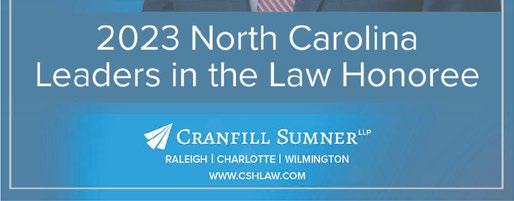
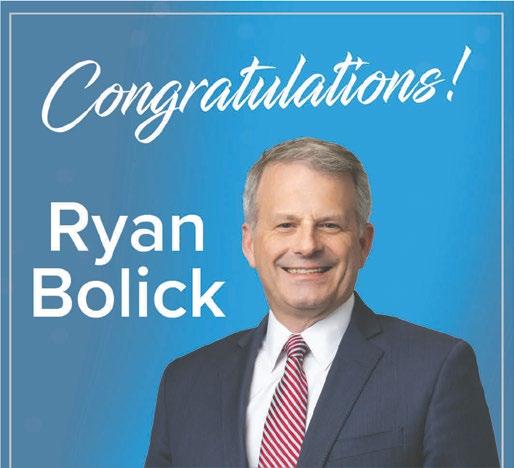
Growing up: I grew up in Laurinburg, N.C. My childhood gave me many good memories and a sense of accomplishment after summiting a 12,444-ft. peak at Philmont Scout Ranch. My first experience above the tree line, and my first views from that height stand out.
Biggest personal accomplishment: Creating a life with my family that has allowed me to focus on my marriage and kids, pursue a career in law, and pursue charitable activities. My wife and I are celebrating 33 years of marriage and counting, our children are pursuing the work they’ve chosen, I work at a law firm that allows me to do interesting work for clients I enjoy, and I have had the opportunity to contribute to nonprofits that serve the community.
First job: Growing up in a small eastern North Carolina town, I learned the importance of doing a job well, especially when others are counting on me, and the humility to complete whatever work is required. My first job was some combination of painting a stockyard fence, cleaning hog houses, and raking hay.
Work-life balance: Find a supportive spouse, which is to say I don’t balance well and I don’t have any meaningful tips.
Childhood goal: At 8 I was convinced I wanted to be a chemical engineer, so I could make explosives. What 8-year-old boy doesn’t love explosions?
Favorite vacation spot: Ocean Isle Beach, N.C. and DeBordieu, S.C. are frequent vacation spots.
A month off : Community service has been important from my childhood, through my time as a Peace Corps volunteer in the Philippines and continuing today. I might invest the month in community service. There’s also a chance I’d be more self-indulgent with a cooking course in Lèon or intensive golf instruction. You didn’t know: My wife was my date to my high school senior prom, and I’m an instrument rated airplane pilot.
34 May 2023 | NORTH CAROLINA LAWYERS WEEKLY
Congratulations to Laura Loyek 2023 NC Leaders in the Law Award Recipient WWW.LAWYERSMUTUALNC.COM LIABILITY INSURANCE COMPANY OF NORTH CAROLINA LAWYER S MU TUAL
As a CPA, Lois Wagman Colbert brings an extra level of expertise to practice at Kilpatrick, Townsend & Stockton. She leads the firm’s Employee Benefits Practice Group and co-authored the chapter “Reimbursement Arrangements” in the
LOIS WAGMAN COLBERT Partner, Kilpatrick, Townsend & Stockton Charlotte
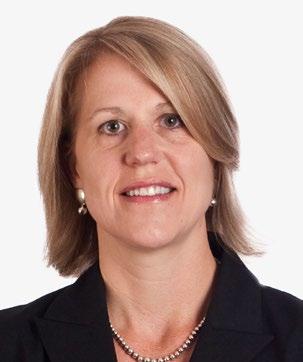
first, second and third (most recent) editions of the Section 409A Handbook.
Colbert received her Bachelor of Science degree in accounting from the University of Illinois, graduating with honors. She earned her law degree from the University of Michigan School of Law.
Growing up: I grew up in Urbana, Ill.
Practice area: Executive compensation and employee benefits. With an accounting degree, I initially intended to be a corporate tax lawyer. But during my first summer job during law school the employee benefits practice was part of the tax team and I decided to move in that direction.
Personal accomplishment: Raising three amazing daughters.
First job: I worked in a library starting at age 15. One thing I learned was how to respond to difficult
customers.
Biggest career challenge: Managing a career and family.
Advice for aspiring attorneys: There are a wide range of opportunities for lawyers, and the critical thinking learned in law school teaches serves one well regardless of one’s chosen career.
Work-life balance: Maintaining balance is a moving target and one must be flexible and adapt along the way.
Childhood goals: It changed from time to time, but by high school I wanted to be a lawyer.
Favorite vacation spot: A tie between Provence, France, and Cinque Terre, Italy.
A month off: I would travel.
You didn’t know: I grew up a figure skater and worked in a bridal shop during college.
Michael DeMayo was a sophomore at the Jesuit prep school Gonzaga College High School in Washington, D.C., when a priest at the school pointed out he had the perfect skillset for a career in law.
“I had never thought about becoming a lawyer until the priest said to me, “Young man, you could argue with a brick wall and win. You should think about a career as a lawyer.”
That was the first time anyone had planted the idea that he could succeed at a vocation in which he’d be
MICHAEL A. DEMAYO CEO, DeMayo Law Offices Charlotte
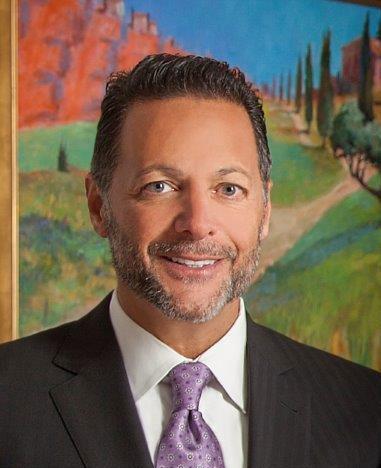
paid for helping people “simply by making good arguments and winning,” he says.
After receiving his bachelor’s degree, graduating cum laude from Wake Forest University, DeMayo went on to earn his law degree from UNC-Chapel Hill.
He is the owner and CEO of the DeMayo Law Group in Charlotte, where he focuses on catastrophic personal injury, wrongful death, workers’ compensation and mass torts.
Personal accomplishment: Raising four kids as a single father and we are all still alive. I am also proud that they will have all either matriculated, graduated, or are in process of their college experiences. I am proud that I have been able to do this while continuing to build a successful client-focused personal injury law practice.
Biggest career challenge: In law school they don’t teach you how be an entrepreneur and grow a successful law firm or how to hire and motivate people, develop core values, and other aspects. They teach you how to be a lawyer, to research and find the law. Continuing to grow the infrastructure of our law firm is something we work on every day.
Work-life balance: Time-management and practice self-love/self-care. Early in my career I made a
commitment that I wouldn’t miss an event with my children, so being able to weave that in with commitments in my practice is always challenging. Thus, it was imperative that time management and precise scheduling would be a key part of my survival. It’s also important to make time for yourself - meditate, work out, practice self-love and self-care. When you don’t take care of yourself, you can’t take care of anybody else. And of course, at the end of the day if you genuinely enjoy what you do in your professional life, it spills over to your personal life.
Childhood goals: I wanted to be an astronaut or a race-car driver.
Favorite vacation spot: Cabo. It is my happy place. A month off: Cross some places off my bucket list: Italy, France, Germany, Asia, China, Taiwan, Hong Kong, Singapore. Go everywhere to try the food and meet the people.
You didn’t know: I attended a Military Catholic Boarding school in Manassas, Va., for my entire elementary school experience. So from third to eighth grade I lived away from home. Growing up, I loved horses and spent a week at a summer camp cleaning stalls and learning about the care and maintenance of horses.
NORTH CAROLINA LAWYERS WEEKLY | May 2023 35
Kris Hilscher has wanted to be a lawyer since the “ripe age of 5.”
Growing up on a farm near Richmond, Va., Hilscher spent a lot of time with his grandmother, who was clerk of a domestic relations court in Chesterfield County.
“I spent many afternoons after school hanging out in the clerk’s office, and all the judges and lawyers that came through knew me by name and took the time to talk with me, answer questions and give me advice,” he says. “That experience sparked my inter-
KRISTOPHER J. HILSCHER Senior Associate, Law Offices of Mark E. Sullivan Raleigh
est in the law.”
Hilscher went on to receive his bachelor’s from Hampden-Sydney College and his law degree from Campbell University.
Today, he’s a senior associate at the Law Offices of Mark E. Sullivan in Raleigh, where he practices divorce and family law, with a focus on military families.
Personal accomplishment: Becoming accepted as an expert in military family law has been my greatest achievement thus far, and that takes a lot of work. My boss, Mark Sullivan, has a sign in the office with a quote from Thomas A. Edison: “Opportunity is missed by most people because it is dressed in overalls and looks like work.” I have taken that to heart, put in years of work, and have grabbed opportunities to learn.
First job: As a kid, I tackled farm and yard work and outdoor chores, spending many Saturdays mowing acres of grass. I learned a valuable lesson: Hard work can be enjoyable, and there is fulfillment in seeing the fruits of your labor. My first paid job was at K-Mart as a cashier. I learned I did not want to work retail for my entire career.
A. LEE HOGEWOOD III Managing Partner, K&L Gates Raleigh
“Joe is brilliant, creative, and super fun to work with,” Hogewood says. “The subject matter was complex and allowed a great mix of both litigation and transactional work.”
Hogewood received his bachelor’s degree from Harvard College, graduating cum laude with a concentration in government. He earned his law degree from Wake Forest University, again graduating cum laude, and was the managing editor of the Wake Forest Law Review.
Biggest career challenge: For the first 10 years of my career, I did not have a mentor, and that was incredibly difficult. I had to figure everything out for myself, and I sometimes made mistakes. I spent countless hours buried in research and conducted many hearings and trials learning in the trenches. And while I learned many valuable lessons during that time, I now have the privilege of working with a mentor that I hold in esteemed regard, and I realize what I missed out on in those earlier years.
Favorite vacation spot: Before having kids, my wife and I took a two-week vacation to Vienna. It was one of our most memorable traveling experiences. My favorite spot to get away now is Oak Island.
You didn’t know: In high school I was into punk, metal and hardcore music. I had green hair, shoes made from tennis ball material, wore punk and metal band t-shirts, and played the drums in a small hardcore band. For much of our married life, pre-children, my wife and I camped on the dunes in Oregon Inlet and spent our days off-roading in a 4x4 on the sand. We now have a Jeep Wrangler Rubicon, take it to the beach, and share this love with our boys.
Thirty-three years into his career, Lee Hogewood can’t think of many days he hasn’t woken up excited about going to work.
The managing partner at K&L Gates’ Raleigh office, Hogewood focuses on bankruptcy and restructuring. He attributes his joy of practicing to Joe Kluttz, the bankruptcy partner in the Charlotte office of Kennedy Covington, where he worked during the summers after his first and second year in law school.
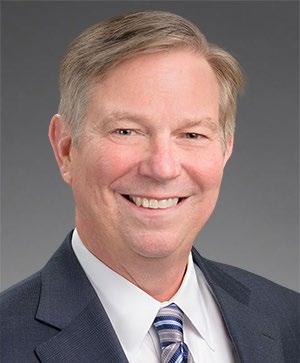
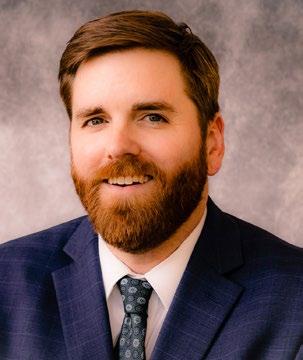
Growing up: I grew up in Charlotte. In 6th grade, I pitched in the final inning of a Little League baseball game where I had to walk my two best friends to load the bases with one out. I then struck out the next batter for the second out. The next batter rolled a grounder to third and we got the force out at home. We scored in the bottom of the inning to win 25-24. I think the game lasted about five hours. I will never forget one minute of that game.
Biggest personal accomplishment: I’m not sure there is one. While not my accomplishment, I am proudest of my role as a father to three remarkably talented and caring young adults who have, for their entire lives, inspired me to be a better person than I am.
First job: I begged my next-door neighbors to let me mow their lawn when I was 8 or 9. After a long afternoon, I was about halfway finished and dead tired. They let me stop and come back the next day and finish. It looked terrible but they were very nice about it. They let me try again the next week and it went faster and I did a better job. I learned there are many clichés that fit and fall into the category of perseverance and learning from failure. But what I truly learned was that our dear neighbors were two of the kindest and most loving people I’ve ever known.
Advice for aspiring attorneys: This isn’t just about law. Be sure you are considering any career for the “right” reasons, which can be different things for different people. While pursuing a particular career for someone else’s reasons will make for long grueling hours, pursuing it for your reasons will create passion and energy and joy for your entire career.
Childhood goal: I wanted to be one of the following: astronaut, veterinarian, lawyer.
Favorite vacation spot: Ocean Isle Beach. A month off: I would travel Europe with as much of my family as was willing to endure me and my insistence that we visit historic spots for a month.
36 May 2023 | NORTH CAROLINA LAWYERS WEEKLY
Susan Jackson parlayed her engineering skills and education into a career as a patent attorney after she was named an inventor on a patent from research she conducted as a summer intern at a company where she worked.
As managing partner Nelson Mullins’ Charlotte office, she has expanded her practice to include intellectual property law, trademark and copyright law.
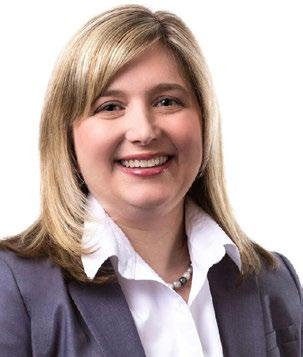
Jackson graduated from Clemson University with
SUSAN S. JACKSON
Charlotte Office Managing Partner, Nelson, Mullins, Riley & Scarborough Charlotte
a Bachelor of Science degree in chemical engineering, graduating magna cum laude. She was the Clemson Chapter president of Tau Beta Pi, the National Engineering Society. She earned her law degree from Wake Forest University School of Law and was on the Wake Forest Law Review staff.
She serves on the Clemson University Board of Visitors is a founding member and the first president of the Charlotte Women's Bar, a Chapter of the North Carolina Association of Women Attorneys
Growing up: I grew up in Charlotte. Some of my best childhood memories are the times that I spent with my mother and grandmother who took me shopping and out to lunch on the weekends at SouthPark mall.
Personal accomplishment: My biggest personal accomplishment is raising my two sons. One is in college at UNC-Chapel Hill and the other is at Georgetown University. They are amazing young men, and I am extremely proud of the people that they have become.
First job: My very first job was as a babysitter in
VALERIE A. JOHNSON
Partner, Johnson & Groninger Durham
and her law degree from UNC-Chapel Hill, graduating with honors.
Growing up: grew up in Henderson, N.C. As a preacher’s kid, I spent a lot of time in church. When I was 4, I was assigned to recite a story in a children's program. Instead of the Bible story I had learned, I told an original tale about a spider and a fly. I can still hear the laughter.
the neighborhood where I grew up. I learned how to be resourceful and entrepreneurial.
Biggest career challenge: In order to have a successful and fulfilling career, I have had to learn to adapt over time and take the long view as the law, clients, and co-workers change.
Advice for aspiring attorneys: Know your strengths and choose an area of law you love. You will be successful because of your hard work and passion.
Work-life balance: Have a great partner in life who is willing to work with you as a team for the betterment of both of you – personally and professionally.
Childhood goal: I wanted to be a school teacher
Favorite vacation spot: Hilton Head Island, S.C.
A month off: I would take a trip to Sicily to learn more about my family roots.
You didn’t know: For my 40th birthday, I learned how to ride a bike so I could go on a trip to France with my son. My family got our first dog, Bailey, a golden retriever, when my eldest son went off to college.
Leadership is in Valerie Johnson’s DNA. A partner at Johnson & Groninger, she is president of the North Carolina Advocates for Justice and in 2021, received the organization’s Charles L. Becton Award for Teaching.

Johnson is also a Fellow of the College of Workers’ Compensation Lawyers and the author of North Carolina Workers’ Compensation Law: A Practical Guide to Success at Every Stage of a Claim.
She earned her Bachelor of Arts degree in education
Practice area: I am board certified in workers’ compensation law. Growing up, I knew people who were seriously injured at the local factories. I saw how devastating those losses were to the victims and to their families. I practice workers’ compensation and personal injury law because of the difference my work can make in the lives of individuals who have been injured or wronged.
Biggest personal accomplishment: Being elected as the president of the North Carolina Advocates for Justice in 2022 has been the greatest achievement of my career. After having been a part of the organization for 27 years, I am honored to serve NCAJ as it begins its next 60 years.
Biggest career challenge: Juggling the demands of a law practice and those of my family. I have the best husband, and my children, now 27 and 19, are wonderful people who survived having a lawyer for a mom.
Advice for aspiring attorneys: If you are interested in helping people navigate a course through a confusing legal landscape, you could find great satisfaction in a legal career. Lawyers are often tasked with helping people through the most challenging time of their lives, so being comfortable as a problem solver is key.
Work-life balance: Accept that balance is relative and not absolute. Sometimes the scales tip toward work, as they do with trial work and deadlines, and sometimes they tip toward personal and family, with babies and family caregiving. The key is to ask for help, set a few non-negotiables, and be flexible when you can.
Childhood goal: I wanted to be a lawyer, a teacher, and a scientist. My mother taught chemistry and biology and was surprised about my ultimate decision to be a lawyer.
Favorite vacation spot: I am partial to Spain.
A month off: I would take a class in art or history, preferably in a great destination.
You didn’t know: I love all kinds of art and often visit museums and galleries. I have always loved to read, and writing is an important outlet for me.
NORTH CAROLINA LAWYERS WEEKLY | May 2023 37
“Serious,” “passionate,” “kind” and “thoughtful” are just a few of the glowing terms used to describe Darrin D. Jordan in a recent North Carolina State Bar Legal Specialization profile.
The profile adds the that the partner at Whitley, Jordan, Inge & Rary is “introspective and genuinely cares about his community, fellow lawyers and everyone he meets.”
Jordan, a board-certified specialist in state criminal law, grew up in Salisbury and earned a BA in political science and accounting from Catawba College and a law degree from Campbell University.
After law school, Jordan worked in Wilmington for three years with the Peters and Register law firm before moving back to Salisbury. He was an assistant district attorney in Cabarrus and Rowan counties for six years before becoming a private attorney.
He is the immediate past president of the North Carolina State Bar.

Growing up: After I graduated from high school, my uncle and I drove to Alaska from Rowan County to deliver a diesel engine to my grandfather who worked on a sawmill in Anchorage each summer. I spent the summer of 1983 working at the lumber yard where he worked and at the end of the summer, I told my Dad I was going to stay up there. That conversation didn’t go so well, and I was soon flying home to attend Catawba College. I’m convinced I would have never been an attorney if I had stayed in Alaska.
Practice area: Criminal law. After spending six years as a prosecutor, criminal law is the area I knew the best, so familiarity and comfort with criminal law kept me engaged in that area.
Personal accomplishment: Being married for 32 years to my wife whom I met while at Buies Creek and raising our two children a son and daughter. There is
nothing like family.
First job: I worked in Wilmington for Peters & Register where I was given the opportunity to develop my own practice within an established law firm.
Biggest career challenge: Keeping up with the changes in criminal law. From legislative changes to new appellate decisions, I never feel like I’m caught up.
Advice for aspiring attorneys: Pursue your passion and if you don’t have the passion to be an attorney, do something else. You would not only do yourself a favor but our legal system a favor.
Work-life balance: I’m still trying to find the balance, but I think it has to do with cutting off my phone and not reading my daily emails. I haven’t mastered that yet.
Childhood goal: I really don’t recall. I never thought I wanted to be a lawyer, because I don’t recall even knowing what a lawyer was.
Favorite vacation spot: The North Carolina mountains and occasionally, Hilton Head.
A month off: I would trout fish and read.
You didn’t know: I was extremely shy and I hate being recognized for things I think are ordinary accomplishments.
NAHO KOBAYASHI Partner, McGuireWoods Charlotte
equity investments in connection with acquisition financings for leveraged buyouts, as well as syndicated and bilateral cash flow and asset-based credit facilities.
She received her bachelor’s degree from Johns Hopkins University, where she graduated with high honors. She earned her law degree from Duke University, graduating cum laude.
Active in her professional community, Kobayashi serves on the board of the Lawyers Committee for Civil Rights Under Law and is a past president of the Charlotte Asian Pacific American Bar Association.
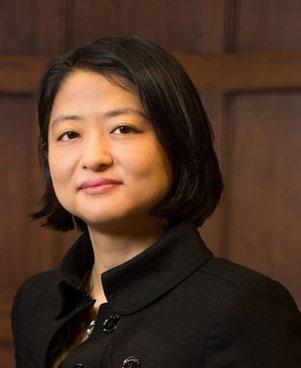
Acelebrated leader at McGuireWoods in Charlotte, partner Naho Kobayashi heads the firm’s alternative lender sub team. She has also served as co-chair of the Recruiting Committee and is a member of an external committee for a major financial institution, where she provides advice to the organization’s diversity initiatives. Kobayashi focuses on complex commercial and banking transactions. She primarily represents lenders and investors in debt financings and related
She was a member of Leadership Charlotte XXXII, and in 2019, was one of 32 McGuireWoods lawyers named to the North Carolina Pro Bono Honor Society.
Growing up: I grew up in Massachusetts. There was a lot of snow growing up.
Practice Area: I’m a debt finance lawyer. It’s a fastpaced, team-oriented practice that offers continual opportunities to learn.
Biggest professional accomplishment: I’m in my 25th year of practice and I’m always learning new things.
First job: I worked retail in high school and learned how hard those jobs are.
Biggest career challenge: Understanding that the practice of law is a marathon and not a sprint.
Advice for aspiring attorneys: Take advantage of opportunities you to talk to different types of lawyers and really listen to what they have to say.
Work-life balance: Give yourself permission to be imperfect.
Childhood goal: I had so many different goals, I don’t remember!
Favorite vacation spot: We prefer the mountains over the beach — although the beach is pretty great too.
A month off: I’ve always wanted to do a via ferrata trip in the Alps or maybe just hang out in Paris.
You didn’t know: I have a weakness for Netflix reality competitions and cake.
38 May 2023 | NORTH CAROLINA LAWYERS WEEKLY
DARRIN D. JORDAN
Partner, Whitley, Jordan, Inge & Rary Salisbury
For Scottie Lee, mastering the art of setting priorities has been her secret to success at work and in life.
“Prioritizing and delegating your work will enable you to have a personal life,” she says. “As lawyers, we have never-ending to-do lists, and managing your time and task list is crucial to avoiding burnout.”
Lee, a partner at Ellis & Winters in Greensboro, focuses on complex business litigation and product liability litigation.
SCOTTIE FORBES LEE
Partner, Ellis & Winters Greensboro
She is highly educated with a Bachelor of Arts degree in communication-public relations and a Master of Public Administration from N.C. State University. She also earned her MBA and JD degrees from Campbell University, and she was editor-in-chief of the Campbell Law Review.
Growing up: I grew up in Camden County, N.C. in the northeastern corner of the state. I lived down the road from a cornfield maze, and there were only two stoplights in the entire county.
Practice area: I focus primarily on complex business litigation and product-liability litigation. After law school, I was a law clerk to Judge James Gale on the North Carolina Business Court for two years. I watched some of the best litigators in the state argue complex legal issues in that court, and I knew I wanted to do the same.
First job: When I turned 15, I worked at a farmers’ market near the Outer Banks. I picked rotten vegetables out of produce bins and worked in a yogurt stand. It was hard work for minimum wage, and every job after that seemed glamorous in comparison.
Biggest challenge: It sounds cliché, but I’ve
LAURA M. LOYEK
found that achieving a sustainable work-life balance is the hardest part of practicing law. Improving my time-management skills and learning to better prioritize and delegate has been crucial to striking that balance.
Advice for aspiring lawyers: Get real-world work experience before you go to law school. It will make you a better law student. And when you start your career, you’ll have a better understanding of the business aspects of practicing law - something you won’t learn in law school.
Childhood goal: I have always wanted to be a lawyer. In one of my second-grade classes, we had a mock trial on Goldilocks and the Three Bears. I represented Goldilocks (I believe the issue involved porridge), and I won. I wanted to be a lawyer from that day forward.
Favorite vacation spot: Jackson Hole.
A month off: I would organize my house and travel.
You didn’t know: In my early teenage years, I played clarinet in the all-state concert band. I have also worked as a personal trainer and practiced Muay Thai.
Claims Counsel, Lawyers Mutual Liability Insurance Company of N.C.
Cary
bankruptcy, and ethics. Prior to joining Lawyers Mutual, she practiced with the law firms of Smith Moore and K&L Gates.
After receiving two Bachelor of Arts degrees in English and Spanish from Wake Forest University, graduating summa cum laude, she went on to earn her law degree from Harvard Law School, graduating cum laude and serving as academic liaison for article selection for the Harvard Women’s Law Journal.
Biggest career challenge: Starting out, I struggled with being paralyzed by perfectionism, feeling like I didn’t want to attempt something unless I knew I could do it perfectly. Projecting confidence, even when it isn’t my natural impulse, has been one of my biggest challenges.
Laura Loyek learned the true meaning of leadership when she served a term as president of the North Carolina Association of Women Attorneys during the COVID-19 pandemic in 2021.
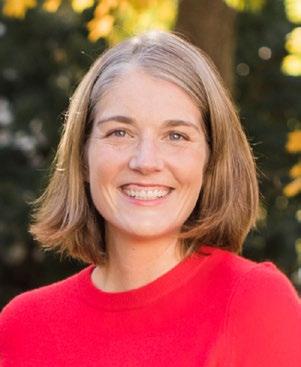

“The responsibility of steering the organization through a pandemic year and making sure it was strong and active on the other side was difficult but very rewarding,” she says.
Loyek is claims counsel for Lawyers Mutual Liability Insurance Company of North Carolina, where she focuses on estates and trusts, litigation, appellate law,
Growing up: I grew up in Noblesville, Ind. (outside of Indianapolis). I have great memories of taking days trips almost every summer when I was a kid to see the Cubs play at Wrigley Field. My grandmother was a big Cubs fan. My mom, brother and I would pick her up and drive into Chicago for a game. I loved the sights, sounds, and energy of the ballpark.
Personal accomplishment: I’m proud of my time at president of the North Carolina Association of Women Attorneys in 2021, and of course, I’m proud of my sons, Will, 13, and Greg, 10. I’m lucky to be their mom and love watching them as they grow into fantastic, cool people.
First job: I worked as a lifeguard four or five summers during high school and college. I learned how to maintain focus and the importance of sunscreen.
Advice for aspiring attorneys: Professionalism and collegiality are crucial and will be rewarded in the long run. Most areas of practice are adversarial, but you don’t have to be combative or make things harder than necessary for opposing counsel. Even in a large city, the bar is small, and paths will cross again. If you can show kindness and professionalism, it will come back around some time when you are the one needing it.
Childhood goal: I wanted to be a journalist or a veterinarian.
Favorite vacation spot: I love St. John, USVI.
A month off: My fantasy answer is taking a monthlong trip to Australia. Realistically, I would probably read, take naps, walk my dog and spend time with my family.
You didn’t know: I’ve run a marathon. I’ve also done half marathons in six states. My seventh will be later this spring in Kentucky. In high school, I competed in the International Science Fair.
NORTH CAROLINA LAWYERS WEEKLY | May 2023 39




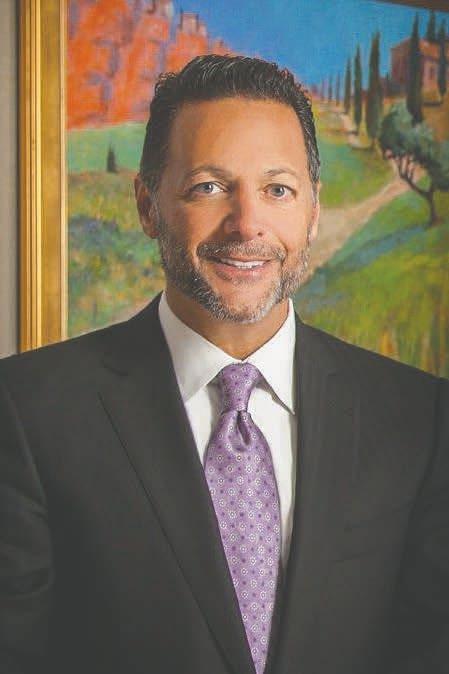
Congratulations! Michael A. DeMayo North Carolina Lawyers Weekly 2023 Leaders in Law Honoree DeMayo Law Offices, LLP Your North Carolina Law FirmTM Charlotte | Hickory | Monroe www.demayolaw.com | (704) 333-1000
Over her long career, Virginia Knowlton Marcus has been devoted to social justice issues, and particularly disability rights.
“I have a lived experience with a disability, and early in life I felt a sensitivity and interest in social justice concerns,” she says. “I decided to attend law school specifically to practice in public interest law.
Marcus joined the DRNC team as the CEO in September 2018. She has spent her career advocating for disability rights in multiple states, federally, and internationally for the past 25 years.
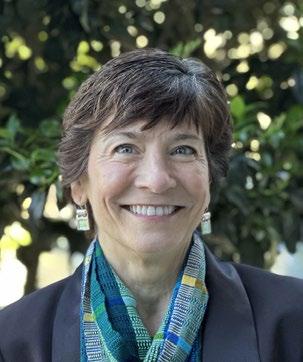
VIRGINIA KNOWLTON MARCUS Disability Rights North Carolina Raleigh
She graduated from the University of California, Davis with a Bachelor of Arts degree in international relations and went on to receive her law degree from the UC-Davis School of Law.
Growing up: I grew up in small town Minnesota. When I was a kid, I loved to visit my aunt and uncle’s farm where I developed a love of animals, nature, cooking, and a long day’s work.
Biggest personal accomplishment: I have built nonprofit law firms and developed a significant body of disability rights work in three states – California, Maryland and now in North Carolina. It is a rewarding career and I value the many relationships I’ve built.
First job: I was a waitress, eventually becoming the “graveyard shift” manager of the restaurant where I worked. I learned the power of teams to accomplish multiple tasks, how to keep things moving and provide conscientious customer service, and the importance of having fun at work.
Biggest career challenge: Disability rights work is difficult, under-prioritized and under-resourced. People with disabilities are among the most maligned, misunderstood, marginalized, scapegoated, stereotyped, segregated, and discriminated against people in our
THOMAS L. MITCHELL Managing Partner, Moore & Van Allen Charlotte

the University of Illinois and his law degree from Washington & Lee University, graduating cum laude.
He primarily focuses on financial institutions and debt financing.
Growing up: I grew up in western Illinois and have very fond memories of my childhood. I was one of six children, and we had many other children in our neighborhood which made it very easy to organize a game of tackle football or baseball at the local park. In the summer, we would leave the house in the morning and spend all day at the ball field competing against the other neighborhood kids. We’d would only go home for lunch, dinner, and a shower at the end of the day.
Ateacher and coach at heart, Tom Mitchell spent four years teaching high school English and coaching football and basketball before going to law school. It is a passion he has never given up.
“I am fortunate these days to find the time to serve as an assistant coach for the Charlotte Country Day varsity boys’ basketball team,” he says.
This spring, the team is coming off a winning season.
Mitchell, managing partner at Moore & Van Allen in Charlotte, received a Bachelor of Science degree from
Practice area: Prior to serving as my firm’s managing partner, I practiced for 25 years as a finance attorney representing financial institutions in debt financing of many types, including syndicated credit facilities, with a focus on leveraged acquisition finance.
First job: I had a paper route in the seventh grade. I learned a lot about responsibility, especially at a time before the internet and instant news, and my customers relied on me to deliver their newspapers every day on a timely basis. I also got an education on what it was like
society. We face ignorance every day, not because others are ill-intentioned, but because disabled people have routinely been stuck in separate places to live, work, and play, away from everyone else. This has created the false belief that people with disabilities belong in separate settings, rather than integrated into our communities, schools, and workplaces, and fed the misperception that we are unworthy, incapable, even dangerous. There are powerful, monied interests that benefit from maintaining this segregated status quo pushing back against efforts to deinstitutionalize. Legal tools fall short of what is needed. Our culture and attitudes must evolve, and the law is a blunt instrument when it comes to effectuating that kind of change.
Advice for aspiring lawyers: Know yourself well and be clear about your reasons for pursing this career.
Work-life balance: I am a certified yoga instructor. Yoga has improved my life and helps me manage my symptoms. I also guide an early morning weekday meditation group.
Childhood dream: I wanted to be an astronaut or veterinarian.
Favorite vacation spot: I like to go to new places where I’ve never been, so I don’t have a favorite.
to run a business. There were no payment processing systems in place in the 1970s, and I had to go door-todoor every week to collect the subscription cost for the paper directly from my customers.
Advice for aspiring attorneys: Gain work experience in a variety of legal settings if possible, so you are getting exposed to different opportunities in the law, and keep an open mind to various areas of study. Sometimes law students focus on one area of the law too early in their education or career.
Work-life balance: Lawyers must ensure they schedule time for vacation and for themselves and their families. Burnout and stress are real problems in our profession, so it is important to set boundaries early on.
Childhood goal: I wanted to be a professional baseball player. My friends and I played sandlot baseball and listened to the Chicago Cubs on WGN radio every day in the summer, hoping one day we’d play in the big leagues. Reality eventually set in, and I decided I should more time into my education.
Favorite vacation spot: The coast of Maine in the summer.
NORTH CAROLINA LAWYERS WEEKLY | May 2023 41
When considering his top personal and professional accomplishments, it’s a toss-up for David Sar.
There’s the sublime experience of having raised two delightful daughters. Or the exhilarating adventures of climbing up Kilimanjaro and down into the Grand Canyon.
And as a partner at Brooks Pierce, he has realized that his most prized professional accomplishment has been cultivating countless long-term relation-
DAVID SAR
Partner, Brooks, Pierce, McLendon, Humphrey & Leonard Greensboro

ships with his clients.
“I have treasured the opportunity to provide advice and judgment most clients value highly enough that they are still working with me many years later,” he says.
Sar grew up in Roanoke, Va. He received his bachelor’s degree from Duke University, graduating magna cum laude, and earned his law degree with honors from Yale University School of Law.
He has long been active in professional and civic organizations, currently serving on the Local Patent Rules Committee of the U.S. District Court for the Middle District of North Carolina, Launch Greensboro Advisory Board, and the Moses Cone Health System Institutional Review Board.
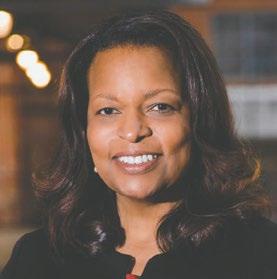
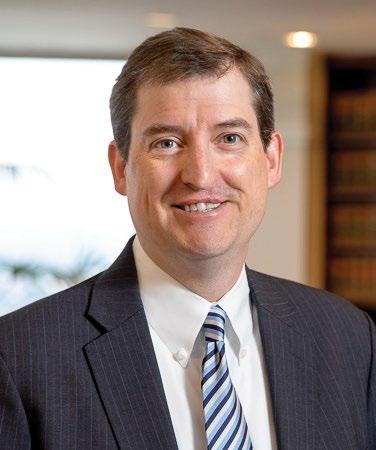
First Job: My favorite early job was being a video game arcade attendant. I learned how to cool down fights, how to quicky repair the games, and I learned it is better to listen than to talk. At least one of those became a useful lawyer skill.
Biggest career challenge: There are not enough hours in each day to fully embrace all the interesting issues.
Advice to aspiring attorneys: Listen carefully to clients and others, and prepare thoroughly for your cases and deals.
Take your events online
Work/life balance: Do what you love, love what you do, and the professional and personal might just harmoniously merge if you are lucky.
Childhood goal: To be an astronaut.
An intellectual property and business attorney, he has been with Brooks Pierce for over 26 years. He is a board-certified specialist in trademark law.
“I fell into that area of law from a few interesting cases early on, and then I dove deeper as the Internet took over the world,” he says.

28203 www.jglawnc.com
Favorite vacation spot: Someplace I haven’t been. I like to try new things and places.
You didn’t know: I’ve been blessed to have smart, supportive and engaging colleagues at Brooks Pierce. And pie is the best dessert.
With many of your clients and prospects working from home, now is a great time to engage them through a webinar.
Take your events online
Hosting a webinar is a powerful way to connect with your target audience,and with North Carolina Lawyers Weekly - you won’t have to worry about any of the logistics.
Take your events online
Whether you’re looking to move an in-person event online,or just need to generate quality sales leads,our team can help provide turnkey service from marketing to execution!
What is included in your webinar:
• 45-60 minute webinar
Dedicated project support
Email marketing
• Social media
• Print ad
For more information,please contact Sheila Batie-Jones at 704.817.1350 or sbatie-jones@nclawyersweekly.com.
With many of your clients and prospects working from home, now is a great time to engage them through a webinar.
Hosting a webinar is a powerful way to connect with your target audience,and with North Carolina Lawyers Weekly - you won’t have to worry about any of the logistics.
With many of your clients and prospects working from home, now is a great time to engage them through a webinar.
Hosting a webinar is a powerful way to connect with your target audience,and with North Carolina Lawyers Weekly - you won’t have to worry about any of the logistics.
Whether you’re looking to move an in-person event online,or just need to generate quality sales leads,our team can help provide turnkey service from marketing to execution!
Whether you’re looking to move an in-person event online,or just need to generate quality sales leads,our team can help provide turnkey service from marketing to execution!
What is included in your webinar:
• 45-60 minute webinar
What is included in your webinar:
• 45-60 minute webinar
• Dedicated project support
• Dedicated project support
• Email marketing
• Email marketing

• Social media
Social media
• Print ad
Print ad
For more information,please contact Sheila Batie-Jones at 704.817.1350 or sbatie-jones@nclawyersweekly.com.
For more information,please contact Sheila Batie-Jones at 704.817.1350 or sbatie-jones@nclawyersweekly.com.
42 May 2023 | NORTH CAROLINA LAWYERS WEEKLY
Johnson for being selected as one of the 2023 NC Lawyers Weekly Leaders in Law. Durham Office: 300 Blackwell St., Suite # 101 Durham, NC 27701 Charlotte Office: 1018 East Blvd., Suite #6, Charlotte, NC
Johnson & Groninger Congratulates Valerie
Alife journey that includes seminal stops at both Burger King and Harvard may not represent the typical path for a successful Carolina litigator, but Matthew W. Sawchak is not your typical lawyer.
Sawchak grew up in upstate New York and Washington, D.C., and met his wife, Maureen, when both worked at the home of the Whopper. Just a few short years later, he graduated cum laude from Harvard, where he also served as music director of the Harvard Opportunes. He earned his J.D. and a Master of Laws
MATTHEW W. SAWCHAK
Shareholder, Robinson Bradshaw Raleigh
degree from Duke, graduating with honors, and was editor-in-chief of the Duke Law Journal.
Today, Sawchak is a shareholder at Robinson Bradshaw in Raleigh, where he focuses on complex litigation, antitrust, and appeals. He has argued at all levels of the federal and North Carolina court systems, including the U.S. Supreme Court.

Before joining Robinson Bradshaw, Sawchak served as North Carolina’s solicitor general from 2017 to 2020, acting as lead counsel in the state's highest-stakes civil appeals.
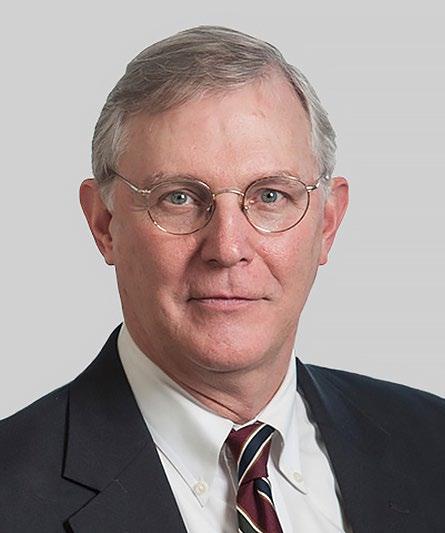
With an affinity for music, Sawchak is a member of the North Carolina Master Chorale, and a member of the North Carolina Opera. He also volunteers at A Place at the Table and at A Note in the Pocket, local nonprofit organizations that help people with limited resources.
Practice area: I handle complex litigation and appeals. I enjoy taking a tangle of law and facts and turning it into a clear and persuasive case.
Personal accomplishment: Being a husband to my wife Maureen and a father to our son and daughter, Ben and Julia. Our family relationships are our best opportunity to make a contribution that will outlive us.
First job: I was the bugler at a summer camp. Every week, the campers would throw me and my bugle in the lake as revenge for waking them up each day. This experience taught me the importance of practicing sprinting more often.
Biggest career challenge: Balancing work, family, and other pursuits is challenging, but involving my talented colleagues in cases from the outset is a big help.
Advice for aspiring lawyers: Dedicate yourself to being a lifelong learner. You can always improve your writing, your interpersonal skills, and more.
Work-life balance: Start your day when your family is asleep. You can get a lot done in those quiet hours, and no one will have to watch you do it.
Childhood goal: I wanted to be a lawyer (believe it or not).
Favorite vacation spot: Barcelona, Spain.
A month off: I’d like to go to a summer camp for a cappella singing and/or conducting.
You didn’t know: I sing with the North Carolina Opera, and Maureen and I have three rescue dogs (and constantly joke about adopting more).
THOMAS E. TERRELL JR.
Partner, Fox Rothschild Greensboro
Recently, Terrell played a key role in the rezoning of the approximately 2,000-acre megasite in Randolph County, where Toyota is constructing its lithium battery plant.
Growing up: I spent my school days in High Point while growing up and spent the weekends and summers working on our family farm near town.
Biggest personal accomplishment: When my time here is done, I want the person doing my eulogy to point to my kind, generous, loving, and hard-working sons as my greatest personal accomplishments.
was a “backyard” practice.
Advice for aspiring attorneys: Don’t apply to law school just because you can’t think of anything else to do.
Work-life balance: I’m not the best person to ask this question, but I do have many farm animals (donkeys, guineas, and chickens), and when I’m around them I become very relaxed and happy.
Childhood goal: I remember declaring in kindergarten that I wanted to be a fire chief. But I started thinking about law and politics even in elementary school.
With his focus on local government law and litigation, Tom Terrell has helped clients successfully navigate land use, zoning, and environmental matters in more than 350 counties and municipalities across three states.
“As a cub lawyer, I was politically active some of these cases came to me, and my practice grew from there,” he says.
Terrell earned both his bachelor’s and law degree from UNC-Chapel Hill.
First job: I did farm chores from elementary school through college - everything from fencing, to barn construction, to pregnancy-testing cows. I learned that you work when work needs to be done and you do it without whining or complaint.
Biggest career challenge: Most governmental practices gravitate to Capital cities, but I was able to develop my huge practice footprint from a small firm in High Point and then my firm in Greensboro, neither of which gave me much support for business development. And I did it at a time when land use
Favorite vacation destination: Damariscotta, Maine.
A month off: I’d spend time with family, fishing, and doing things on our farm.
You didn’t know: I discovered and published the earliest poetry known to have been written in the Colonial South outside of Virginia (1698) and I was one of the original three members of the Clef Hangers, UNC-CH’s premier men’s a cappella group. (“Premier” is an adjective earned years later).
NORTH CAROLINA LAWYERS WEEKLY | May 2023 43
As a child, Swain Wood took a keen interest in his grandparents’ business, which bore a familiar name.
Swain’s was a successful Fayetteville furniture store, and “When I was 5 or 6 years old, I used to think — with my grandfather’s encouragement — that the store was mine because my name was on it,” Wood says. ”Swain was their last name.”
Wood grew up in Winston-Salem and went on to Georgetown University where he graduated magna cum laude and earned his law degree from Harvard Law
SWAIN WOOD
Partner, Morningstar Law Group Raleigh
School, graduating with honors.
He was North Carolina’s first assistant attorney general and general counsel to N.C. Attorney General Josh Stein and is now a partner at the Morningstar Law Group, where he chairs the firm’s government investigations, negotiation, and litigation team.
Practice area: I focus on resolving, through negotiation and litigation, complex disputes involving government actors at all levels. I’ve had two significant stints in government service, early in my career with former Georgia Attorney General Thurbert Baker, and as assistant attorney general and general counsel to N.C. Attorney General Josh Stein. My experiences on both sides of the public-private divide have given me insight into how people in government and people in the private sector think and act. My current practice allows me to help clients on both sides of that divide understand each other better and reach constructive outcomes.
Biggest personal accomplishment: Leading a national multi-state executive committee of state attorney general offices in negotiating the national opioid settlements with the pharmaceutical industry, which will bring more than $50 billion in funding for opioid addiction treatment efforts around the country.
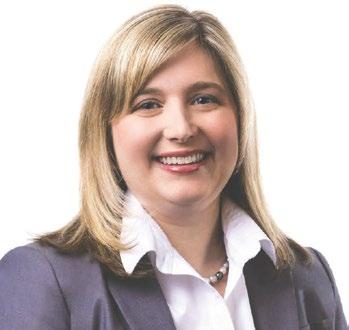
Biggest career challenge: The latest challenge I’ve undertaken is rejoining Morningstar to help build and lead our new practice group focused on government investigations, negotiation, and litigation.
Advice to aspiring attorneys: I often tell people who are thinking about a legal career to take lots of good literature and history courses in high school and college. The skills and habits I learned in those courses are the ones I use most frequently as a lawyer and legal counselor.
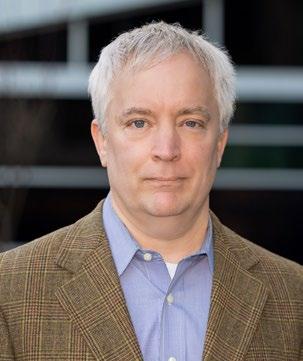
Childhood goal: I wanted to be a pro athlete and private detective. My plan was to play major league baseball for the Atlanta Braves and be a private detective in the off-season. It hasn’t worked out yet, but there’s still time.
Favorite vacation spot: Ocracoke. There is nowhere more chill.
A month off: I’d love to hang out with my family and work on my new hobby of drumming.
You didn’t know: Since I was 3 years old, I’ve wanted to have a drum set and learn how to play. But I never did it until earlier this year, when my wife got me a drum set as a birthday present. Also, Janet Reno, the former United States Attorney General, was my cousin. She had a huge influence on my decision to become a lawyer and my approach to being a lawyer.
44 May 2023 | NORTH CAROLINA LAWYERS WEEKLY
Congratulations to Susan Jackson for being named a Leader in Law! Susan Jackson helps clients obtain and protect their patents and trademarks and has mentored and developed the next generation of Intellectual Property attorneys while leading Nelson Mullins Riley & Scarborough LLP’s Charlotte office. One Wells Fargo Center 301 South College Street 23rd Floor Charlotte, NC 28202 | 704.417.3000 Nelson Mullins Riley & Scarborough LLP Attorneys and Counselors at Law nelsonmullins.com | T: 404.322.6000
New associations
Former Superior Court Judge Drew Heath , focusing his practice on government relations and civil litigation, and health care attorney Knicole Emanuel have joined Nelson Mullins in Raleigh.
Donald Pocock has joined the Winston Salem office of Akerman as a partner in the litigation group.
Kelli Sanders has joined Barnwell, Whaley, Patterson & Helms as the chief operating officer. Based in the Charleston, South Carolina office, she leads all firm operations.
The Raleigh office of Ragsdale Liggett has added Elizabeth H. Overmann as a partner in the civil litigation group, where she utilizes her expertise in trucking, personal and catastrophic injury, construction, premises and product liability.
Three new attorneys have joined Smith Anderson in Raleigh: Chase Parker , an attorney in the litigation group, will focus on asbestos and toxic torts, as well as other environmental exposure cases; Peter “PJ” Cline focuses his practice on tax, private equity and fund formation matters; and Tess Rogers is a member of the real estate development and litigation practice groups.
Michele P. Lee has joined the Greensboro office of Ellis & Winters. A member of the firm’s litigation group, she concentrates her practice on fiduciary litigation, guardianship of minors and adults, and power of attorney disputes.
As part of an expansion of Womble, Bond, Dickinson’s patent prosecution and litigation practice, Lisa Moyles has joined the Raleigh office as a partner, counseling clients at every stage of the protection lifecycle.
Jennifer Fant has joined Cranfill Sumner’s Charlotte office as a paralegal.
Emma B. McEvoy has become a trial attorney with Riddle & Brantley, where she focuses her practice on personal injury cases, car and truck accident
lawsuits, and workers’ compensation claims.
Maynard Nexsen added two new attorneys in North Carolina: registered patent attorney Vanessa Perez-Ramos in the Charlotte office, and Lindsey B. Nelson , a labor and employment attorney, in the Raleigh office.
Law firms
The merger of Maynard, Cooper & Gale and Nexsen Pruet is complete, with the creation of a national firm now known as Maynard Nexsen . The firm has offices in Charlotte, Greensboro and Raleigh, as well as Washington, D.C.
Dempsey Law Group has merged with Fox Rothschild, with Kelly Tillotson Dempsey joining Fox as a partner in the Charlotte office. She represents clients as they create families through agency compliance, assisted reproductive technology, and domestic and international adoptions.
Promotions
Six lawyers have been appointed as diversity and inclusion partners at Shumaker, including Christina Davidson Trimmer, a partner in the Charlotte office.
Honors
Moore & Van Allen was recognized as a Global Competition Review 2023 Behavioural Matter of the Year –Americas award winner. The firm received the award for securing complete acquittals in a high-profile U.S. Department of Justice criminal antitrust prosecution of executives in the chicken industry. Attorneys on the winning trial team include J ohn A. Fagg Jr., Frank E. Schall, James P. McLoughlin Jr., Kaitlin M. Price, Catherine R. Prater, Katherine Clarke McDiarmid, Fielding E. Huseth and
Alexis T. Narducci.
Mike McIntyre of Ward & Smith will receive an honorary Doctor of Laws degree from the University of North Carolina at Chapel Hill at its spring commencement ceremony. McIntyre is a UNC-Chapel Hill alum.
The American Bar Association’s Section of Litigation has awarded Baker Donelson the 2023 John Minor Wisdom Public Service and Professionalism Award. In addition to its global pro bono work, the firm was recognized for creating Free Legal Answers in 2010 and its efforts to provide access to legal representation for those experiencing homelessness. FLA is a website on which anyone can receive pro bono legal advice from a volunteer lawyer.
Joseph J. “Jack” Santaniello has been named a 2023 Legal Eagle by Franchise Times Magazine. Santaniello, a partner at Shumaker in Charlotte, is known for his work in mergers and acquisitions, general corporate and commercial transactional matters, and franchise, distribution and licensing law, as well as copyright and federal and state trademark matters.
Professional groups
On July 1, Jennifer Csik Hutchens will join the board of directors of the American Health Law Association. A partner at Bryan, Cave, Leighton, Paisner in Charlotte, where she serves as the global head of the firm’s health care practice, Hutchens is one of only three health care law practitioners nationally to be appointed to the AHLA board.
Ashley S. Rusher , an attorney with Blanco Tackabery in Winston Salem, has been named a fellow in the American College of Bankruptcy. One of 17 North Carolina attorneys inducted into the college in its 34 years, she concentrates her practice in bankruptcy and creditor’s rights, outside general counsel service, and title curative litigation.
NORTH CAROLINA LAWYERS WEEKLY | May 2023 45 LAWYERS IN THE NEWS
A conversation with Justice Richard Dietz
“You’re not going to believe this,” Justice Richard Dietz recalls telling his former colleagues. “It’s true: They really are busy.”
Before joining the North Carolina Supreme Court this year, Dietz and his colleagues on the Court of Appeals all wondered one thing: What could the seven justices on the state’s high court possibly be doing all day? In their mind, the Supreme Court simply didn’t take that many cases compared to the Court of Appeals. It didn’t make sense.
But now that he’s a justice himself, Dietz understands all too well the stresses placed on the Supreme Court.
In a wide-ranging interview in his chambers, Dietz explains that the Supreme Court must actually do more with less. There’s no office of staff counsel to help with the work. Instead, there are “seven people who all have to be involved in every decision,” he says.
That includes a constant flow of petitions. On top of that, the chief justice needs help with administration of justice work. He often requests help from the associate justices on various committees, and recently appointed Dietz as chair of the Equal Access to Justice Commission.
Dietz has an “affinity” for the Court of Appeals. He served on that court for more than twice as long as the other justices combined. But during the interview, Dietz says he’s been concerned over recent discussions about eliminating the right of appeal to the Supreme Court based on a dissenting opinion at the Court of Appeals. North Carolina is one of the few states to have such a procedure.
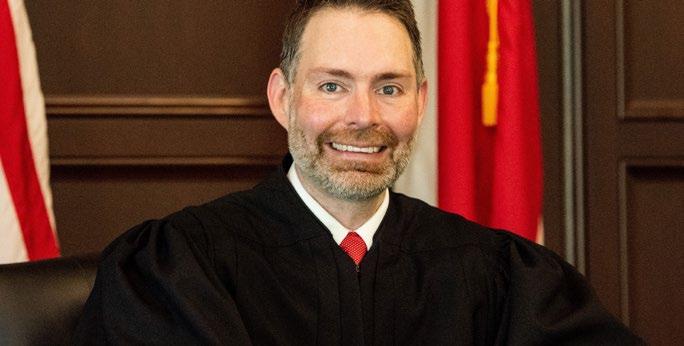
He knows the “frustration” that the Supreme Court has had with this proce-
dure in the past. The Supreme Court hasn’t liked that some Court of Appeals judges would use the dissent to “force” the Supreme Court to take a case. Dietz has joked with his former colleagues that what if instead of a dissent creating a right of appeal to the Supreme Court it instead created a right to an en banc rehearing at the Court of Appeals. That would make appellate judges think twice before imposing extra work on their colleagues.
Not all dissents are created equally, Dietz notes. A proper dissent, he says, is a “genuine disagreement with your colleagues about some area of the law where reasonable jurists can disagree.”
Improper dissents are ones that just disagree with existing law, and the Supreme Court has begun rejecting appeals based on these separate opinions that “aren’t really dissents.”
That said, Dietz sees value in the dissent-based appeal right. He has shared fears with his former colleagues that if they abuse the system, “then there is a risk of exactly what we’ve heard people propose now, which is to eliminate it.”
Dietz has seen an “explosion” in dissents at the Court of Appeals in the past five years, and he’s trying to figure out why through an empirical, regression analysis. One hypothesis relates to turnover. From 2013 to 2022, the average tenure of a

Court of Appeals judge was nine years. But by the end of 2022, that figure was down to less than four.
But he has other theories he wants to test, too. During that same time, elections for Court of Appeals judges had been made partisan. And then there was the pandemic, which separated colleagues from face-to-face contact and could have harmed collegiality at the court.
Whatever the cause, he wants to improve collegiality.
“I’m so proud of our appellate courts that I just want to do everything we can to help that,” he says.
Talk about collegiality isn’t just limited to the Court of Appeals, though. In 2021 and 2022, the Supreme Court issued a spate of controversial 4-3 decisions in politically charged cases. When partisan control of the court flipped after the last general election, the new court composition reconsidered and overturned some of those recent decisions, which brought its own wave of controversy. Some question whether the court has become too embroiled in political controversies.
Still, Dietz is feeling “extremely optimistic” about the court’s future.
“During the campaign, I was starting to feel a little down because the politics are so negative,” he says.
Since starting at the court, he says his
46 May 2023 | NORTH CAROLINA LAWYERS WEEKLY COMMENTARY
Shelton
B y t
s H
N
North Carolina Supreme Court Associate Justice Richard Dietz. Photo by SPICE.
roy
elto
experience has been “refreshing.”
“Although we are dealing with some issues that have a political dimension, the court feels like such an honest place that’s trying to do justice,” he says.
The court’s conferences are held in private, but Dietz wishes he could share those experiences with the public.
“I think it would reassure them that the Supreme Court is doing what it should be doing, which is really trying to be this steward of the law for our state and not being political,” he says.
Dietz also offers some guidance for attorneys on the other way cases usually end up at the Supreme Court: the petition for discretionary review. Anyone who’s practiced in North Carolina for long knows that there are many strands of conflicting case law from the Court of Appeals.

That problem is understandable: “The volume of cases is just so high that things get missed,” he says, adding that he wishes the Court of Appeals would use its en banc process to clean that up.
The next best solution is discretionary review at the Supreme Court.
“That’s one of the things that we’re really attuned to right now,” he says. “We don’t want there to be conflicts in the Court of Appeals.”
For that reason, practitioners seeking Supreme Court review should think of the petition process “much the same way as a
circuit split at the Supreme Court of the United States,” Dietz says, referring to that court’s certiorari process.
Show us the conflict, says Dietz, and the “chaos it’s causing with lower courts. [Since it’s the Supreme Court’s] responsibility to say what the law is and resolve those conflicts, pointing that out to us is powerful.”
Dietz also hopes to help the court improve.
“There were a lot of changes at the Court of Appeals that came because after I got comfortable, I started asking questions, like ‘Why do we do it this way?’”
Dietz brought welcome changes, such as a switch from the faux-typewriter font of Courier in the court’s opinions to the more elegant Century Schoolbook, which the U.S. Supreme Court uses. He also pushed for transparency in petition panels.
Dietz plans to follow a similar playbook for the Supreme Court: Settle in, then start asking questions. He’s already interested in making the high court more transparent, like the U.S. Supreme Court and 4th Circuit.
“For us, it’s so secretive,” he says. “And my understanding is that it’s tradition that the court has been very secretive. But my question is why? If there’s a good reason for it, I can respect that. But if the reason is just ‘we’ve always done it this way,’ that to me is not a reason.”
Dietz aspires to “an internal operating
procedures manual that we can share with the public.”
During the interview, I scan his chambers. The bookshelves are full — and science fiction novels are prominent.
“The thing I like about science fiction,” he says after showing me a first edition “Dune” novel, “is that it’s a way to have tough conversations by putting things in a different setting and allowing you to confront a lot of really difficult topics.”
For Dietz, those tough conversations are an important part of what happens within chambers.
“It’s a big deal for me to have chambers where we can really be a little idea factory,” he says.
That requires clerks who can write well and keep up with the justice. But it doesn’t mean clerks telling you what you want to hear. Elected as a Republican, Dietz has two liberal clerks, including one who listed as a hobby on her resume “Elizabeth Warren for President volunteer.” Dietz hired her because she’s a great writer, and that, he says, is something “that makes my life easier.”
For now, Dietz is just ramping up. Time will tell what Dietz can accomplish with his new colleagues. •
Troy Shelton is an appellate partner in Raleigh at Fox Rothschild. He partners with trial attorneys to win on appeal in state and federal courts.
NORTH CAROLINA LAWYERS WEEKLY | May 2023 47 COMMENTARY
North Carolina Supreme Court. Photo courtesy of North Carolina Judicial Branch.
The sun sets on a takings clause claim
B y a lexis N arducci
An important question when asserting a constitutional claim against a government is when to file the claim, especially when the filing may have consequences for the plaintiff’s ongoing relations with the government or might result in government action to derail a project or practice.
Further, there is often the desire to wait until the injury has actually occurred to plead a tangible injury with specific and incurred losses to avoid a claim of speculative injury.
However, the March 23 decision of the 4th Circuit is a reminder that time and certainty are often luxuries that are not available in lawsuits challenging government policies or practices.
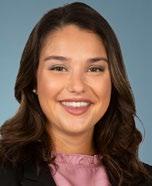
In Epcon Homestead, LLC v. Town of Chapel Hill , the 4th Circuit affirmed the District Court’s denial of Epcon Homestead’s six-figure claim against the town of Chapel Hill because Epcon failed to bring suit within the applicable statute of limitations. The case re-establishes that a 42 U.S.C. §1983 claim challenging the constitutionality of a land use condition under the Takings Clause accrues when the plaintiff knows, or has reason to know, of the injury and not when the injury is fully felt.
Epcon, a housing developer, made a payment of $803,250 to the town under its Inclusionary Zoning Ordinance. In June 2010, the town had enacted the Inclusionary Zoning Ordinance to meet its goal of preserving and promoting a culturally and economically diverse population.
The ordinance requires owners to set aside a certain number of affordable housing units for low-income households at below market prices in all development projects. In the alternative, an owner may pay the town a fee per unit, with the fee used for affordable housing.
In 2014, Epcon’s predecessors in interest submitted and received a special use permit for a development. The permit permitted Epcon to make the fee payment in lieu of setting aside units for affordable housing under the Inclusionary Zoning Ordinance. The fee totaled $803,250, made payable to the town in pro rata payments.
Following approval of the special use permit, Epcon acquired the real property and began the project in 2015.
Epcon made its final fee payment on March 20, 2019. On October 24, 2019, Epcon filed suit, seeking return of the $803,250, plus interest and attorneys’ fees.
The town argued Epcon’s state and federal claims were barred by a three-year statute of limitations. Section 1983 does not contain a statute of limitations, so federal courts borrow the statute of limitations from the most analogous state law cause of action. Owens v. Balt. City State’s Att’y’s Off., 767 F.3d 379, 388 (4th Cir. 2014).
The most analogous North Carolina statute of limitations has been held to be N.C. Gen. Stat. §1-52(5), which applies to any action for an injury to the person or rights of another, not arising on contract and not otherwise enumerated in the general statutes. Nat’l Advert.
Co. v.
City of Raleigh, 947 F.2d 1158, 1161-62 (4th Cir. 1991).
In support of its statute of limitations argument, the town maintained the issuance of the October 2014 special use permit triggered the statute of limitations because the permit was conditioned on Epcon’s commitment to pay the fee. Thus, the town argued the statute of limitations period for the claim expired in October 2017.
Epcon argued the limitations period did not start until it began making the fee payments in July 2017 because those payments began the tangible intrusion on its constitutional right. Accordingly, Epcon maintained it brought a timely action within the three-year statute of limitations period.
Relying on National Advertising Company v. City of Raleigh and Halle Development, Inc. v. Anne Arundel County, the 4th Circuit panel concluded the §1983 Takings Clause claim began accruing when the town issued Epcon’s special use permit.
In National Advertising Company, the court found an advertiser’s claim began accruing upon enaction of an ordinance and not when the grace period ended five years later. 947 F.2d at 1160-61 (4th Cir. 1991).
In Halle Development , the court held a developer’s claim began accruing when the county provided notice that it would not provide fee credits in exchange for the develop-
48 May 2023 | NORTH CAROLINA LAWYERS WEEKLY COMMENTARY
Narducci
er’s conveyance. 121 F. App’x 504, 505 (4th Cir. 2005) (unpublished).
Similarly, the 4th Circuit here found that upon issuance of the special use permit, Epcon knew or had reason to know of the imminent payments giving rise to injury; thus, the court held Epcon’s Taking Clause claim began accruing at that time.
In an alternative argument, Epcon asserted its complaint did not allege a regulatory taking, but rather alleged an unlawful exaction. Epcon argued the claim did not accrue upon issuance of the special use permit because the exaction could not occur unless and until Epcon actually changed the use of the property to the use approved in the special use permit, and Epcon had the option not to go forward with the newly permitted use.
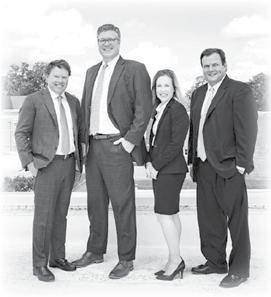
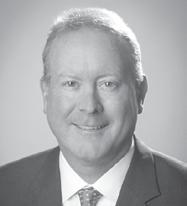
That argument did not sway the court: “The fact that the special use permit did not require and simply permitted Epcon to develop the land for the use described in the application (subject to the condi-
tion at issue) is hardly noteworthy … when Epcon learned of the special use permit condition on its recently acquired land, its takings claim become actionable.”
Finally, Epcon argued that under the continuing wrong doctrine, each payment constituted a “continuing wrong” that tolled the statute of limitations. Because state rules on tolling apply when a state statute of limitations is borrowed in a federal questions case, the 4th Circuit turned to North Carolina law on the continuing wrong doctrine. North Carolina law states that for each unlawful act, the applicable limitations period starts anew. Under Epcon’s theory, that would mean that the statute of limitations period started over with each payment Epcon made to the town.
The court found Epcon conflated its state and federal law claims, ruling that Epcon’s state law claim is arguably the unlawful fee payments exacted, but the issuance of the special use permit inflicted the
§1983 injury; therefore, the federal cause of action occurred prior to when Epcon actually paid the fee installments.
The 4th Circuit dismissed Epcon’s 42 U.S.C. §1983 Takings Clause claim. The court also declined supplemental jurisdiction and dismissed the state law claims without prejudice, so Epcon can refile its claim in state court.

In dismissing these claims, the 4th Circuit warns plaintiffs who wish to file a Takings Clause claim that they must calculate the relevant statute of limitations period when the clock begins to tick upon the plaintiff’s knowledge of the injury.
The decision is reported at Epcon Homestead, LLC v. Town of Chapel Hill, 62 F.4th 882 (4th Cir. 2023). • Alexis Narducci practices at Moore & Van Allen, where she represents clients in a variety of litigation matters, government and corporate investigations, and financial services matters.

NORTH CAROLINA LAWYERS WEEKLY | May 2023 49 COMMENTARY
John P. Marshall COMMERCIAL & CONSTRUCTION LITIGATION 106 S. McLewean Street P.O. Box 3169 Kinston, NC 28502-3169 252.527.8000 x245 Fax: 252.527.8128 jmarshall@whiteandallen.com Serving Eastern NC 252.633.1930 • www.olivercheek.com Tough Times Require Trusted Lawyers • All Chapters of Bankruptcy • Alternatives to Bankruptcies • Receiverships LAWYER TO LAWYER / Directory
Annual ‘Leaders in Law’ event celebrates excellence
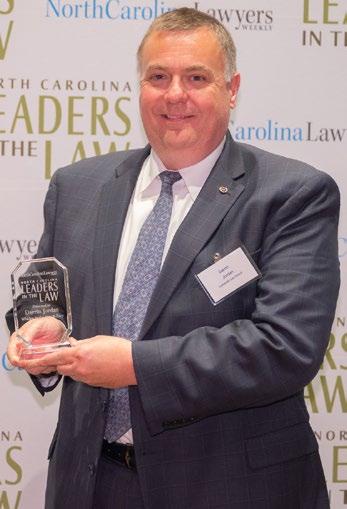
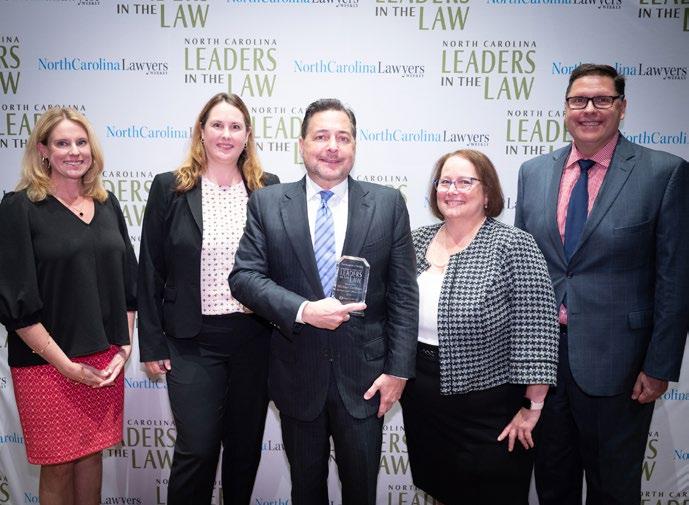

North Carolina Lawyers Weekly’s 2023 class of “Leaders in the Law” was honored at an April 20 event. Colleagues, friends
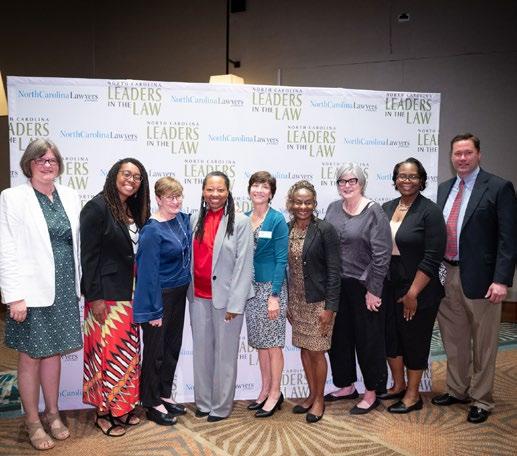
and family came out to celebrate the honorees and their work at the awards program held in Raleigh, where this year’s
“Lawyer of the Year,” Susan S. Jackson of Nelson, Mullins, Riley & Scarborough, was announced.
50 May 2023 | NORTH CAROLINA LAWYERS WEEKLY EVENT
Virginia Knowlton Marcus (center, in blue sweater) of Disability Rights North Carolina, joined by her colleagues
North Carolina Lawyers Weekly Publisher Susan A. Bocamazo kicks off the program
Michael A. DeMayo of DeMayo Law Offices, with his colleagues
Darrin D. Jordan of Whitley, Jordan, Inge & Rary

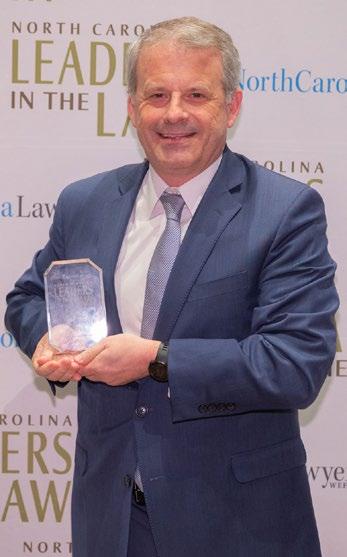
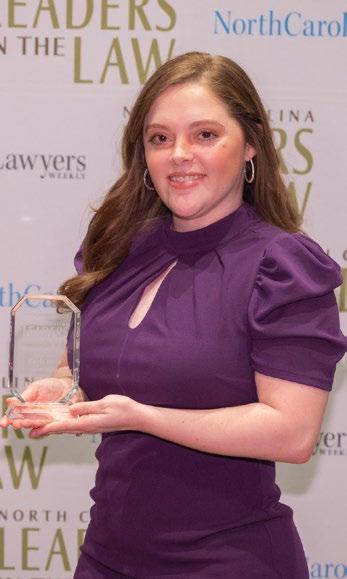
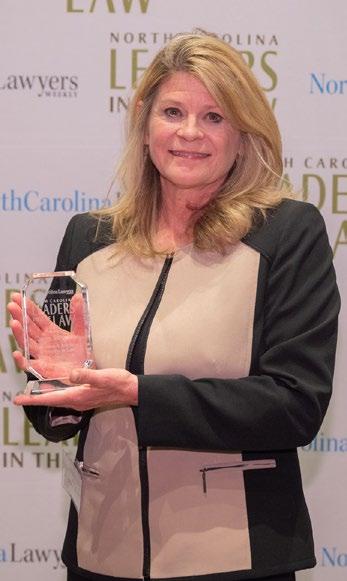
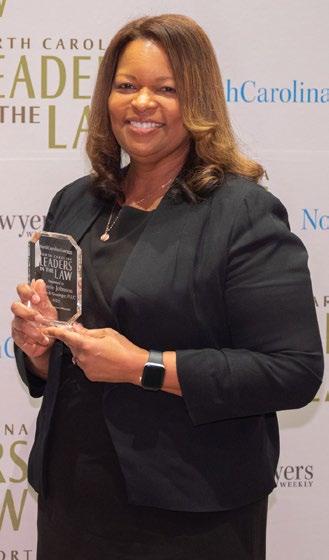
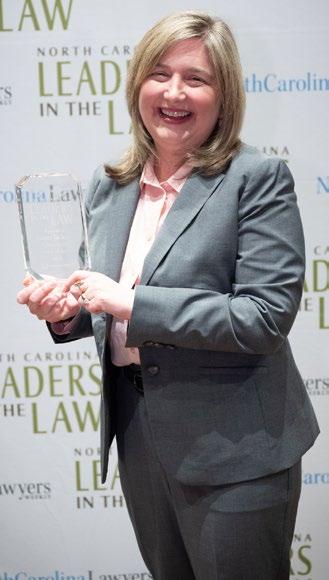
NORTH CAROLINA LAWYERS WEEKLY | May 2023 51 EVENT
David W. Sar of Brooks, Pierce, McLendon, Humphrey & Leonard
Kayla D. Britt of the North Carolina Department of Justice
Ryan D. Bolick of Cranfill Sumner
Valerie A. Johnson of Johnson & Groninger
Caryn L. Brzykcy of Harbison & Brzykcy
2023 Lawyer of the Year Susan S. Jackson of Nelson, Mullins, Riley & Scarborough
Publication of North Carolina Lawyers Weekly and South Carolina Lawyers Weekly


ACCESSING J USTICE
MAY 2023
New Legal Support Center responds to concerns raised in UNC-G’s Legal Needs Assessment study
n BY TERI SAYLOR
Navigating the court system can be daunting for people who are neither legal professionals nor able to pay for an attorney.
But in North Carolina, getting help is a little easier these days at the new Wake County Legal Support Center, which opened last January.
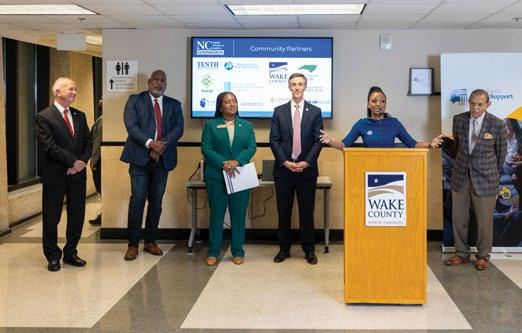
At its ribbon-cutting ceremony January 13, Chief N.C. Supreme Court Justice Paul Newby described the need to provide assistance and tools for lower income people to have access to justice when they can’t a ord an attorney. e Legal Support Center lls that role.
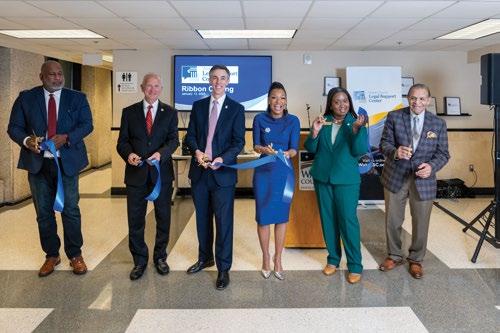
“To have a resource like this to help individuals in situations where it is generally pretty emotionally charged to help them navigate, not just the physical location but certainly the challenges of a lay person encountering the legal world, it is vital to the citizens of Wake County,” he said.
On a spring morning in April, a line of people had formed outside the Legal Support Center, housed just o the lobby in the Wake County Courthouse. Inside, a four-person sta prepared for a busy day.
e Center is open from 9 a.m. until 1 p.m. and during those four hours, the team would help at least 30 people with civil law issues ranging from family law matters to landlord-tenant disputes. ey would provide information about how the legal system works, describe relevant laws, explain what people can expect throughout the legal process, what deadlines might apply, and answer a myriad of questions.
If that sounds daunting, it is just business as usual for the county’s newest e orts to help people access justice.
e Legal Support Center is a partnership with Wake County government, the Wake County Bar
Association, the North Carolina Judicial Branch, the N.C. Equal Access to Justice Commission and the City of Raleigh.
For years, Wake County District Judge Ashleigh Parker Dunston had been exploring the idea of establishing a self-help legal services center like the SelfServe Center in the Mecklenburg County Courthouse that has been in place for 24 years. Her desire was strong, but there were roadblocks.
“ e issue was one of sustainability due to the lack of funding, so creating a legal support service was not possible at that time,” she said in a recent Zoom interview.
But a er the University of North Carolina at Greensboro released its comprehensive 2021 North Carolina Legal Needs Assessment, Dunston’s idea became a mission.
“ e report absolutely demonstrated exactly what we saw, which was the acute need for legal
52 May 2023 | NORTH CAROLINA LAWYERS WEEKLY
A
District Court Judge Ashleigh Parker Dunston speaks at the ribbon cutting for the Wake County Legal Support Center on Jan. 13. From left: N.C. Supreme Court Chief Justice Paul Newby, Wake County Manager David Ellis, Wake County Commissioners Chair Shinica Thomas, Commissioner Matt Calabria, Dunston, Commissioner James West. Photos courtesy of Wake County Government.
Judges and Wake County commissioners cut the ribbon on the new Wake County Legal Support Center on Jan. 13. From left: N.C. Supreme Court
Chief Justice Paul Newby, Wake County Manager David Ellis, Wake County Commissioners Chair Shinica Thomas and Matt Calabria, District Court Judge Ashleigh Parker Duston and Commissioner James West.
services across the state for people who are unable to a ord them,” said Dunston, who served on the Legal Needs Assessment Steering Committee. It was the rst North Carolina assessment in almost 20 years.
e study showed that over 70% of low-income families encounter at least one legal issue a year with 91% of those families listing cost as a top barrier.
Legal Aid is overwhelmed












With its 23 o ces and 500 sta across the state, Legal Aid of North Carolina helps thousands of low-income victims of abuse, families facing homelessness and others in crisis gain access to housing, education, healthcare, employment, and other safety essentials.
According to statistics provided by Legal Aid of North Carolina, 25% of the state’s population struggles to make ends meet, and in three-quarters of civil cases, at least one party is not repre-

sented by an attorney.
Even with its statewide reach, Legal Aid can’t help everyone. e 2021 Assessment showed that need has outpaced resources over the past two decades.
“Some people don’t meet the low-income requirements, or people want to represent themselves because they don’t trust the system,” Dunston said. “We have always known that there are obvious barriers, and the Legal Needs Assessment was able to statistically prove that was true.”
e Legal Needs Assessment came about in 2020, when UNC Greensboro’s Center for Housing and Community Studies partnered with the N.C. Equal Access to Justice Commission and the Equal Justice Alliance to study the scope of need in North Carolina and the factors a ecting the depth and types of civil legal problems people experience.
e study showed that family law, immigration, and housing are the most underserved practice ar-






eas. Poverty drives a large percentage of this need. For Dunston, these results were all she needed to continue seeking support for ways the court system could help.
“In 2022, we began meeting with the Wake County Commissioners and Chief Justice Newby about creating a Wake County Legal Support Center, and that’s how it started,” she said.
Serving hundreds of people
Since the Center opened on January 9, over 1,400 people have received services. e Center is open four hours a day, 5 days a week, and serves an average of 30 people each day.
For visitors to the Center, access is easy. e o ce is clearly visible in the main lobby of the Wake County Courthouse and o ers a welcoming environment. Its centerpiece is a repurposed magistrate’s bench, and beyond that, lies a bright,




NORTH CAROLINA LAWYERS WEEKLY | May 2023 53
53 MAY 2023 CAROLINA PARALEGAL NEWS S ee JUSTICE Page 54 LM APP Now available on your smartphone LM PORTAL Log-in from the LM website and manage your policy ON DEMAND CLE Get CLE when and where you want NEW MEMBER BENEFITS. ADDED VALUE. • Pay your bill online • Get a Declaration Page • Confirmation of insurance • Make policy changes • Add attorneys/remove attorneys • All the conveniences of the portal - on the go! • Manage your account and make changes to your policy • Download the app on your iPhone or Android device - Lawyers Mutual NC in the app store • Get CLE hours on your time, and wherever you want • FREE for Insured attorneys and paralegals/staff • Choose the topics relevant to your practice 919.677.8900 800.662.8843 www.lawyersmutualnc.com LIABILITY INSURANCE COMPANY OF NORTH CAROLINA LAWYER S MU TUAL
JUSTICE / New center addresses concerns
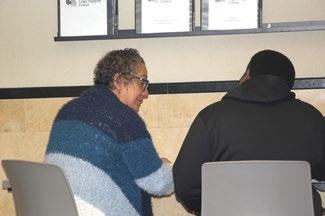
spacious room, with rows of carrels holding laptop computers. A private conference room sits next to the main facility.
One thing is clear - clients do not receive legal services or legal advice at the Center. Rather, they can get information about their issues and learn how to navigate the justice system, said Anh LyJordan, the Center’s program director.
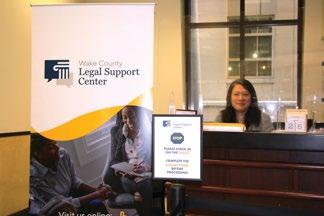
“We do help people get to the heart of their problems, and in some cases, we learn that their issues may not need resolution through the law, and they can nd answers from various agencies and nonpro ts in the area,” said LyJordan, who is also a sta attorney with the North Carolina Pro Bono Resource Center.
Program coordinator S.M. Kernodle-Hodges enjoys the simple acts of making people’s lives easier and empowering people to solve their own problems.
“It feels great to see the impact of our interactions with clients when we are able to help them resolve their hardships,” she said. “While we are limited in the scope of what we can do, sometimes it’s just the little things, like printing out documents, doing international mailings, and referring them to agencies that can help.”
e Center also depends on a myriad of volunteers ranging from pro bono paralegals, to volunteer attorneys and law students from Campbell University and UNC.
e students’ work at the Legal Support Center teaches them real life lessons, and Dunston says the Campbell Law students have already provided over 60 volunteer hours since the Center opened.
Campbell Law School Dean J. Rich Leonard is a “huge believer in experiential education,” he says, and he is convinced there’s no better way for students to gain experience than by volunteering at places like legal clinics and the Legal Support Center.
“I’ve tried to grow our experiential education signi cantly since I have been here, but the need is enormous,” he said as he sat in his o ce on the Campbell Law School building.
“A student’s ability to sit with a client, listen to them carefully, understand what they are saying,
and telling them in plain language what their rights are and what might happen in their case is a huge skillset..
Volunteering in the clinics also gets students excited about practicing law.

Study examines need for legal services


In 2021, the South Carolina Access to Justice Commission, the South Carolina Bar, and the Nelson Mullins Riley & Scarborough Center on Professionalism at the USC School of Law partnered with the UNCG Center for Housing and Community Studies to perform a legal needs assessment in South Carolina.
e ndings were similar to those in North Carolina.
In addition to concerns about cost, o en people don’t realize there may be legal remedies for their problems, or they may not realize they have legal rights, and the lack of knowledge of available resources is also a major obstacle, said Bruce Rich, director of the UNCG Center for Housing and Community Studies.
South Carolina Legal Services has nine o ces across the state. Charleston is a hub for services, including the South Carolina Legal Aid O ce, Charleston Pro Bono Legal Services and Charleston Legal Access, but in the rural areas of the state, resources are not as convenient.
“People may not know that free or low-cost legal help is available or even if they know, they have no idea where to look,” he said. “ e study
found that in both states, for some people, particularly in rural communities, o en the distance to get to a legal services lawyer can be 50 or 100 miles.”
Despite reports that there are too many lives in crisis and too many people needing civil legal services for the meager legal resources to handle, Rich pointed to a glimmer of hope and good news. e Justice System is paying attention.
“ e Access to Justice Commissions in both North Carolina and South Carolina, which are created by their respective Supreme Courts are using these studies to marshal tremendous resourc-
es in the legal community, local governments, legislators and philanthropic organizations,” he said. “ eir voice of support is very powerful.”
In North Carolina, the proof is in the number of people already receiving help in Raleigh.
Since its opening, the Wake County Legal Ser-


54 May 2023 | NORTH CAROLINA LAWYERS WEEKLY
n Continued from Page 53 S ee JUSTICE Page 58 54 MAY 2023 CAROLINA PARALEGAL NEWS
Program coordinator S.M. Kernodle-Hodges helps a client complete paperwork at the Wake County Legal Support Center.
Wake County Legal Support Center clerk Julissa Corporan consults with a client
Wake County Legal Support Center director Anh LyJordan greets visitors at the repurposed magistrate's bench that serves as the Center's front desk.








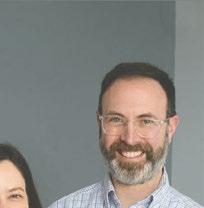









LeGrand finds joy in helping others succeed

Charleston native Cheryl LeGrand is so passionate about her local Guardian ad Litem program, she even has a long-term goal to volunteer full-time in the eld a er she retires.
LeGrand is a paralegal at Haynsworth Sinkler Boyd in Charleston, where she works with civil and defense litigation cases, including personal injury, dram shop litigation, employment and defamation.
“I have also worked in other legal areas in the past, including workers’ compensation, construction defects, residential real estate, trucking and even a little probate and estate law,” she says.

She studied business at Mans eld Business College and in 2020, she completed a paralegal certi cate course at the University of South Carolina.
Career path: I chose the paralegal career path because I nd this type of work so interesting and rewarding. I am intrigued by the details and preparation involved in investigating the facts of a case and determining the best possible outcome for all parties. I have been watching online trials in recent years and nd them interesting and exciting. I also love taking continuing legal education courses not only in this eld, but just about any area.


What motivates me: I feel blessed to work
n Eileen Schnur elected vice president of RALLA
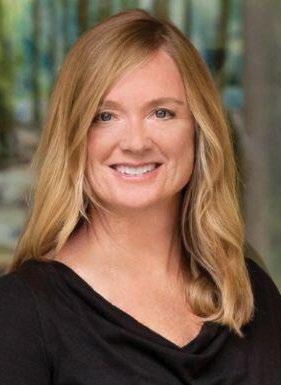
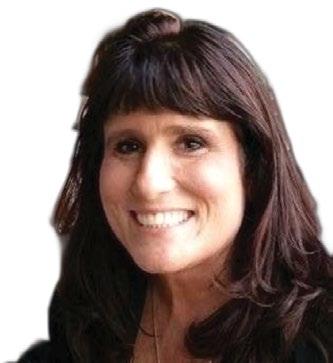
Eileen Schnur, Ward and Smith’s library and research services manager, has been elected vice president of the Raleigh Area Law Librarians Association. RALLA represents professional law librarians from Raleigh and surrounding areas. is organization fosters collaboration among its members and engages them in career-focused professional development opportunities.
Drawing from her background in library
with the best attorneys in the Charleston area and in such an interesting eld. I enjoy being part of a team and helping attorneys succeed in obtaining the best results and outcomes for their clients. I also love to learn, and there is no lack of educational opportunities in this line of work. I am the person that gets excited about the successes of others, and you can o en hear me “woo-hooing” upon receipt of good news. It is a satisfactory feeling to know I play a role in working for the common good.
My job: e question “if there is a such thing as a typical day” pretty much says it all. e work and technology are constantly changing. I focus on helping our litigation team make sure all we meet all deadlines, and I concentrate on pristine case management and organization.
Time management tips: Reviewing all correspondence in detail and making notes of what needs to be done. I create and use a lot of indexes and charts. I use technology to track tasks and create follow-up reminders. I also try to be exible to best serve our attorneys and clients because on some days priorities can change quickly. e keys are focus, attention to detail, and willingness to serve.
Advice to teenaged self: Keep grounded in
& information science, Schnur focuses on ensuring that the rm's legal researchers have access to cutting-edge resources and innovative technology.
n Ward and Smith announces interns for spring term
Ward and Smith recently welcomed the newest cohort of interns for the third installment of its Sta Internship Program, which was launched in 2021 to promote diversity, equity, and inclusion in the legal
the goal to be the best you can be. Stay focused, be yourself, stay on the narrow path, and practice positive thinking.
When I’m not at work: I enjoy spending time with my miniature dachshunds. I love working decorating my home, doing yardwork, gardening, spinning, reading, volunteering in community and church, walking in scenic areas, and trying di erent recipes for church and other special events.
eld by collaborating with local high schools and community colleges. is year's 2023 class: Victoria Blount, paralegal intern and Emma Schemerhorn, o ce services
56 May 2023 | NORTH CAROLINA LAWYERS WEEKLY
56 MAY 2023 CAROLINA PARALEGAL NEWS
LeGrand
LeGrand
Q&A:
CAROLINA PARALEGAL NEWS BRIEFS
Schnur
Eason’s life in the law a dream realized
Jennifer Eason has always been fascinated with law and justice, and in her role as paralegal, she is living her dream.
A lifelong resident of Durham, Jennifer Eason earned bachelor’s degrees in psychology and American studies at UNC-Chapel Hill. As a student, she worked an internship with the Durham County District Attorney’s o ce, which cemented her lifelong interest in law and shaped her ambition to pursue a career as a paralegal.

A er graduating from college, she landed a job at Smith Debnam and attended Durham Technical Community College where she received her associate degree in applied science, focusing on paralegal technology. She also served as a Durham County Guardian Ad Litem and experienced rsthand the rewards that come along with using law to help others.
“Volunteering as a Guardian Ad Litem allowed me to advocate for abused and neglected children,” she said. “It was rewarding to stand up for those who didn’t have a voice.
A er becoming a certi ed paralegal through NALA, Eason was promoted to assistant paralegal supervisor at Smith Debnam, and she credits that role with giving her management experience.
In 2016, she joined Allscripts Healthcare. In 2022, when Allscripts sold its Hospitals and Large Physician Practices business segment to the Harris Corporation and rebranded it as Altera,
Eason was promoted to senior paralegal.
She has served on the board of the Raleigh-Wake Paralegal Association since 2013.
Career choice: As a child I enjoyed watching television shows involving court hearings and investigations. I currently focus on medical so ware contracting. I enjoy this job because I know the so ware provided by our company helps the doctors and hospitals give their patients the best care possible. Our motto at Altera is “Ascending to a new era of healthcare”. Our company embraces the concept of teamwork and being willing to help others, whether in the workplace, or by donating time to help others in our communities. I enjoy being a part of a work environment that truly cares about others.
Source of pride: From a personal standpoint, I am proud of my family, my husband and our sons Asher, 7, and Jackson, 5. Without a doubt, being a mother is my biggest accomplishment. Professionally, I am most proud I pursued my goals to become a legal professional and I really enjoying what I do each day.
You didn’t know: Paralegals must be willing to multi-task, be organized and exible. One second, I may need to be on a call and the next I’m being asked to dra a contract that is deemed urgent and needs to be nalized ASAP.
Childhood goals: I wanted to either be a
teacher or to work with the law in some form or fashion.
Relaxation strategies: I enjoy exercising. I like to ride my Peloton bike and go for walks. Being in nature is always a good de-stressor for me. It allows me to slow down and be thankful for what is around me. I am also a Believer, so praying is a way for me to de-stress, focus, let things go, and give them to God.
Favorite vacation spots: Jamaica, England, and France. I enjoy traveling and learning about the di erent cultures and the food
CAROLINA PARALEGAL NEWS BRIEFS




Traci B. Wolfe, president; Meredith Lazarski, president-elect; Cassandra Furtick, functional director of membership and marketing; Ann Marie Minerva, functional director of certification and education; Stephanie A. Jones, secretary; Tara Jean Brown, treasurer and Katherine R. Helms, immediate past president.
assistant intern, Greenville; Ginger Jones, paralegal intern and Catherine Everett, o ce services assistant intern, New Bern; Tamara Burton, paralegal intern, Raleigh; Jessica Carroll and Wyatt Fields, paralegal interns and Micaela Washington, o ce services assistant intern, Wilmington.
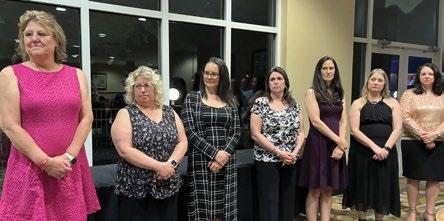
NORTH CAROLINA LAWYERS WEEKLY | May 2023 57 57 MAY 2023 CAROLINA PARALEGAL NEWS
Eason
Eason
Q&A:
S ee BRIEFS Page 58
n Continued from Page 54
vice Center has done no advertising, but the word has spread, said LyJordan.
“ e Center’s location within the sight of everyone entering the courthouse through the main entrance helps,” she said. “ e Clerk of Court’s o ce also makes referrals, but the largest spread of information has come when people we have helped tell their friends about us, and that’s the
best kind of advertising.”
e Center’s creation and funding came largely through the Administrative O ce of the Courts from interest earned on pooled trust accounts IOLTA. e Wake County Commissioners provided funding and support, along with the City of Raleigh. e Center also received some grant funding.
Dunston is working to ensure the Legal Ser-





CAROLINA PARALEGAL NEWS BRIEFS

n Continued from Page 57
n LSPSC elects officers at annual conference
e Legal Sta Professionals of South Carolina held its 58th Meeting and Educational Conference at the Holiday Inn and Suites in Beaufort, S.C. Participants celebrated food, fun and friendship, while support professionals also earned CLE hours, elected new o cers, and presented awards.
LSPSC, a NALS statewide chapter, is on a
growth spurt, with 99 members.
New o cers: Traci B. Wolfe, president; Meredith Lazarski, president-elect; Cassandra Furtick, functional director of membership and marketing; Ann Marie Minerva, functional director of certi cation and education; Stephanie A. Jones, secretary; Tara Jean Brown, treasurer and Katherine R. Helms, immediate past president.
Traci B. Wolfe, newly elected LSPSC president, received the chapter’s Award of Excellence for outstanding service from immediate past
vices Center has a bright future and has her sights set on possible expansion. She acknowledges that ongoing nancing will always be a challenge, but she continues to stay positive and motivated, always seeking new ways to help those who need it the most.
“An educated community is an empowered community,” she said. “And if we want to see change, we have to be the change.”
president Katherine R. Helms.
Angel S. Jackson, a junior majoring in criminal justice at South Carolina State University received the LSPSC’s annual Norma F. George scholarship, valued at $1,000.
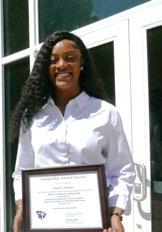
58 May 2023 | NORTH CAROLINA LAWYERS WEEKLY
58 MAY 2023 CAROLINA PARALEGAL NEWS
Jackson
visit www.NADN.org/directory Fast Track Scheduling
the Carolina’s Top Litigator-Rated Mediators & Arbitrators Over 20,000 mediations scheduled online by more than 1800 legal staff since 2018
www.SCMediators.org
This online calendaring service is entirely free, funded by members of the Academy in North and South Carolina. To view the National Academy’s free database of over 1000 top litigator-rated mediators & arbitrators, simply
with
www.NCMediators.org
At Liberty University School of Law, we provide unparalleled skills training to produce practice-ready graduates who will become lawyers of distinction. We promote a culture that cultivates both integrity and high ethical standards to ensure our graduates are ready to lead in their communities.
At Liberty University School of Law, we provide unparalleled skills training to produce practice-ready graduates who will become lawyers of distinction. We promote a culture that cultivates both integrity and high ethical standards to ensure our graduates are ready to lead in their communities.
At Liberty University School of Law, we provide unparalleled skills training to produce practice-ready graduates who will become lawyers of distinction. We promote a culture that cultivates both integrity and high ethical standards to ensure our graduates are ready to lead in their communities.
At Liberty University School of Law, we provide unparalleled skills training to produce practice-ready graduates who will become lawyers of distinction. We promote a culture that cultivates both integrity and high ethical standards to ensure our graduates are ready to lead in their communities.
At Liberty University School of Law, we provide unparalleled skills training to produce practice-ready graduates who will become lawyers of distinction. We promote a culture that cultivates both integrity and high ethical standards to ensure our graduates are ready to lead in their communities.
Three consecutive years of high bar passage rate for first-time takers:
At Liberty University School of Law, we provide unparalleled skills training to produce practice-ready graduates who will become lawyers of distinction. We promote a culture that cultivates both integrity and high ethical standards to ensure our graduates are ready to lead in their communities.
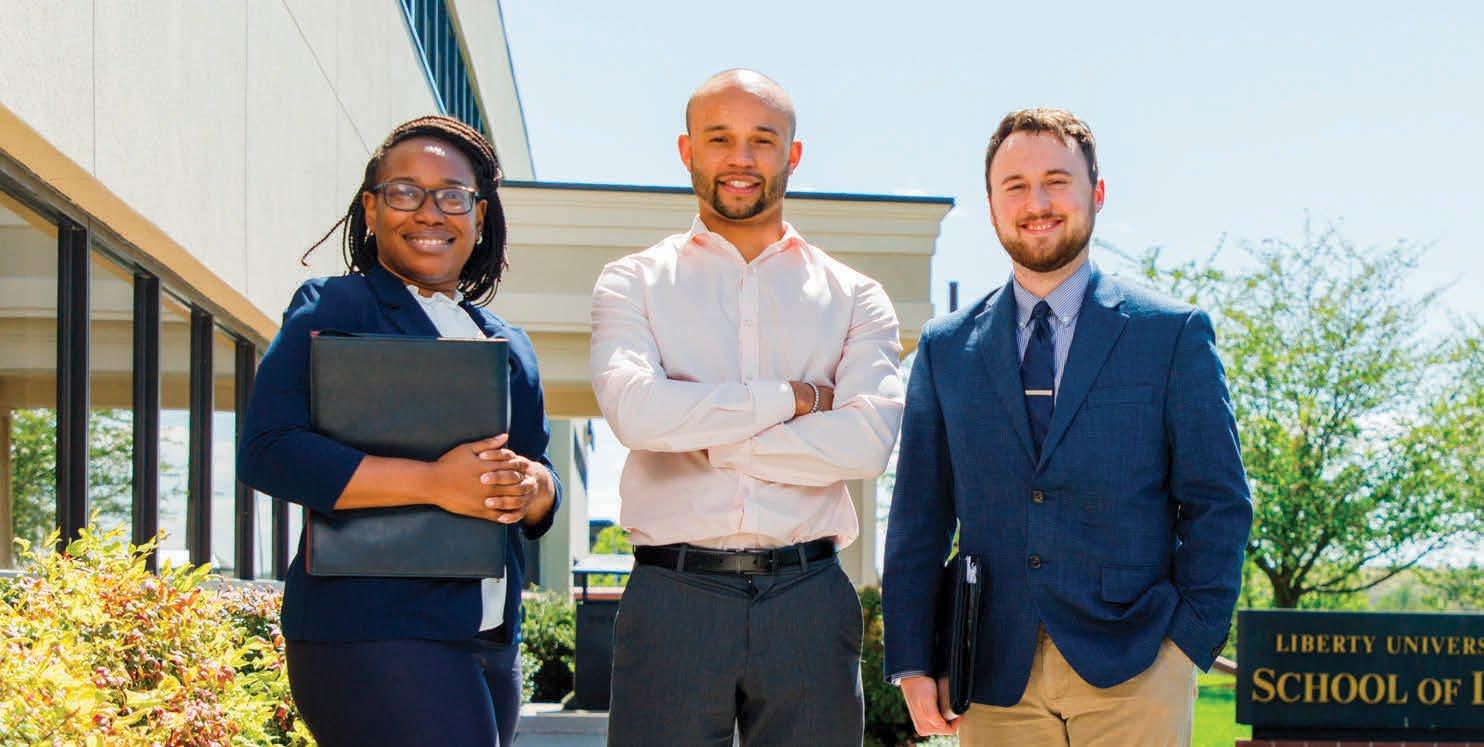
Three consecutive years of high bar passage rate for first-time takers:
Three consecutive years of high bar passage rate for first-time takers:
Three consecutive years of high bar passage rate for first-time takers: 95% (2018)
( July-Oct. 2020)
Three consecutive years of high bar passage rate for first-time takers:
2020)
Three consecutive years of high bar passage rate for first-time takers: 95% (2018) 92% ( July-Oct. 2020) 92% (2019)
2020)
592-6068
� LawCareer@liberty.edu
� (434) 592-6068
� Liberty.edu/Law
/LibertyUniversityLaw
92% (2019) INSPIRE THE PROFESSION. INNOVATE THE PRACTICE. IMPACT THE WORLD.
95% (2018) 92%
92% (2019) � LawCareer@liberty.edu � (434)
� Liberty.edu/Law /LibertyUniversityLaw
( July-Oct. 2020)
95% (2018)
92% (2019) IMPACT THE WORLD. �
/LibertyUniversityLaw
92%
LawCareer@liberty.edu � (434) 592-6068 � Liberty.edu/Law
IMPACT THE WORLD.
92% ( July-Oct.
92% (2019) INNOVATE THE PRACTICE. IMPACT THE WORLD. � LawCareer@liberty.edu � (434) 592-6068 � Liberty.edu/Law
95% (2018) 92% ( July-Oct.
92% (2019) INSPIRE THE PROFESSION. INNOVATE THE PRACTICE. IMPACT THE WORLD.
95% (2018) 92% ( July-Oct.
2020)
NORTH CAROLINA CHAPTER

L. Bell Jr.
T. Boyette
R. Clare
M. Clare
James L. Conner II
Kate Deiter-Maradei
Erin D. Eveson
Paul T. Flick
Patricia L. Holland
Joseph T. Howell
J. Anderson Little
Terry M. Kilbride
Michael E. McDaniel
Robert A. Meynardie
Karen Britt Peeler
James S. Schenck IV
Reagan H. Weaver
Barbara B. Weyher
Scott M. Taylor
Marshall A. Gallop Jr.
Ralph W. Meekins
S. Kent Smith
W. Lewis Sauls
Sherman Lee Criner
William A. Blancato
Colleen Byers
Kenneth P. Carlson Jr.
Anderson Cromer
William H. Freeman Ellen R. Gelbin
NAME Hon. Sharon Barrett Sarah V. Corley Michael W. Drye Anne Duvoisin Jennifer S. Brearley Frank Laney LeAnn Nease Brown Melinda M. Evans Steve Dunn Wayne P. Huckel Jason B. James Raymond E. Owens Jr. Robert A. Beason Donald H. Beskind Joseph Chambliss Dailey J. Derr Rene Stemple Trehy Henry W. Gorham T. Alan Pittman Richard D. Conner Thomas C. Duncan William A. Eagles Lynn G. Gullick Jonathan R Harkavy Harper Heckman Robert A. Brinson Michael A. Swann Scott C. Hart Ken McCotter Jr. M. Ann Anderson Virginia G. Adams BASED IN Asheville Asheville Asheville Blowing Rock Cary Cary Chapel Hill Chapel Hill Charlotte Charlotte Charlotte Charlotte Durham Durham Durham Durham Durham Emerald Isle Fayetteville Greensboro Greensboro Greensboro Greensboro Greensboro GreensboroHigh Point Lexington New Bern New Bern Pilot Mtn. Raleigh PHONE (828) 768-5124 (828) 232-2800 (828) 298-1484 (828) 295-7469 (704) 533-5025 (919) 818-8029 (919) 968-1111 (919) 593-5167 (888) 305-3553 (704) 333-0073 (704) 227-0124 (704) 295-4509 (919) 419-9979 (919) 613-7085 (919) 414-1808 (919) 419-1265 (866) 517-0145 (919) 805-5003 (910) 486-0992 (336) 691-9222 (336) 274-7243 (336) 433-9980 (336) 686-4336 (336) 370-4200 (336) 387-5181 (336) 889-8733 (336) 249-7777 (252) 633-3131 (252) 635-1005 (336) 368-9621 (919) 838-8873 CALENDAR o o o NAME Collins
Asa
Richard
Barwick
Jacqueline
Thomas
BASED IN Raleigh Raleigh Raleigh Raleigh Raleigh Raleigh Raleigh Raleigh Raleigh Raleigh Raleigh Raleigh Raleigh Raleigh Raleigh Raleigh Raleigh Raleigh Raleigh Res. Triangle Rocky Mount Shelby
Pines Whiteville Wilmington Winston-Salem
Winston-Salem Winston-Salem Winston-Salem PHONE (919) 480-8738 (919) 755-1068 (919) 863-8729 (919) 755-9979 (919) 805 5007 (919) 313-4571 (919) 400-4087 (919) 412-2741 (919) 809-7346 (984) 232-8014 (919) 365-6000 (919) 967-6611 (919) 781-4225 (919) 610-7043 (919) 747-7373 (919) 272-7413 (919) 789-9242 (919) 828-0363 (919) 835-0900 (919) 949-4227 (252) 937-2200 (704) 487-1234 (910) 693-3411 (910) 642-6559 (910) 251-0004 (336) 793-4238 (336) 499-1977 (336) 721-6843 (336) 403-8911 (336) 722-8872 (336) 945-0214 CALENDAR o o o o Visit the Academy’s free roster of over 1000 of the nation’s top litigator-rated neutrals at www.NADN.org Visited by over 1200 unique legal staff monthly, NCMediators.org assisted firms in the scheduling of over 4000 mediations in 2022, for free. Available Dates Calendars Online for the State’s Most Experienced Neutrals
Southern
Winston-Salem Winston-Salem

































































































 KEITH BURNS Managing Partner, Nexsen Pruet Raleigh
KEITH BURNS Managing Partner, Nexsen Pruet Raleigh

























































































